The 2016 Rio Olympics have come to a close with Americans earning 121 medals -- 46 gold, 37 silver and 38 bronze -- their biggest haul ever, not counting the boycotted 1984 Los Angeles Games or the 1904 St. Louis Games, when hardly anyone else showed up.
- Share via
Two Guinea athletes do not return home after Rio Olympics
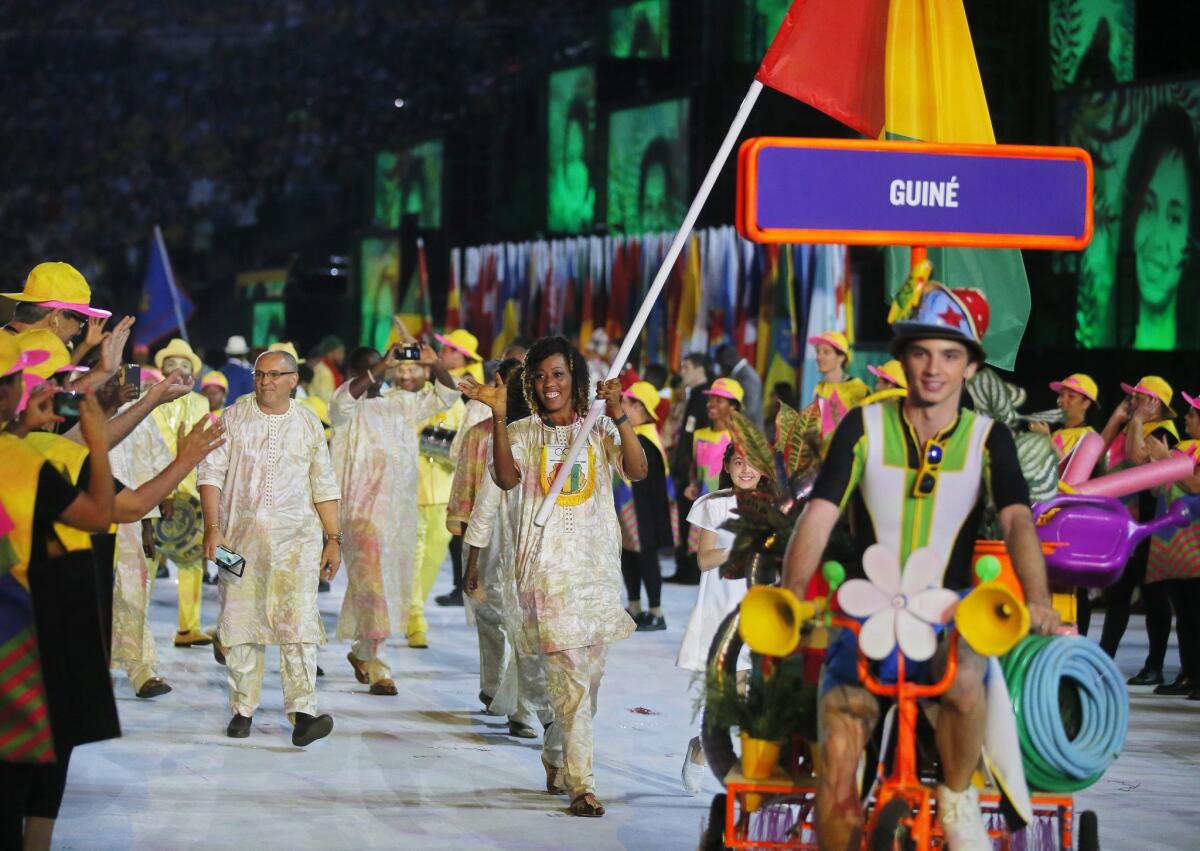
The head of Guinea’s Olympic delegation says two athletes did not return to the West African nation after competing at the Rio Olympics.
Atef Chaloub said Saturday that swimmer Amadou Camara disappeared 48 hours before the team’s scheduled departure. He said Mamadama Bangoura, who competed in judo, also did not return to Guinea, having disappeared after leaving a message saying she wanted to “try her luck” abroad.
A friend of Bangoura’s, who spoke on condition of anonymity to avoid punishment for failing to stop her from fleeing, said Bangoura was ashamed she didn’t earn a medal and wanted to try “working in a developed country.”
More than a dozen African athletes — including some from Guinea — did not return home after the London Olympics in 2012.
- Share via
Rio police’s account of Ryan Lochte incident may not be entirely accurate either, report says
The extent of the property damage Ryan Lochte and three of his fellow U.S. Olympic swimmers caused to a gas station eight days ago might have been exaggerated by Rio de Janeiro police, according to a report by USA Today.
At a news conference Thursday, Fernando Veloso, the head of Rio de Janeiro’s civil police, said the Americans had broken a soap dispenser and mirror inside the restroom. Other reports have said the four also broke a bathroom door.
But one of the U.S. swimmers, Gunnar Bentz, said in a statement Friday that he didn’t see anyone vandalize the bathroom and the only damage caused by the group occurred when Lochte pulled a “loosely attached” advertising sign from a wall.
In examining all available surveillance footage from that night, including one aimed at the restroom doors, USA Today found no evidence the swimmers ever went near the bathroom, after relieving themselves behind the gas station.
A USA Today videographer visited the gas station and found no damage to the soap dispensers, mirrors or door, and none of those items appeared to be new.
The swimmers were eventually held at gunpoint by security guards at the station and were released after paying the equivalent of $50.
Fernando Deluz, a bilingual Brazilian who served as a translator between the swimmers and the security guards, told USA his understanding was the money paid was to cover vandalized property and that the only property that came up during the negotiations was the advertising sign Lochte had pulled down.
Deluz also said that because of the language barrier, the Americans might have believed they were being robbed.
- Share via
NBC’s Olympics coverage was vast, and plenty of it mattered
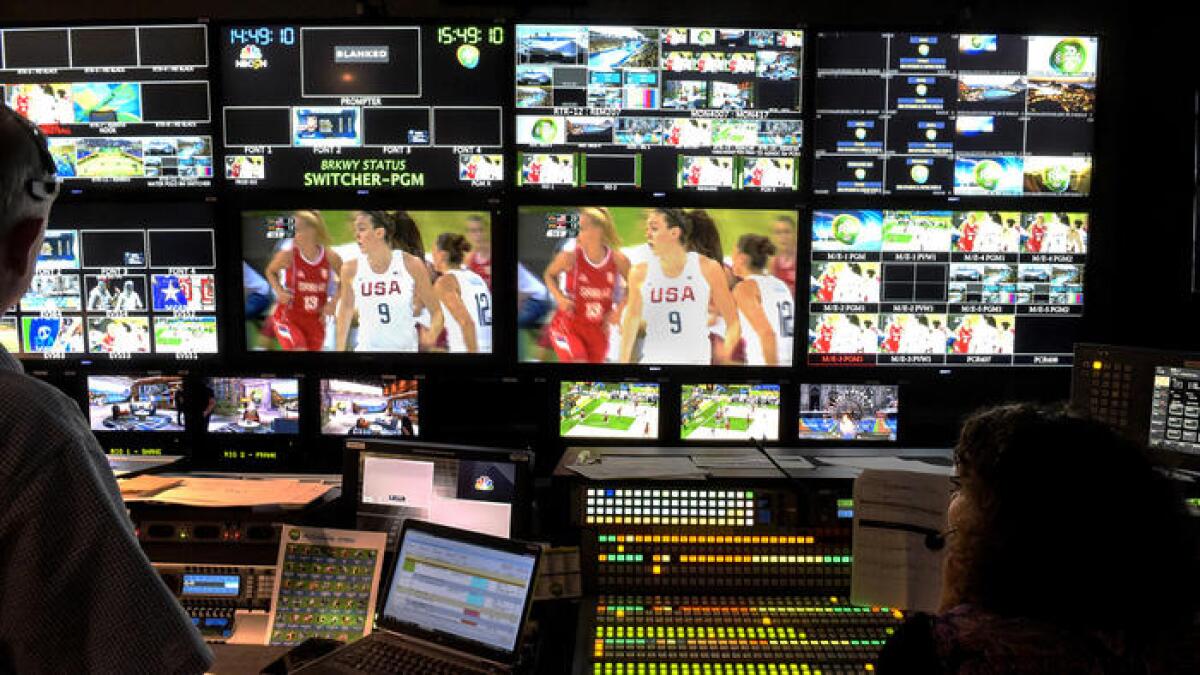
On the first Saturday afternoon of the Olympics, NBC’s images of road cycling were so dazzling that the scenes could have been lifted from a travel promotion ad by the Rio de Janeiro tourist board.
The mostly aerial shots that tracked the bikes along the coastline displayed charmingly winding roads, granite peaks, blue-green ocean waves splashing against rocks and houses (some pink) quaintly clinging to hillsides.
Who among us did not consider firing up our laptops to begin researching our next possible vacation destination?
Of course, the bird’s-eye views neglected to capture Rio’s dark side — the slums and the crime, the shoddy transportation system and the pollution. Had our TV sets contained Smell-O-Vision, we might have whiffed the acrid odor that plagues parts of the host city.
- Share via
Column: Kevin Durant wakes up and carries U.S. to more gold
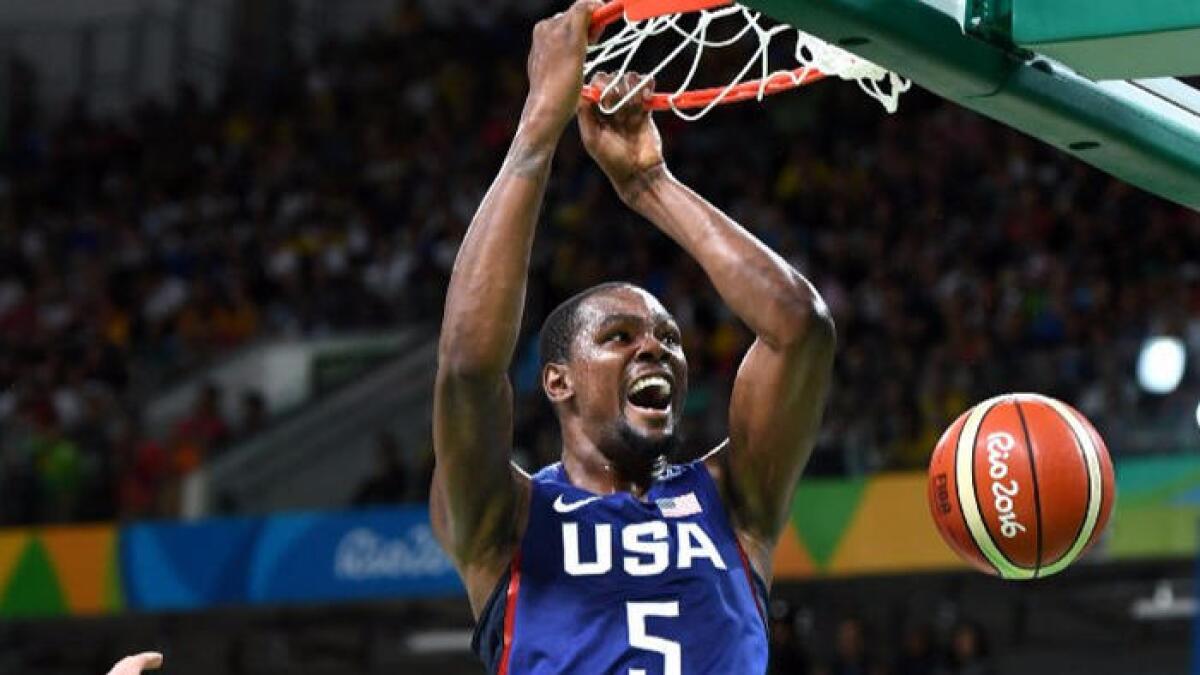
He was branded a traitor, an opportunist, a coward. He was ridiculed in his neighborhood, resented in his workplace, mocked by his former fans.
When Kevin Durant left the Oklahoma City Thunder to join the powerful Golden State Warriors this summer, mere weeks after the Warriors knocked the Thunder out of the playoffs, he was generally described with a single adjective.
Weak.
Nearly two months later and 5,300 miles away, a flag on his chest and a country on his back, Durant changed both the narrative and the adjective Sunday, unleashing a brilliant performance that should provide him with an entirely different shade of moniker.
Gold.
- Share via
These memories of the Rio Olympics are etched in the minds of our reporters
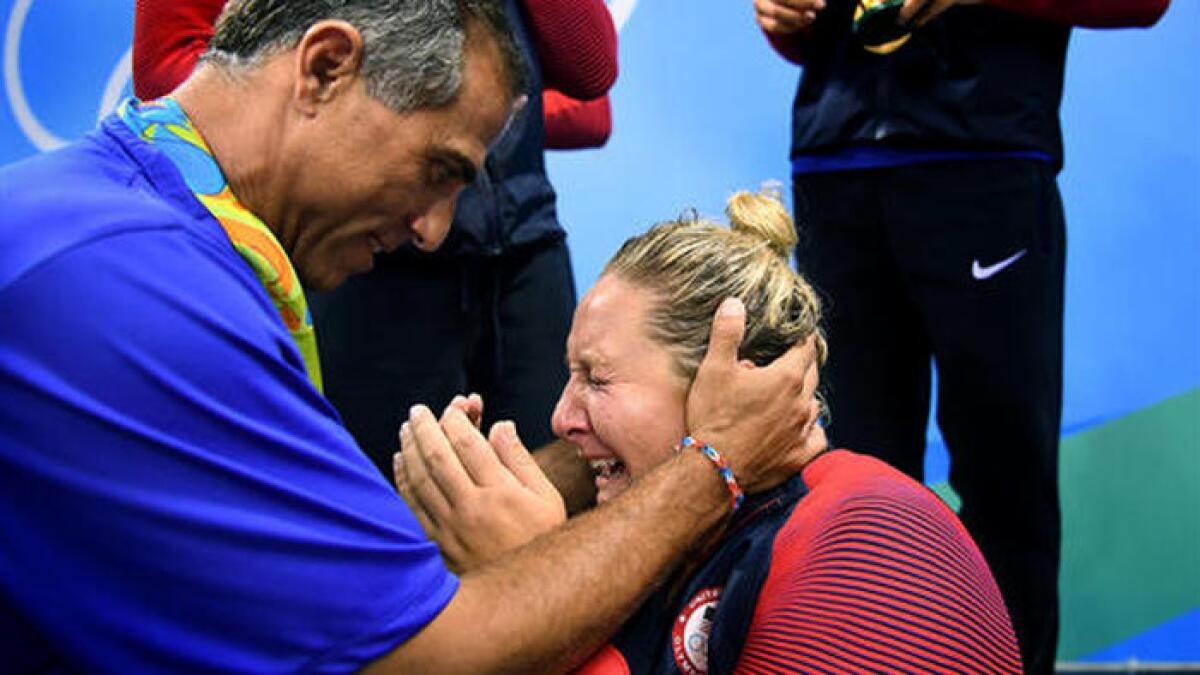
My medal platform of memories is filled by two people and a team that not only successfully defended their titles, but made history doing it.
The bronze goes to judoka Kayla Harrison, who become the first American to win two gold medals in her sport. The silver goes to middleweight boxer Claressa Shields, the first American — male or female — to win two Olympic boxing titles.
And the gold goes to the women’s water polo team, which not only became the first repeat champion in the history of its sport, but did it with a heavy heart after the brother of Coach Adam Krikorian died of a heart attack two days before the Games began.
Despite the grief, Krikorian insisted on coaching in Rio, and after the team beat Italy in the final, his players lined up on the side of the pool and, one by one, draped their goal medals around his neck.
— Kevin Baxter
- Share via
Rio Games: A challenge met, although it wasn’t easy
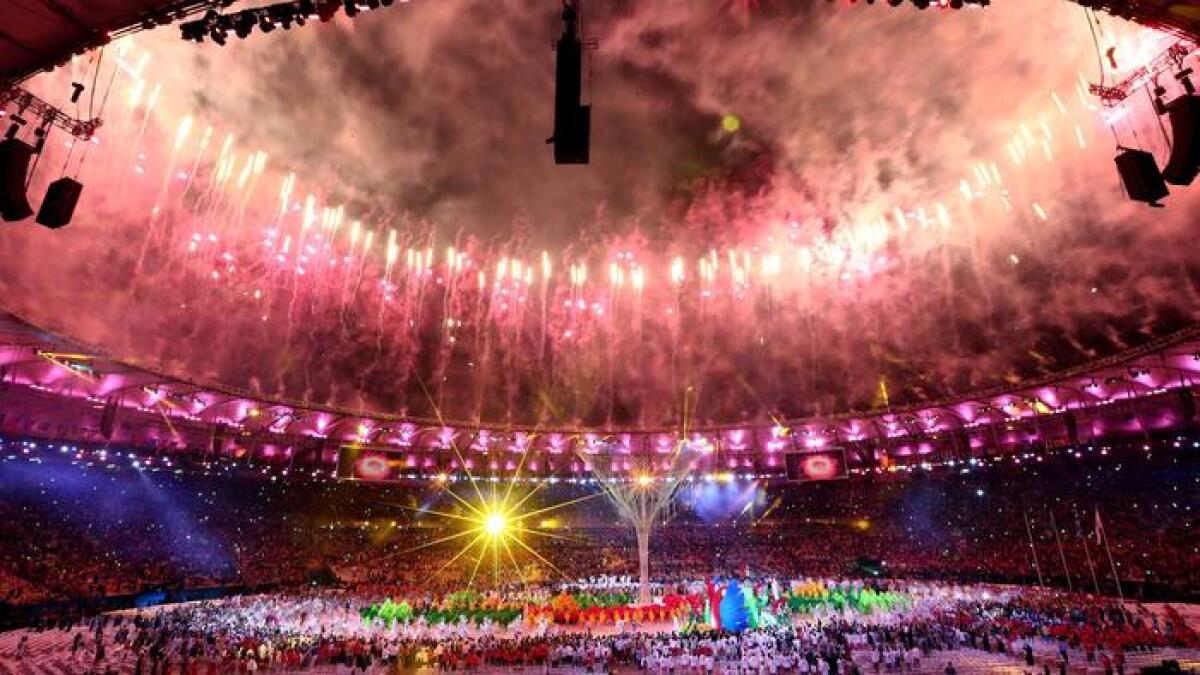
The most difficult Games we have ever encountered.
— John Coates, IOC vice president regarding the Rio Games
Dark clouds hovered over Maracana Stadium at dusk, with a sudden wind tugging at flags and whipping the Olympic flame.
Then a drenching rain began to fall.
The storm that intruded on Sunday night’s closing ceremony at the Summer Olympics befit a mega-sporting event that, over the last few weeks, had blended spectacle with more than a few glitches and negative headlines.
“A Games in the middle of reality,” Thomas Bach, president of the International Olympic Committee, had called them.
There were historic performances by some of the world’s greatest athletes, cheered on -- and sometimes booed -- by crowds exhibiting Brazil’s characteristic exuberance.
There were also reports of street crime, logistical gaffes and venue failures suggesting Brazil was not quite ready for prime time.
It was all part of the IOC’s gamble in coming to South America for the first time. The samba dancers and pop musicians who soldiered through Sunday’s inclement weather, and the fireworks that illuminated the gloomy sky at the end, embodied the host city’s determination.
- Share via
2016 Rio Olympics in Pictures
See the best images from Times photographers Robert Gauthier and Wally Skalij
- Share via
Rio Olympics: Live updates from the closing ceremony
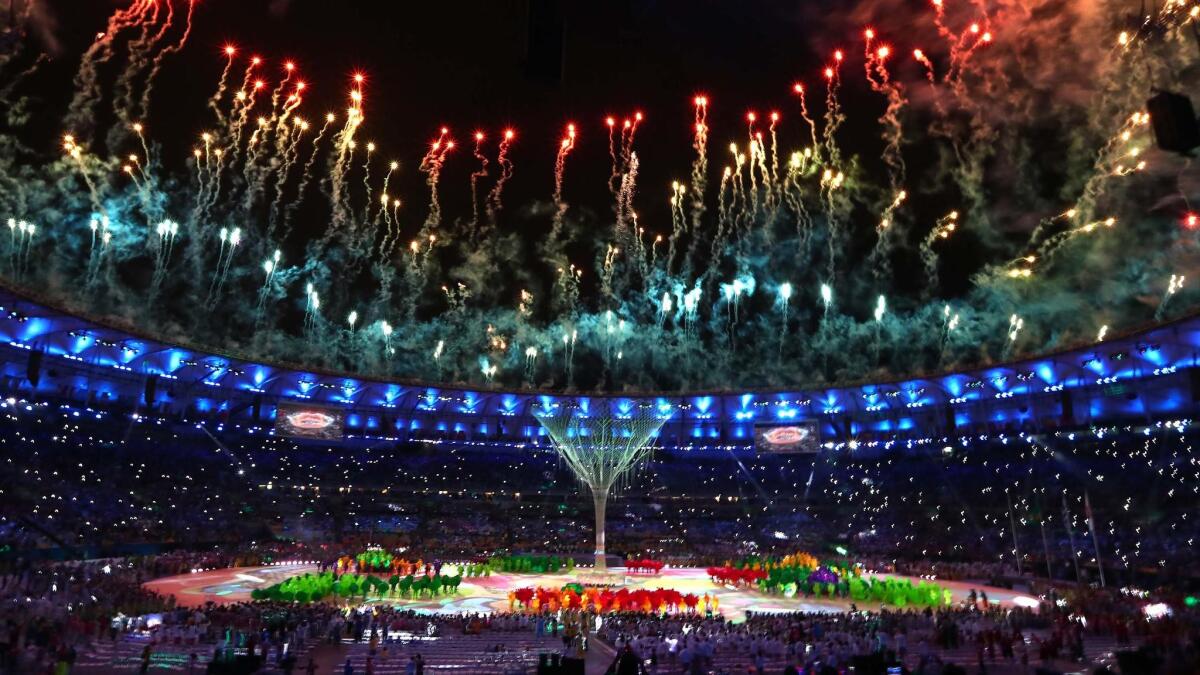
10:45 p.m.: That’s all, folks, at least for the official part of the program. Partying might go deep into the night. Thanks, Rio.
10:40 p.m.: A taste of Carnival, some fireworks, some confetti. Athletes dancing with the performers.Exuberant and vibrant ending.
10:25 p.m.: Olympic flame is extinguished. Now, much dancing and merriment.
10:20 p.m.: IOC President Thomas Bach declares the Rio Games closed, calls upon world’s youth to reassemble in Tokyo in four years.
10:16 p.m.: Bach says Rio Olympics will leave a “unique legacy.” Seems to be the say-nothing equivalent of calling someone is ‘nice.’
10:15 p.m.: International Olympic Committee President Thomas Bach praises unifying effect of athletes living and competing together at the Games. The scene of the two livid Mongolian wrestling coaches stripping in protest of a bronze-medal match result earlier Sunday and being escorted out by police wasn’t quite in line with that lofty ideal.
10 p.m.: Rio 2016 chief Carlos Arthur Nuzman continues the Olympic spin by saying the rain is coming to celebrate. It looks like it’s actually just making everyone cold.
9:55 p.m.: Tokyo offers a teaser about its Olympics. Looks pretty cool, actually.
9:47 p.m.: Rio de Janeiro Mayor Eduardo Paes booed as he’s introduced.
9:45 p.m.: Now for the flag handover ceremony from Rio de Janeiro to Tokyo. Here’s hoping they complete the exchange better than the U.S. men’s 400-meter relay team exchanged the baton.
9:35 p.m.: Coming up soon: a ceremony recognizing the Games’ volunteers -- that workforce was one of the trouble spots for the event in both numbers and training -- then then Olympic flag will be lowered.
9:25 p.m.: Medal ceremony for marathon top three. Way cool.
9:15 p.m.: Now: a tribute to lacemaking. Really. As for the Olympic channel, will it show everything on delay, as NBC did?
9:12 p.m.: Next up: a heart-pounding segment on ... the launch of Olympic channel. At least the athletes have the waves of cold rain to keep them awake.
9:05 p.m.: The athletes have entered. Was wondering if they’d get into the stadium before the next Olympics. Hey, PyeongChang Games are only, what, 18 months away!
8:50 p.m.: Rain really coming down hard. Many athletes wearing ponchos, jackets with hoods.
8:40 p.m.: Inside the Games is reporting that major electrical problems at Maracana Stadium have required the use of generators to keep the show going.
8:35 p.m.: No sign yet of the shirtless Tongan guy from the Opening Ceremony. Did NBC delay his entrance, like it has delayed everything else??
8:30 p.m.: Loads of the big-name U.S. athletes have already departed Rio de Janeiro, including Katie Ledecky, Michael Phelps and, uh, Ryan Lochte. Simone Biles, however, is still here and is the U.S. flag-bearer.
8:25 p.m.: Athletes still parading in. Line looks as long as I’m anticipating the airline check-in line will be tomorrow morning at GIG.
8:20 p.m.: ‘Heroes of the Games’--the athletes--enter the stadium. Colorful display.
8:15 p.m.: The closing ceremony is underway on a rainy night in Rio de Janeiro. Maracana Stadium is about two-thirds full, continuing the Games-long problem with empty seats.
The 2016 Summer Olympics come to an today, with the closing ceremony scheduled to start at 4 p.m. Pacific time at Maracana Stadium.
You will not be able to watch it on TV, however, until 7 p.m. on NBC, with coverage scheduled to end at 9:30. So, some things could be edited out for time.
As usual, the closing ceremony will end with the official handover of the Olympic flag to Yuriko Koike, governor of Tokyo, host of the 2020 Games, and the extinguishing of the Olympic flame.
And, no, Ryan Lochte is not expected to be there.
- Share via
Closing ceremony live: Lace and clay? Sounds like a Batman villain
- Share via
Closing ceremony live: Anyone need a fill-up?
- Share via
Kevin Durant leads U.S. to runaway victory over Serbia for men’s basketball gold
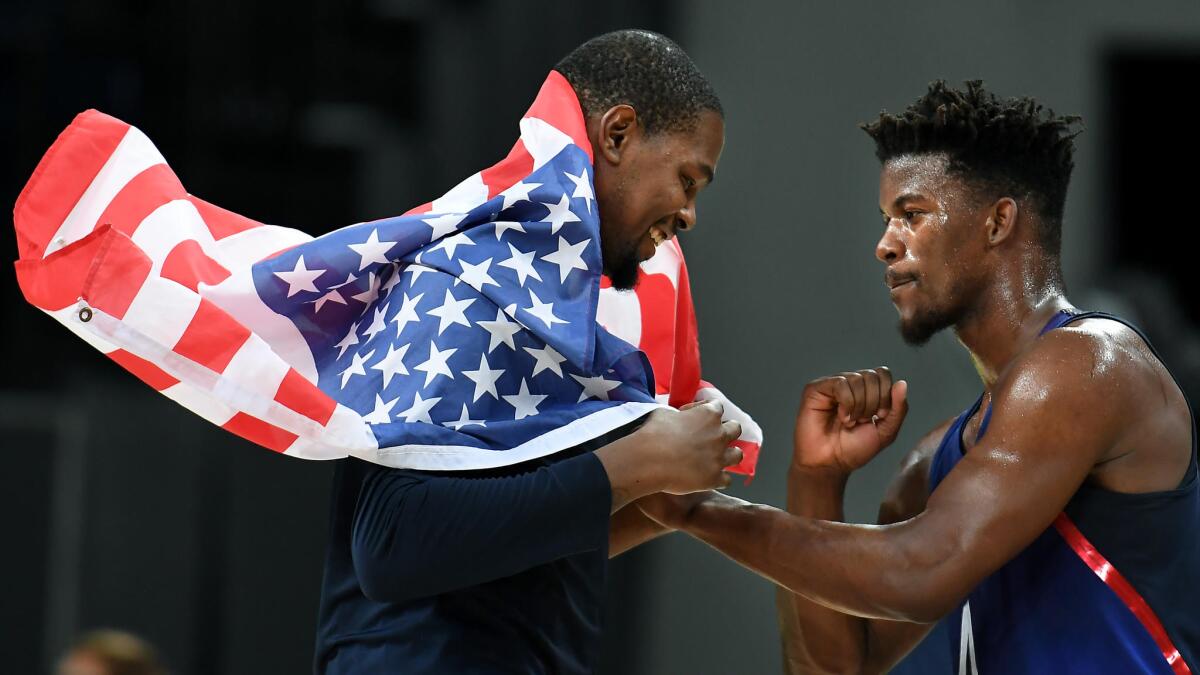
After Kevin Durant made a three-pointer early in the second quarter, he walked back down the court while pounding his fist on his chest and yelling at his teammates on the bench.
Turns out he was just clearing his throat.
It was Durant’s monster second quarter that ended any notion of an upset and put the U.S. on the gold-medal stand for the third consecutive Olympics with a 96-66 victory over Serbia, which surprised in these Olympics by taking the silver.
Durant had 30 points for the game, 18 of those in the second quarter, when he made Carioca Arena I marvel at both his shooting and athleticism and turned an unwatchable game into can’t-miss television before it eventually became a laugher.
Durant won his second gold medal. Veteran forward Carmelo Anthony and Mike Krzyzewski, coaching his last Olympics for Team USA before ceding to Spurs Coach Gregg Popovich, each picked up their third.
The U.S. had a rocky start to the game in the first quarter when Serbia mucked up the proceedings by fouling the Americans in transition and keeping them from developing an offensive rhythm.
The U.S. led 19-15 at the end of the first following a late three-pointer from Durant, who was beginning to catch fire. This team was often criticized for its lack of ball movement and a propensity for too much one-on-one basketball on offense. The thing is, when one of those players is feeling it as Durant was Sunday, even that brand of basketball looks effective.
The U.S. continued to pour it on in the second half, making it a smooth gold-medal game after an Olympics filled with bumps in the road. There were close victories against Serbia, France and Australia in pool play, but this team, though not as dominant over the tournament as some of its predecessors, avoided the embarrassment of coming home with anything less than gold.
- Share via
Kyle Snyder becomes youngest American wrestler to win gold
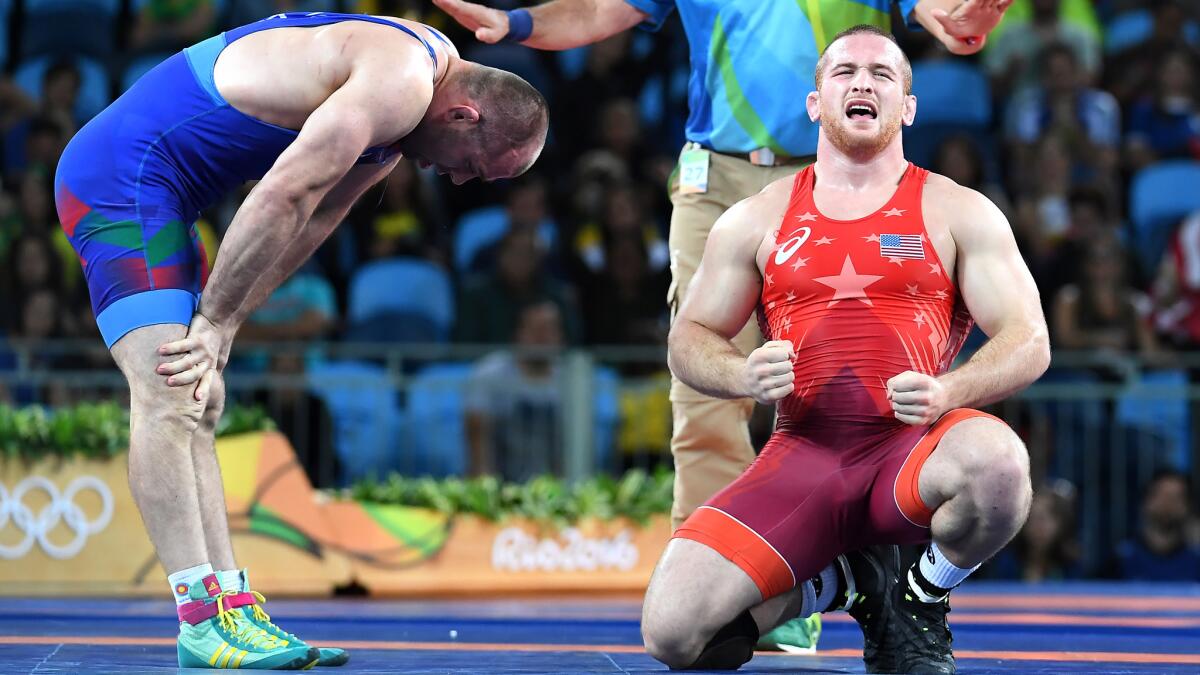
American wrestler Kyle Snyder won gold on Sunday, becoming the youngest Olympic wrestling champion in U.S. history.
The 20-year-old Snyder beat Khetag Goziumov of Azerbaijan, 2-1, for gold at 97 kilograms during the men’s freestyle tournament on Sunday.
Snyder is the second consecutive American wrestler to win Olympic gold in this weight class. Jake Varner, who Snyder beat at the U.S. Olympic team trials in April, won in London four years ago.
- Share via
Sunday’s Rio Olympics schedule and results
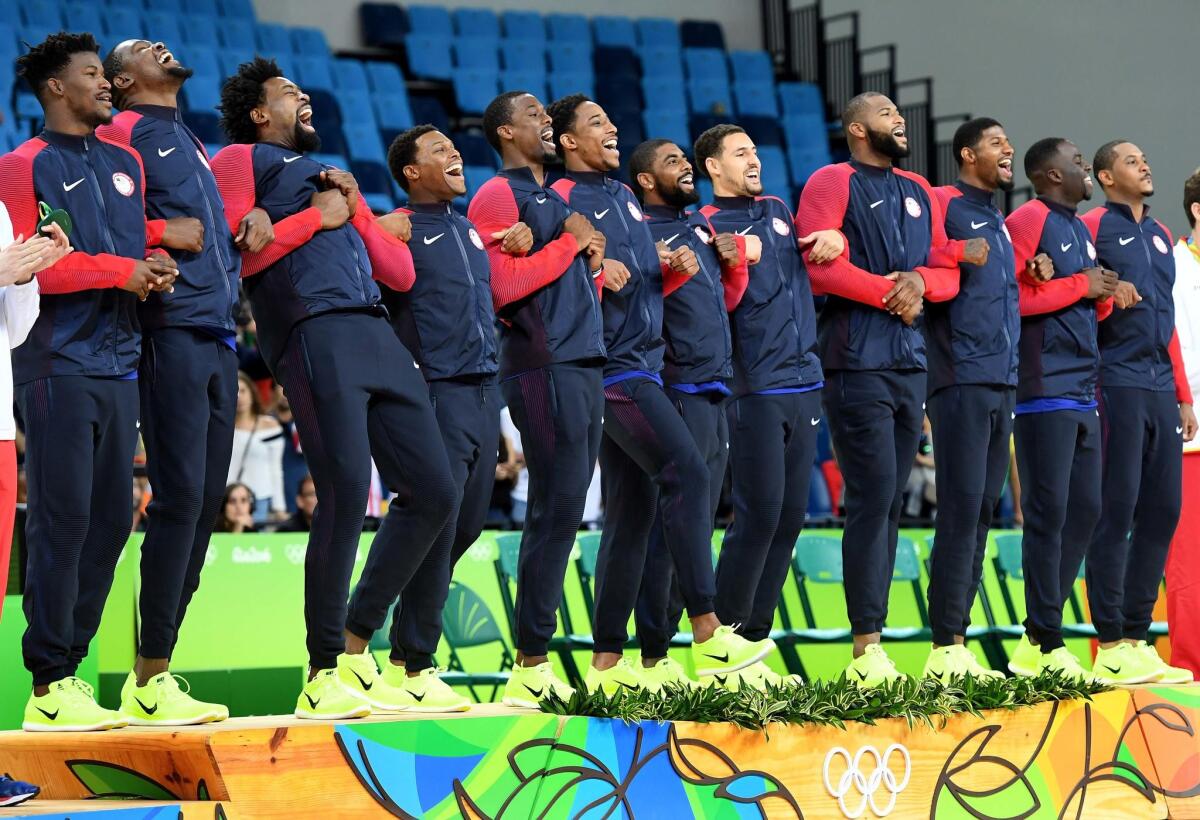
Schedule and results from Sunday’s Rio Olympics competition. All times Pacific.
Basketball (Men)
Gold medal game
United States 96, Serbia 66
Bronze medal game
Spain 89, Australia 88
Boxing
Women’s middleweight gold medal bout
Claressa Shields, United States, d. Nouchka Fontijn, Netherlands, 3-0
Men’s flyweight gold medal bout
Shakhobidin Zoirov, Uzbekistan, d. Mikhail Aloyan, Russia, 3-0
Men’s light-welterweight gold medal match
Tony Victor James Yoka, France, d. Joe Joyce, Britain, 2-1
Men’s super-heavyweight gold medal match
Tony Victor James Yoka, France, d. Joe Joyce, Britain, 2-1
Cycling
Men’s cross-country mountain bike final
Gold--Nino Schurter, Switzerland, 1:33:28
Silver--Jaroslav Kulhavý, Czech Republic, 1:34:18
Bronze--Carlos Coloma Nicolas, Spain, 1:34:51
Handball (Men)
Gold medal match
Denmark 28, France 26
Bronze medal match
Germany 31, Poland 25
Rhythmic Gymnastics
Group final
Gold--Russia, 36.233 points
Silver--Spain, 35.766
Bronze--Bulgaria, 35.766
Track and Field
Men’s marathon
Gold--Eliud Kipchoge, Kenya, 2:08:44
Silver--Feyisa Lilesa, Ethiopia, 2:09:54
Bronze--Galen Rupp, United States, 2:10:05
Volleyball (Men)
Gold medal match
Brazil 3, Italy 0 (25-22, 28-26, 26-24)
Bronze medal match
United States 3, Russia 2 (23-25, 21-25, 25-19, 25-19, 15-13)
Wrestling
Men’s freestyle 65 kilograms gold medal match
Soslan Ramonov, Russia, d. Toghrul Asgarov, Azerbaijan, 4-0
Men’s freestyle 97 kilograms gold medal match
- Share via
Rio Olympics: Mongolian wrestling coaches strip in protest of loss
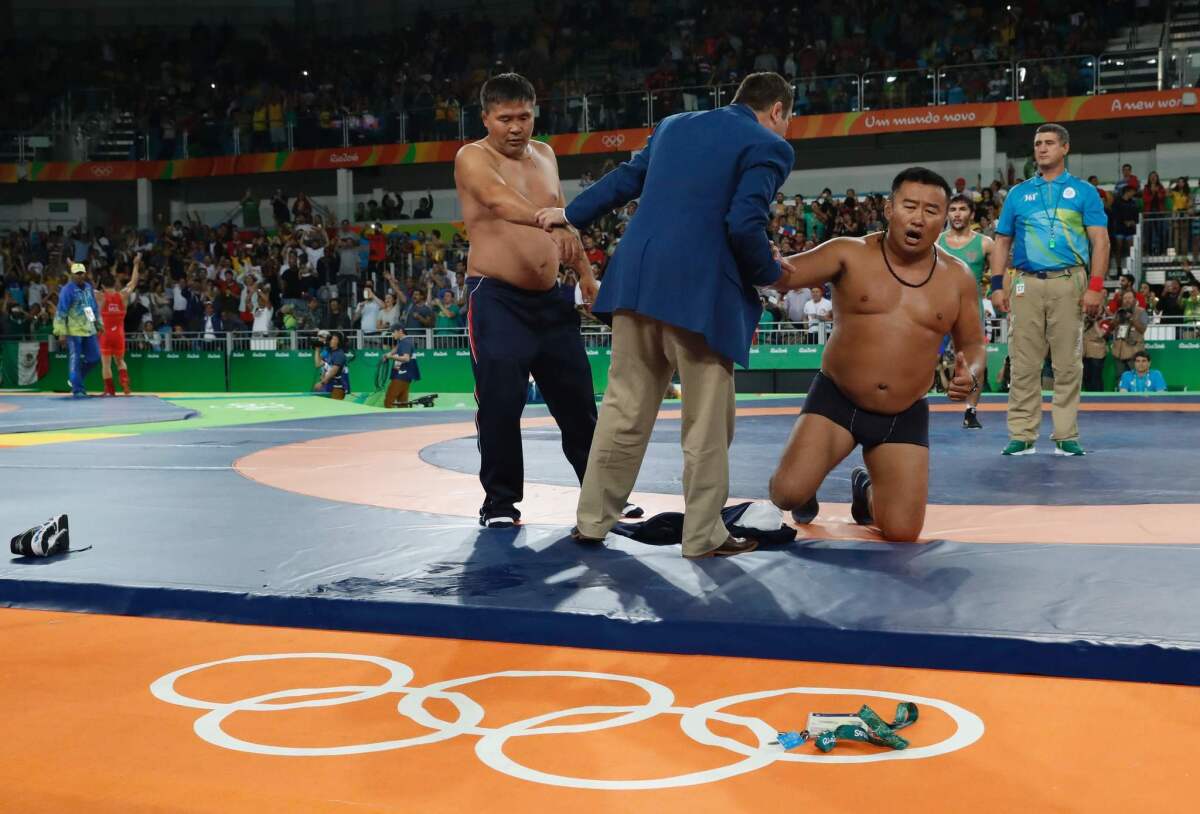
Two Mongolian wrestling coaches stripped in protest Sunday after their wrestler lost the bronze medal match.
The coaches had rushed to the mat in celebration minutes earlier at Carioca Arena, believing Ganzorigiin Mandakhnaran had defeated Uzbekistan’s Ikhtiyor Navruzov in the 143-pound (65 kg) class. One coach fell to his knees in the center of the mat and appeared to be sobbing.
But the judges awarded the Uzbekistan wrestler a penalty point — and the victory.
The sudden turn of events enraged the Mongolian coaches. One removed his shirt in front of the judges’ table and flexed. The other took off his shirt and pants, wearing only a pair of underwear.
“This was a protest,” one of the coaches, Byambarenchin Bayaraa, said. “There was a problem with the refereeing.
“Three million people in Mongolian waited for this bronze medal and now we have no medal ... 100% of the stadium supported us.”
The coaches piled their clothes on the table. The crowd, meanwhile, roared approval and chanted “Mon-gol-ia! Mon-gol-ia!”
Officials pushed both men off the mat after the display. They eventually put on their clothes before members of Brazil’s National Public Security Force escorted them from the venue as the crowd serenaded them with cheers.
Mandakhnaran, the Mongolian wrestler, remained fully clothed during the incident.
- Share via
Silver medalist Feyisa Lilesa shows solidarity with protesters in Ethiopia
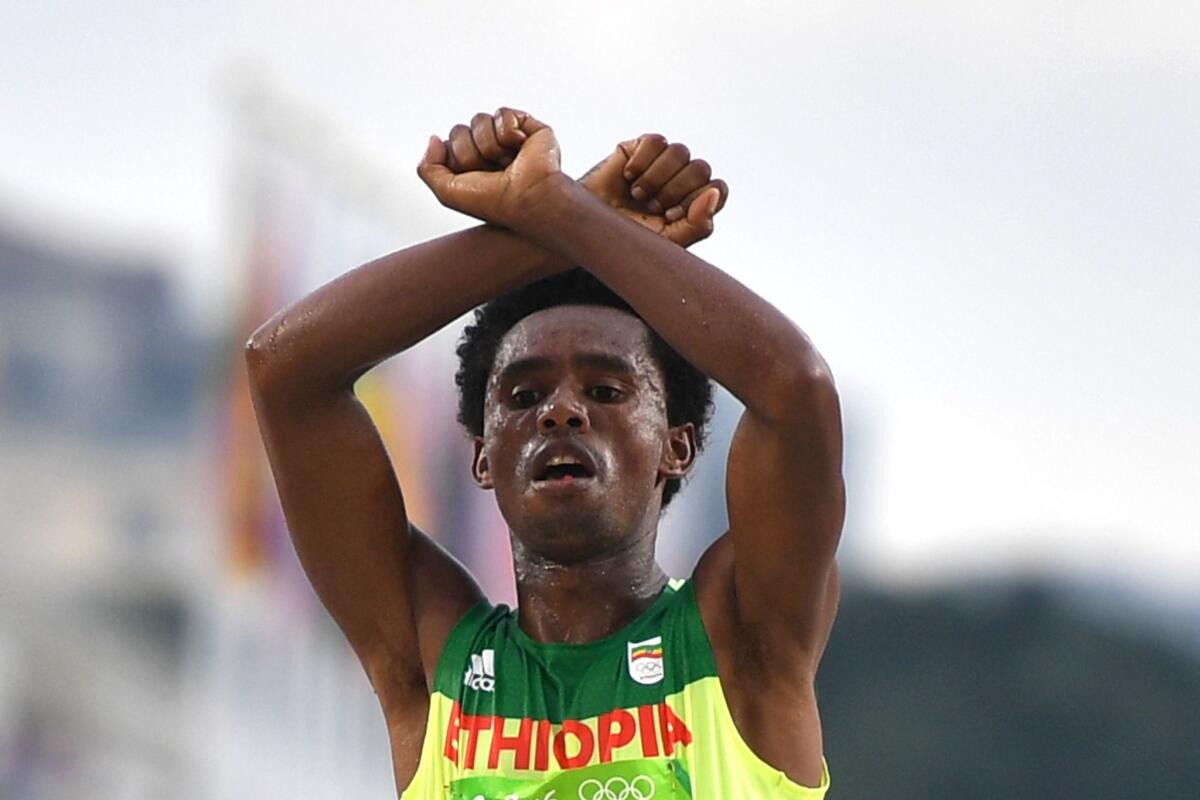
Feyisa Lilesa of Ethiopia was nearing the finish line at the men’s marathon on Sunday morning when he crossed his wrists above his head.
The silver medalist did it again. And once more at the end of an extraordinary news conference -- standing alone and posing for photographers -- in which he explained his show of solidarity with protesters in his homeland, Ethiopia.
He explained that the gesture was in protest of the killing of the Oromo people, saying he stands with the resistance movement, adding that the government was “killing our people.”
Lilesa was asked about the consequences of his protest. He said maybe “they kill me…if not they kill me, they put me in prison.”
Later, it was mentioned that the International Olympic Committee frowned upon political protests/gestures at the Games.
Said Lilesa: “They can’t do anything. It’s my feeling.”
- Share via
Rio Olympics: Claressa Shields makes history with her second boxing gold
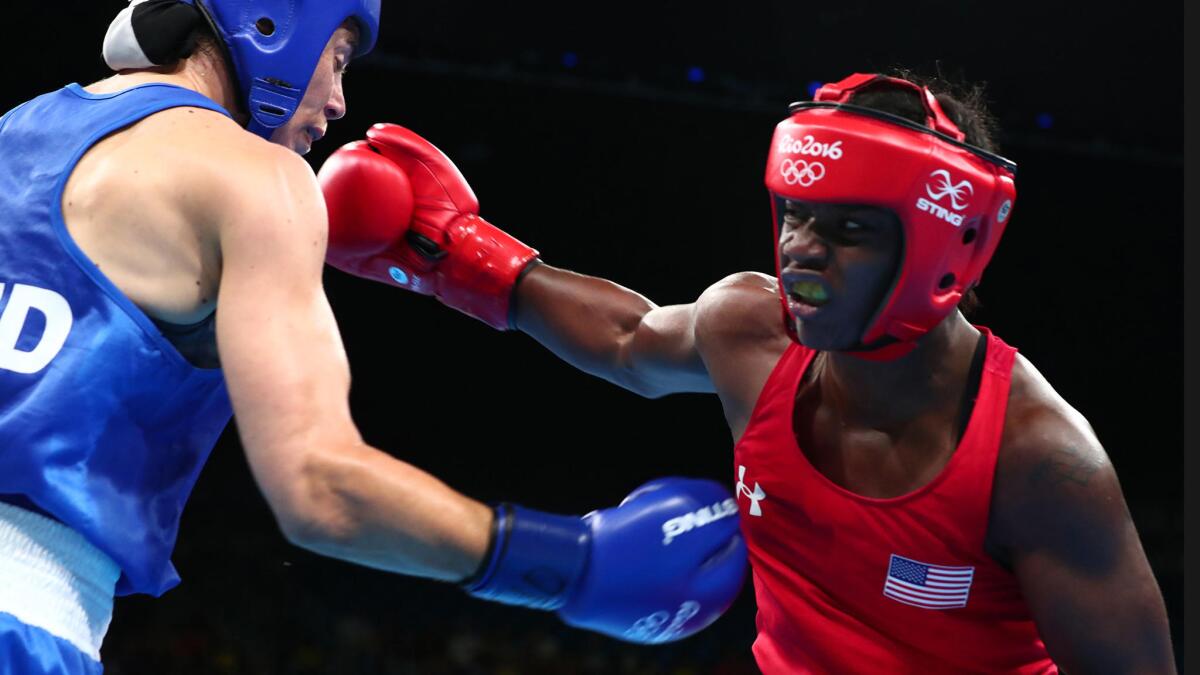
Claressa Shields became the first American boxer to earn two Olympic titles Sunday when she won a unanimous-decision victory over Nouchka Fontijn of the Netherlands in the women’s middleweight final.
Shields dominated the Rio tournament, winning all 12 of her fights. And she may have been at her best in the gold-medal match. After a slow start, she took control of the fight early in the second round, staggering Fontijn with a strong right to the head.
She continued stalking the Dutch fighter in the third round, connecting twice with left jabs and landing another hard right. And rather than protect her big lead in the fourth round, she repeatedly waved her arms, begging Fontijn to come forward and fight.
Fontijn,who lost to Shields in the final of the world championship in May, was cheered Sunday by a huge contingent of orange-clad Dutch athletes and coaches. And she was game, landing a a couple of good punches in the opening two minutes.
The victory ran Shields’ record to 77-1, with her only loss coming before the London Games four years ago. It also closed a successful tournament for the U.S., which got a silver-medal performance from bantamweight Shakur Stevenson and a bronze-medal effort from light-flyweight Nico Hernandez.
The three medals are the most for a U.S. boxing team in the Olympics since 2000, when the Americans won four.
- Share via
Rio Olympics: Eliud Kipchoge of Kenya wins men’s marathon; Galen Rupp of the U.S. takes bronze
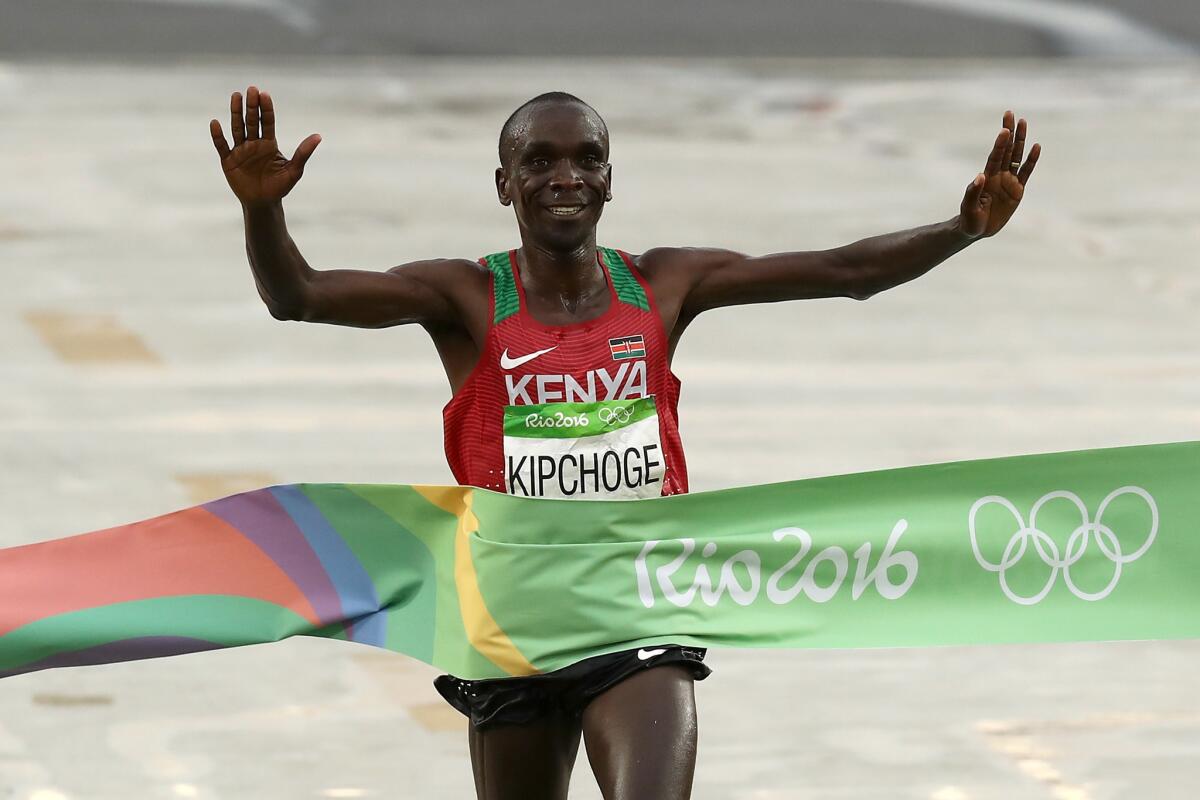
Eliud Kipchoge of Kenya continued his nearly flawless marathon career, winning the Olympic men’s marathon on Sunday in 2 hours 8 minutes 44 seconds.
Second was Feyisa Lilesa of Ethiopia and Galen Rupp of the United States took the bronze. Rupp’s 2:10:05 was a personal best. American Jared Ward was sixth, in 2:11:30, also a personal best. Meb Keflezighi of the U.S. was 33rd in 2:16:46.
Rupp was 11 seconds out of second place.
Kipchoge and Lilesa dropped Rupp at the 35-kilometer mark and then Kipchoge put on a patented surge himself and won by a margin of 1 minute 10 seconds.
Heading into Rio, the 31-year-old Kipchoge had lost just once in seven career marathons, at Berlin in 2013. Only three years ago, he moved up to the marathon distance.
- Share via
Column: Being the best is never boring
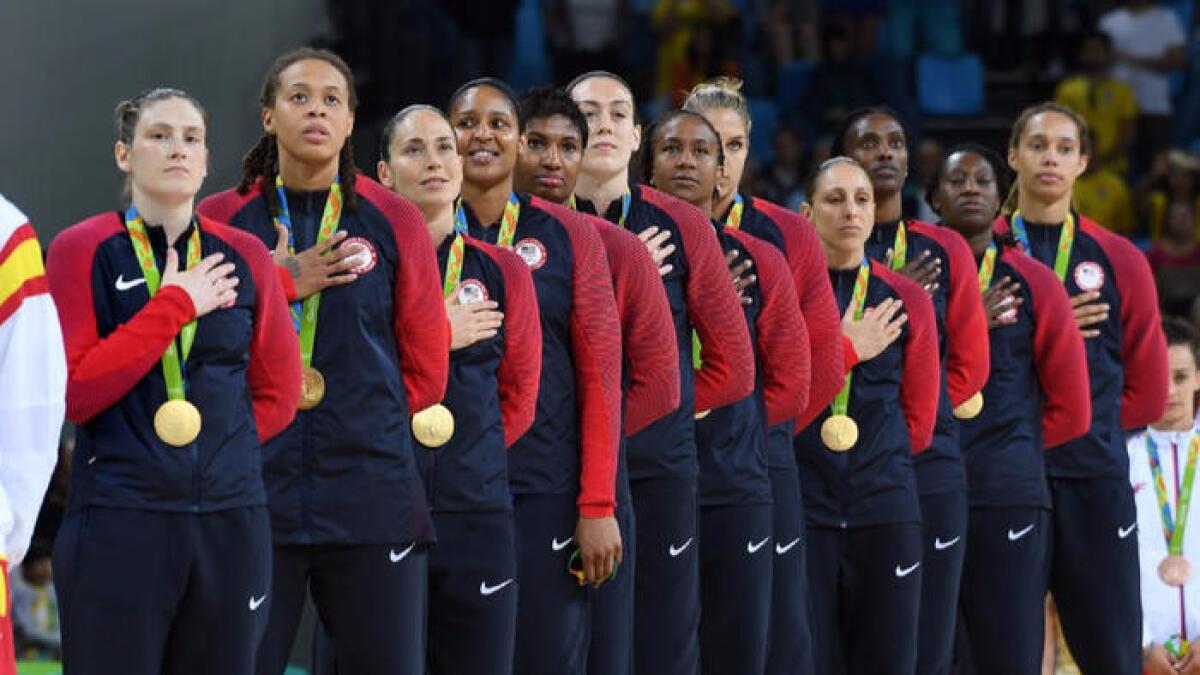
We could have just won by 10 or eight, but this team is different, this team had a mind-set I’ve never seen before.
— Diana Taurasi
Boring? Since when is nearly two hours of pure athletic destruction boring?
Bad for basketball? How can 20 years’ worth of consecutive victories on the world’s biggest stage be bad for basketball?
One of the most consistently dominant teams in the annals of the Olympics stepped on a Rio basketball court Saturday in front of empty seats, feigned yawns and misguided perceptions.
They turned them all into gold, untainted and unselfish gold, poured from the greatest of American sports legacies, decorated across the chests of the greatest American team athletes.
- Share via
These two are trying to help seal the LA 2024 deal
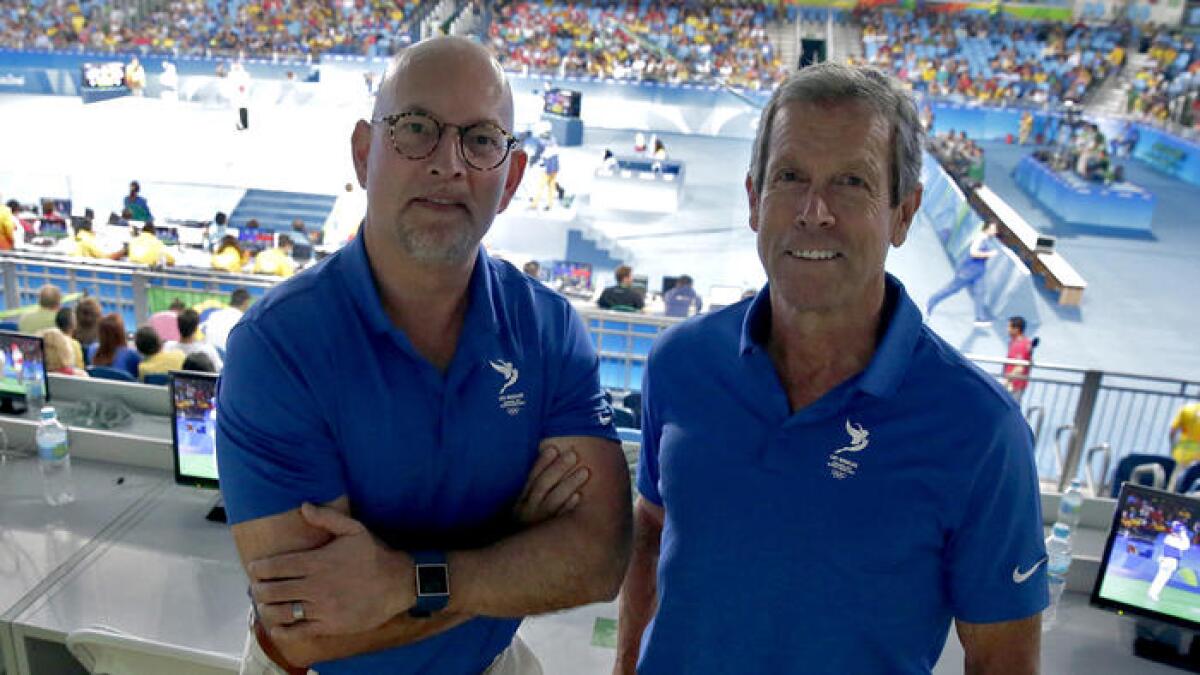
Olympic Stadium comes alive at dusk with fans arriving for the late session, lots of chatter and laughter, everyone eager to watch Usain Bolt in a 200-meter semifinal.
Beneath the stands, in a dank concourse, Doug Arnot and Bill Hanway emerge from a meeting that ran longer than expected. It has been another tough day and they look a bit haggard in their matching purple shirts.
“This is not glamorous,” Arnot says.
Because we don’t have a lot to build, we can spend time on all the details that matter.
— Doug Arnot, consultant to LA 2024 Olympic bid
They are in Rio as paid consultants to help pitch Los Angeles’ bid for the 2024 Summer Games.
While Mayor Eric Garcetti and sports agent Casey Wasserman serve as the face of the campaign — schmoozing with International Olympic Committee members at cocktail receptions and private dinners — Arnot and Hanway do the grunt work.
- Share via
A few surprises to top off Americans’ hefty medal haul
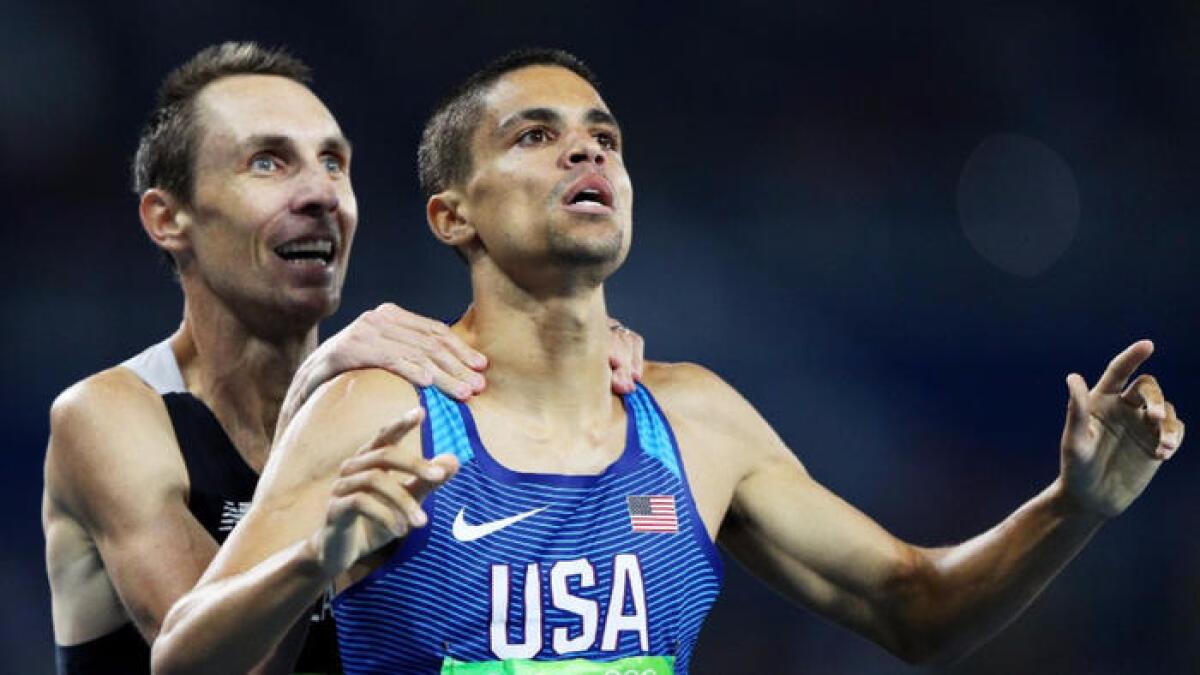
In track and field, there are always bumps in the road and each one of us had a unique journey to get here, but we pushed through.
— Allyson Felix
Medals came from rare and unexpected places for American runners on the last day of the track and field portion of the Rio Games, although they also tapped the reliable gold mine of the women’s 1,600-meter relay for a sixth straight Olympic championship in that event and Allyson Felix’s ninth career medal.
When the evening was over, the U.S. team total stood at 31 with Sunday’s men’s marathon to go, three more than the 2012 U.S. team won in London and the most at a nonboycotted Games since 1956. The breakdown was seven golds and 15 total for the men’s squad, to six goals and 16 for the women.
------------
FOR THE RECORD: An earlier version of a display quote said that the 1,600-meter relay victory was Allyson Felix’s seventh gold medal. It is her sixth Olympic gold.
------------
They did it in spectacular fashion Saturday, with Maryland-born Matt Centrowitz holding off several late challenges to become the first U.S. man to win the Olympic 1,500-meter race since 1908. It was so unlikely an outcome that even he couldn’t believe it.
“Doing my victory lap I literally kept screaming to everyone I know, ‘Are you kidding me?’” said Centrowitz, who said he felt his legs begin to buckle in the last 20 meters but held on to end a plodding race with a fast finish. His time was three minutes and 50 seconds, the slowest winning time in decades.
- Share via
When water polo is much more than a game
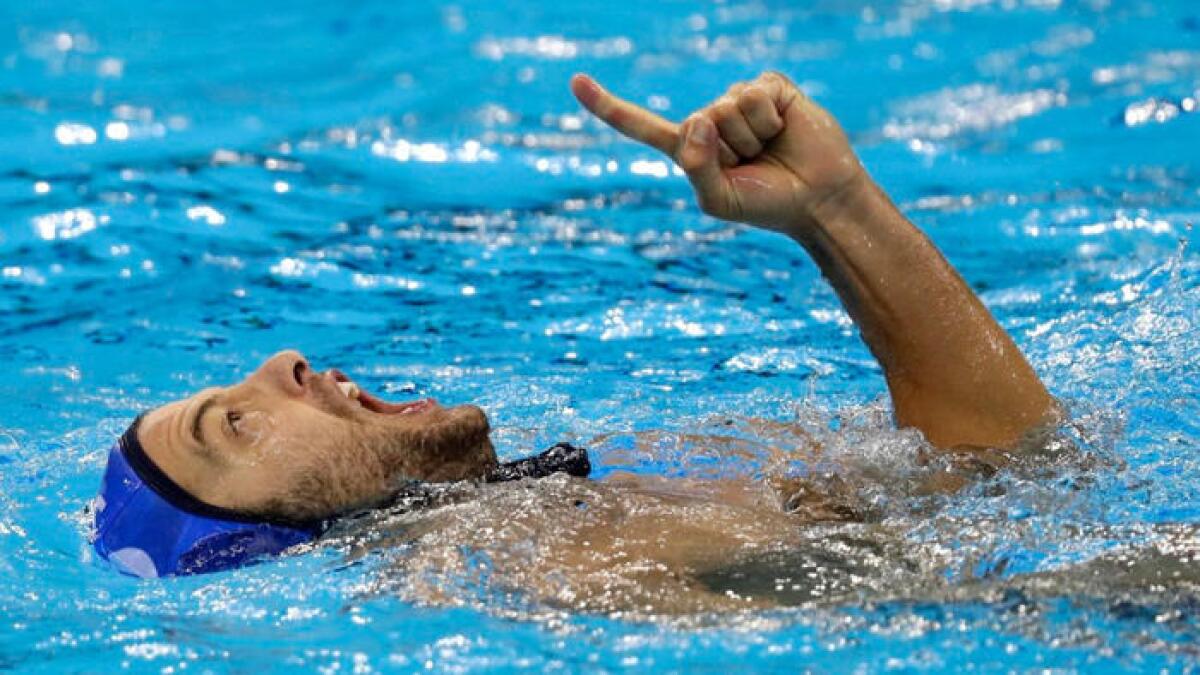
It feels like the whole team has reached eternity.
— Dusan Mandic, after Serbia won the water polo gold
The men decorated with scratches and red marks trickled through a hallway at the Olympic Aquatics Stadium and insisted the past didn’t matter.
Their countries, Croatia and Serbia, share a 150-mile border and a bloody history. They battled in the early 1990s as part of the conflagration ignited by the breakup of the former Yugoslavia. They traded claims of genocide. Their sporting events against each other became about much more than who won or lost and regularly led to unseemly chants, riots, even diplomatic incidents.
On Saturday, they shared a pool in the water polo final at the Rio Games.
“We don’t have any enemies when we play against them,” Serbia’s Gojko Pijetlovic said after his country muscled its way to an 11-7 victory for the gold medal. “We don’t hate anybody. We just play water polo. We play everyone the same.”
- Share via
U.S. men and women win 1,600-meter relay races
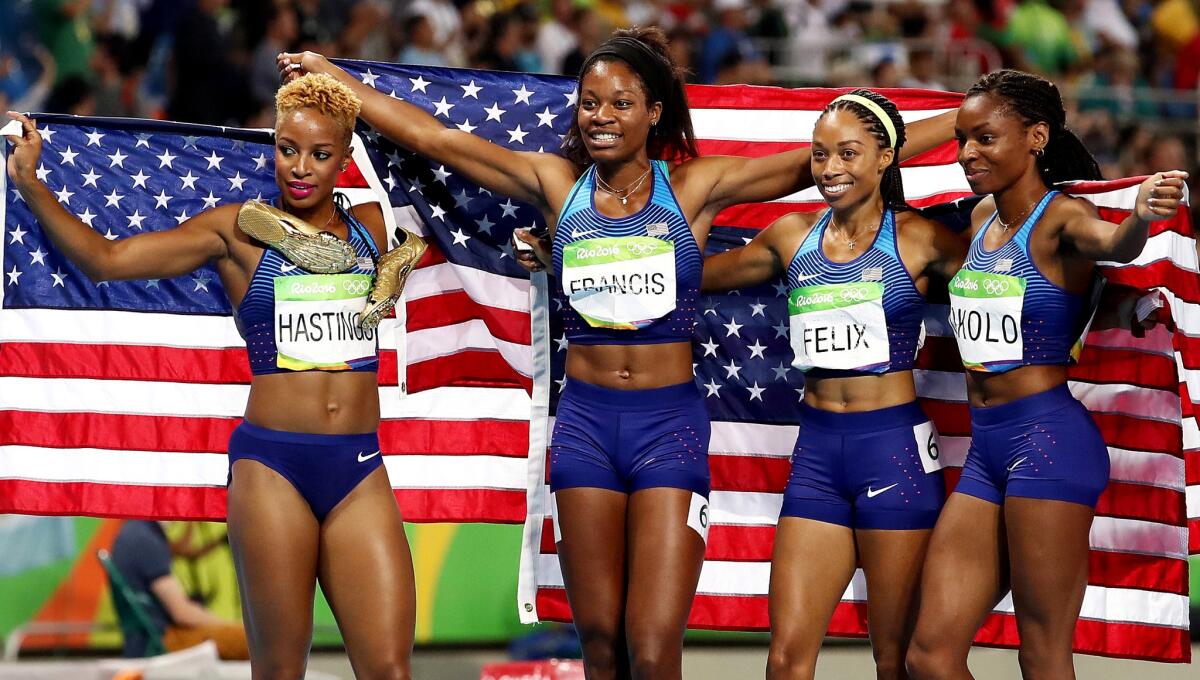
Doing my victory lap I literally kept screaming to everyone I know, ‘Are you kidding me?’
— Matt Centrowitz
Medals came from rare and unexpected places for American runners on the last day of the track and field portion of the Rio Games, although they also tapped the reliable gold mine of the women’s 1,600-meter relay for a sixth straight Olympic championship in that event and Allyson Felix’s ninth career medal.
When the evening was over, the U.S. team total stood at 31 with Sunday’s men’s marathon to go, three more than the 2012 U.S. team won in London and the most at a nonboycotted Games since 1956. The breakdown was seven golds and 15 total for the men’s squad, to six goals and 16 for the women.
They did it in spectacular fashion Saturday, with Maryland-born Matt Centrowitz holding off several late challenges to become the first U.S. man to win the Olympic 1,500-meter race since 1908. It was so unlikely an outcome that even he couldn’t believe it.
“Doing my victory lap I literally kept screaming to everyone I know, ‘Are you kidding me?’” said Centrowitz, who said he felt his legs begin to buckle in the last 20 meters but held on to end a plodding race with a fast finish. His time was three minutes and 50 seconds, the slowest winning time in decades.
- Share via
Brazil tops Germany for soccer gold medal when Neymar buries final penalty kick in shootout victory
The only thing on my mind was I had to do this. I have fulfilled my dream and to have fulfilled it in my home country makes me very proud.
— Neymar
When Brazil’s long nightmare finally ended Saturday, the captain of its soccer team dropped to his knees and spread his arms in celebration.
If “Christ the Redeemer” is Rio de Janeiro’s iconic emblem, the image of a kneeling, sobbing Neymar, eyes looking to the heavens, will be how Brazilians remember the city’s Olympics.
The Rio Games have been plagued by crime, polluted water and venue problems. v There were half-empty stadiums, overcrowded streets and little approaching the excitement of past Olympics.
But when Neymar’s penalty kick ended a tiebreaking shootout with Germany on Saturday, it did more than give Brazil its first Olympic soccer title. It also gave the host country something to celebrate.
- Share via
U.S. rolls to easy win over Spain for gold medal in women’s basketball
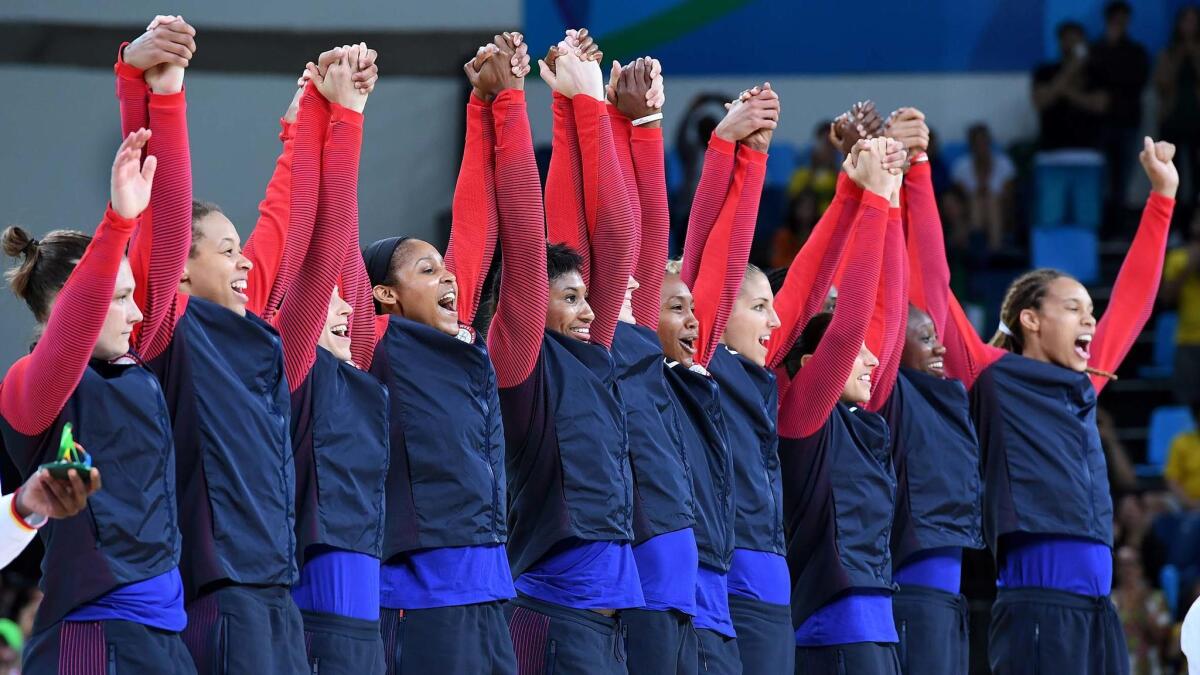
There never was a doubt.
The U.S. women’s basketball team dominated on its way to a sixth consecutive gold medal, clinching the top spot with a 101-72 victory over Spain on Saturday.
The U.S. team didn’t have to sweat on its path to the gold, defeating opponents by an average of 37.3 points over eight games.
Diana Taurasi, Sue Bird and Tamika Catchings each collected their fourth gold medals, joining Lisa Leslie and Teresa Edwards as the only four-time gold medalists in basketball – men or women.
Spain trailed by only three points, 27-24, early in the second quarter when the U.S. broke it open. Taurasi hit a pair of three-pointers as the Americans scored 16 of the next 19 points to take a 43-27 lead.
The lead only increased from there.
Taurasi, who had a stellar Olympics for the U.S., finished with 17 points, making five three-pointers. Maya Moore, also a standout for the Americans, had 14 points, five rebounds and six assists.
- Share via
Gwen Jorgensen earns the U.S. its first gold medal in triathlon
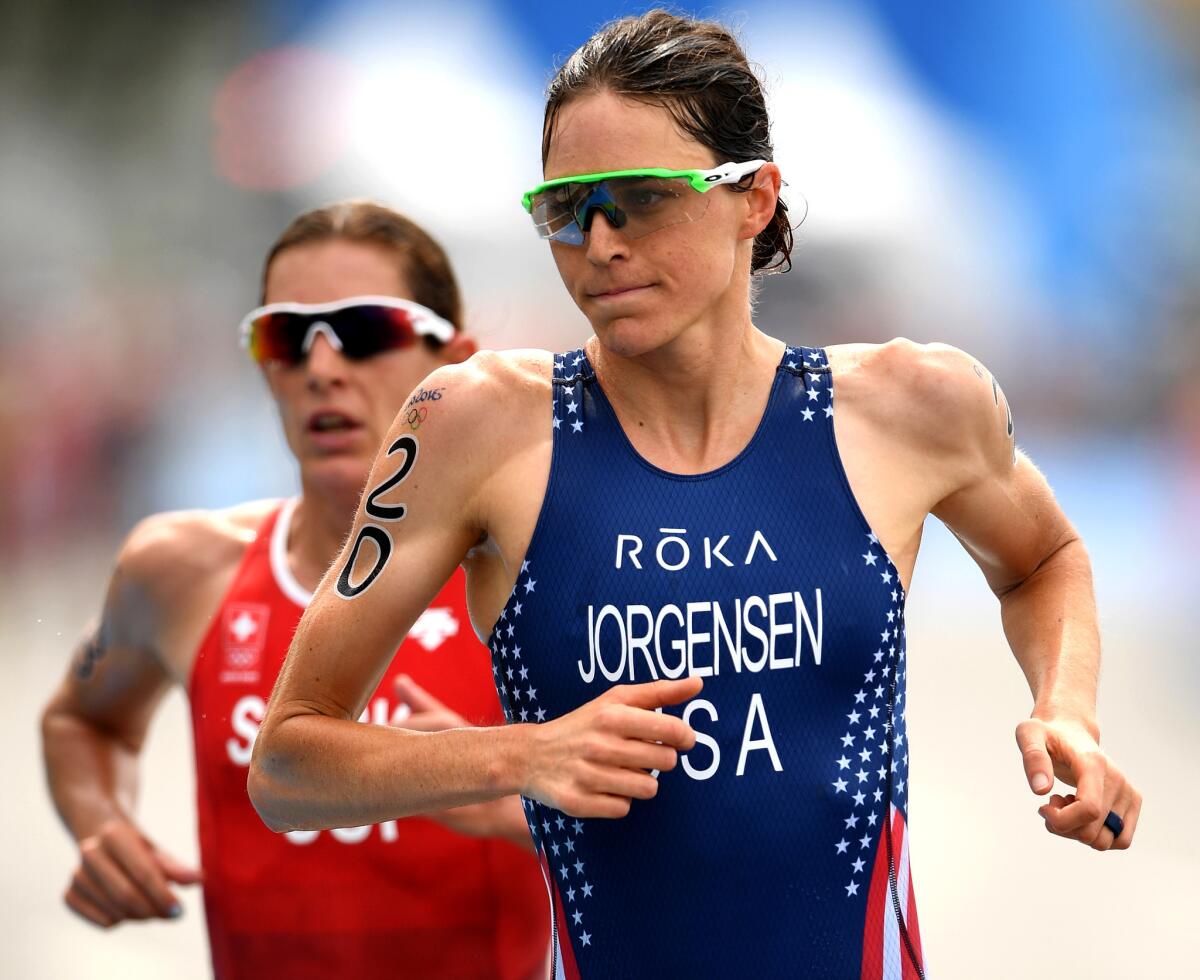
As she wobbled along on a flat tire four years ago in London, Gwen Jorgensen promised to turn that heartbreak at Hyde Park into a conquering of Copacabana Beach at the Rio Games.
She crushed both the course and the competition Saturday, giving the U.S. its first Olympic triathlon gold medal by cruising across the finish line in 1 hour, 56 minutes, 16 seconds.
That was 40 seconds ahead of silver medalist Nicola Spirig-Hug of Switzerland, who won gold at the 2012 Games after Jorgensen’s flat tire relegated her to a 38th-place finish.
Vicky Holland outsprinted British teammate Non Stanford for the bronze.
Jorgensen and Spirig-Hug were even until Jorgensen made her move with two kilometers left in the 10-kilometer final leg that followed a steep, 38.5-kilometer bike ride and a one-loop ocean swim.
As she approached the blue carpet, Jorgensen turned to look for Spirig-Hug, who wasn’t even in view around the bend.
Her goal within her grasp, Jorgensen lifted her sunglasses to her head, and that look of dogged determination she’d had since London dissolved into a smile.
After crossing the finish line, she reached down and grabbed the green, gold and blue ribbon and held it high above her head in triumph before breaking down in tears.
She said she was thinking of all the sacrifices, not just hers, but those of coach Jamie Turner and her husband, Patrick Lemieux, who abandoned his pro cycling career to serve as her operations manager .
“I’ve been pretty vocal about my goal for the past four years. After London, I said I wanted to go to Rio and I wanted to win gold,” Jorgensen said. “And for anyone that’s been around me, they know how much my husband, Patrick, has invested. He’s given up his career to support me. And then I also have Jamie Turner, who I’ve been on this four-year journey with, and he’s done so much for me.
“Just thinking about all the investments they’ve put into me and thinking about the four years, it all came down to one day,” Jorgensen said. “And to be able to actually execute on that day is pretty amazing.”
- Share via
U.S. defeats the Netherlands to win bronze medal in women’s volleyball
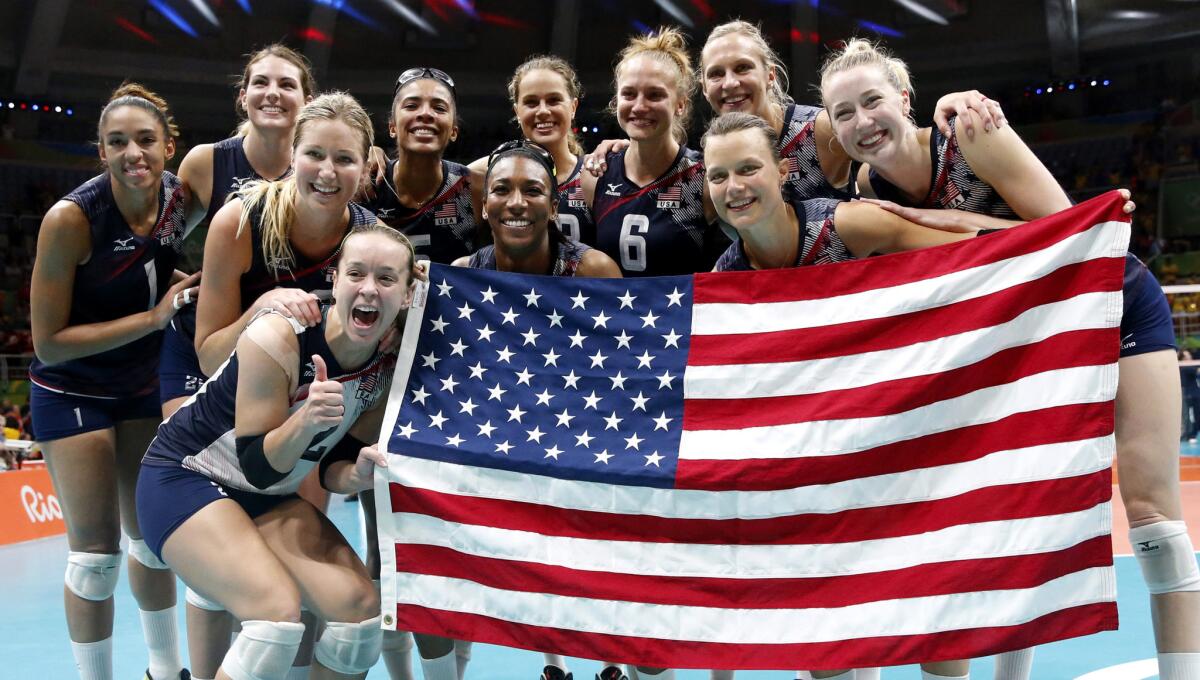
Karch Kiraly’s top-ranked U.S. women’s volleyball team has earned an Olympic bronze medal, hardly the color the Americans planned for when they came to Brazil chasing the program’s first gold in history.
The U.S. topped the Netherlands, 25-23, 25-27, 25-22, 25-19, Saturday, bouncing back for bronze two days after a heartbreaking five-set defeat to Serbia in the semifinals.
After Kim Hill’s ace on match point, the U.S. women fell into an embrace, and Kiraly hugged his coaches and brought his team together for a cheer.
The Netherlands shined in its first Olympics since 1996 in Atlanta, where the team finished fourth and surprised many as the Dutch put women’s volleyball on the map with a gutsy, never-give-up style.
- Share via
Saturday’s Rio Olympics schedule and results

Schedule and results from Saturday’s Rio Olympics competition. All times Pacific.
Badminton
Men’s singles gold medal match
Chen Long, China, d. Lee Chong Wei, Malaysia, 2-0
Men’s singles bronze medal match
Viktor Axelsen, Denmark, d. Lin Dan, China, 2-1
Basketball (Women)
Gold medal game
United States 101, Spain 72
Bronze medal game
Serbia 70, France 63
Boxing
Women’s flyweight gold medal match
Nicola Adams, Great Britain, d. Sarah Ourahmoune, France, 3-0
Men’s bantamweight gold medal match
Robeisy Ramirez Carrazana, Cuba, d. Shakur Stevenson, United States, 2-1
Men’s middleweight gold medal match
Arlen Lopez, Cuba, d. Bektemir Melikuziev, Uzbekistan, 3-0
Canoe/Kayak
Men’s kayak single 200-meter sprint
Gold--Liam Heath, Great Britain, 35.19 seconds
Silver--Maxime Beaumont, France, 35.36
Bronze--Saul Craviotto Rivero, Spain, 35.66
Bronze--Ronald Rauhe, Germany, 35.66
Men’s canoe double 1,000-meter sprint
Gold--Germany (J. Vandrey and S. Brendel), 3:43.91
Silver--Brazil (I. Queiroz dos Santos and E. Silva), 3:44.81
Bronze--Ukraine (D. Ianchuk and T. Mishchuk), 3:45.94
Women’s kayak four 500-meter sprint
Gold--Hungary (D. Kozák, G. Szabó, K. Fazekas Zur and T. Csipes), 1:31.48
Silver--Germany (S. Kriegerstein, S. Hering, T. Dietze and F. Weber), 1:32.38
Bronze--Belarus (M. Pautaran, M. Makhneva, N. Papok, V. Khudzenka), 1:33.90
Men’s kayak four 1,000-meter sprint
Gold--Germany (M. Rendschmidt, T. Liebscher, M. Gross and M. Hoff), 3:02.14
Silver--Slovakia (T. Linka, D. Myšák, J. Tarr and E. Vlček), 3:05.04
Bronze--Czech Republic (D. Havel, J. Štěrba, J. Dostál and L. Trefil), 3:05.17
Cycling
Women’s cross-country mountain bike final
Gold--Jenny Rissveds, Sweden, 1:30:15
Silver--Maja Włoszczowska, Poland, 1:30:52
Bronze--Catharine Pendrel, Canada, 1:31:41
Diving
Gold--Aisen Chen, China, 585.30
Silver--German Sanchez, Mexico, 532.70
Bronze--David Boudia, United States, 525.25
Golf (Women)
Gold--Inbee Park, South Korea, 268
Silver--Lydia Ko, New Zealand, 273
Bronze--Shanshan Feng, China, 274
Handball (Women)
Gold medal match
Russia 22, France 19
Bronze medal match
Norway 36, Netherlands 26
Modern Pentathlon
Men’s individual
Gold--Alexander Lesun, Russia, 1,479 points (Olympic record)
Silver--Pavlo Tymoshchenko, Ukraine, 1,472
Bronze--Ismael Marcelo Hernandez Uscanga, Mexico, 1,468
Rhythmic Gymnastics
Gold--Margarita Mamun, Russia, 76.483
Silver--Yana Kudryavtseva, Russia, 75.608
Bronze--Ganna Rizatdinova, Ukraine, 73.583
Soccer (Men)
Gold medal match
Brazil 1, Germany 1 (Brazil wins 5-4 on penalty kicks)
Bronze medal match
Nigeria 3, Honduras 2
Taekwondo
Men’s 80 kilogram plus
Gold--Radik Isaev, Azerbaijan, def. Abdoulrazak Issoufou Alfaga, Niger, 6-2
Bronze--Maicon Siqueira, Brazil, def. Mahama Cho, Britain, 5-4
Bronze--Dongmin Cha, South Korea, def. Dmitriy Shokin, Uzbekistan, 4-3
Women’s 67 kilogram plus
Gold--Shuyin Zheng, China, def. Maria del Rosario Espinoza Espinoza, Mexico, 5-1
Bronze--Bianca Walkden, Britain, def. Wiam Dislam, Morocco, 7-1
Bronze--Jackie Galloway, United States, def. Gwladys Epangue, France, 2-1
Track and Field
Men
1,600 relay
Gold--United States (Arman Hall; Lashawn Merritt; Gil Roberts; Tony McQuay), 2:57.30
Silver--Jamaica (Javon Francis; Peter Matthews; Nathon Allen; Fitzroy Dunkley), 2:58.16
Bronze--Bahamas (Chris Brown; Alonzo Russell; Michael Mathieu; Steven Gardiner), 2:58.49
1,500 meters
Gold--Matthew Centrowitz, United States, 3:50.00
Silver--Taoufik Makhloufi, Algeria, 3:50.11
Bronze--Nicholas Willis, New Zealand, 3:50.24
5,000 meters
Gold--Mo Farah, Britain, 13:03.30
Silver--Paul Chelimo, United States, 13:03.90
Bronze--Hagos Gebrhiwet, Ethiopia, 13:04.35
Javelin
Gold--Thomas Rohler, Germany, 90.30 meters
Silver--Julius Yego, Kenya, 88.24
Bronze--Keshom Walcott, Trinidad and Tobago, 85.38
Women
1,600-meter relay
Gold--United States (Allyson Felix; Courtney Okolo; Phyllis Francis; Natasha Hastings), 3:19.06
Silver--Jamaica (Anneisha McLaughlin-Whilby; Novlene Williams-Mills; Stephenie Ann McPherson; Shericka Jackson), 3:20.34
Bronze--Britain (Christine Ohuruogu; Emily Diamond; Anyika Onuora; Eilidh Doyle), 3:25.88
800 meters
Gold--Caster Semenya, South Africa, 1:55.28
Silver--Francine Niyonsaba, Burund, 1:56.49
Bronze--Margaret Nyairera Wambui, Kenya, 1:56.89
High Jump
Gold--Ruth Beitia, Spain, 1.97 meters
Silver--Mirela Demireva, Bulgaria, 1.97 meters
Bronze--Blanka Vlasic, Croatia, 1.97 meters
Triathlon
Women’s final
Gold--Gwen Jorgensen, United States, 1:56:16
Silver--Nicola Spirig, Switzerland, 1:56:56
Bronze--Vicky Holland, Great Britain, 1:57:01
Volleyball (Women)
Gold medal match
China d. Serbia, 3-1 (19-25, 25-17, 25-22, 25-23)
Bronze medal match
United States d. Netherlands, 3-1 (25-23, 25-27, 25-22, 25-19)
Water polo (Men)
Gold medal match
Serbia 11, Croatia 7
Bronze medal match
Italy 12, Montenegro 10
Spain 9, Brazil 8 (seventh place)
Hungary 12, Greece 10
Wrestling
Men
125 kilogram
Gold--Taha Akgul, Turkey, d. Komeil Ghasemi, Iran, 3-1
Bronze--Ibragim Saidov, Belarus, d. Levan Berianidze, Armenia, 3-1
Bronze--Geno Petriashvili, Georgia, d. Tervel Diagniv, United States, 4-0
86 kilogram
Gold--Abdulrashid Sadulaev, Russia, d. Selim Yasar, Turkey, 3-0
Bronze--J’Den Cox, United States, d. Reineris Salas, Cuba, 5-0
Bronze--Sharif Sharifov, Azerbajan, d. Pedro Francisco Ceballos Fuentes, Venezuela, 3-1
- Share via
Shakur Stevenson falls in U.S. bantamweight boxing final, takes Olympic silver
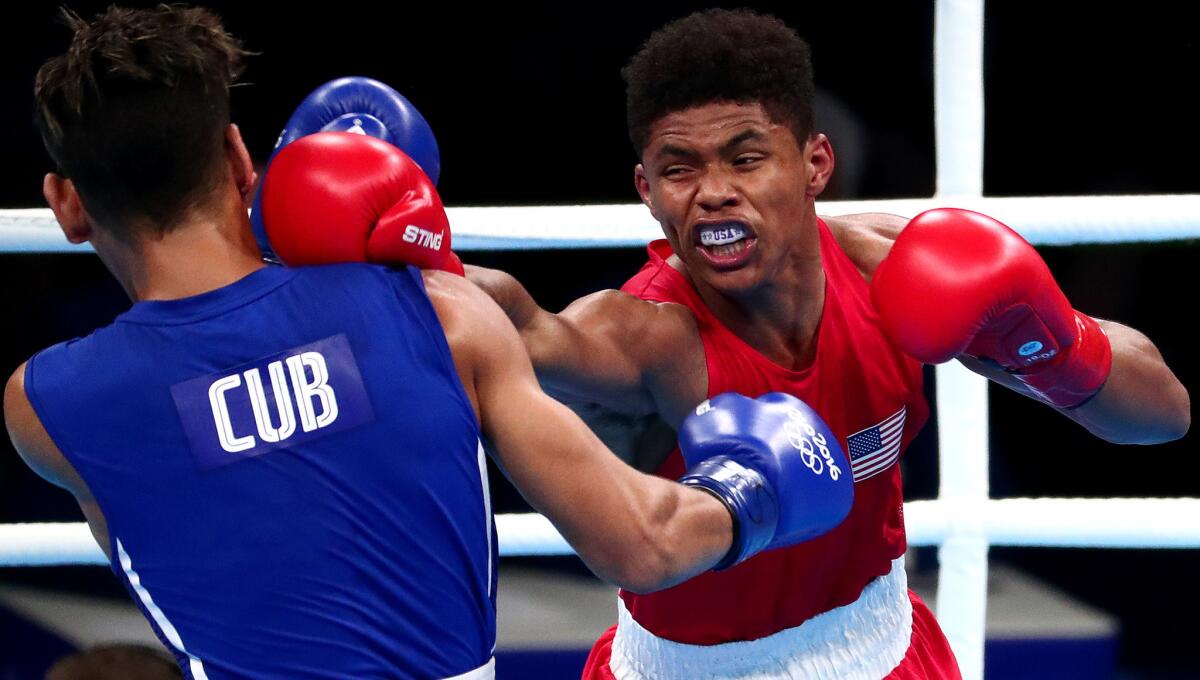
Cuba’s Robeisy Ramirez won a split-decision victory over Shakur Stevenson in the Olympic bantamweight boxing final Saturday, denying the U.S. its first men’s gold medal in the sport since 2004.
Ramirez, 22, danced into the half-full arena wearing a big smile and gesticulating to the crowd. The 19-year-old Stevenson, meanwhile, was all business.
But Ramirez started quickly and had the U.S. fighter backpedaling early in the opening round.
Stevenson tried to use a long, looping right to create some distance, but Ramirez slipped under it to land several hard, straight heads to the upper body. When the bell sounded at the end of the round, Ramirez smiled and shook his head at Stevenson.
Stevenson recovered to take the second round, going inside in an effort to take the sting away from Ramirez’s combinations. But the Cuban, an Olympic champion four years ago as a flyweight, was simply too quick and polished for Stevenson. And with 30 seconds, left he caught the American near the ropes, unleashing a series of punches. Though none did any damage, the flurry may have been enough to decide the fight.
The silver medal for Stevenson is the highest Olympic prize won by a U.S. male boxer since 2004, when Andre Ward captured the light-heavyweight title. And Claressa Shields’ medal, combined with Nico Hernandez’s bronze in the light flyweight division, make the Rio Olympics the most productive for USA Boxing since Athens, when the U.S. also won two medals.
Saturday’s fight was just the third of the Games for Stevenson — and his first in four days — after Russian Vladimir Nikitin was unable to answer the bell in the quarterfinals because of injury.
Stevenson won his first two bouts by unanimous decision.
- Share via
U.S. loses appeal of disqualification in men’s relay
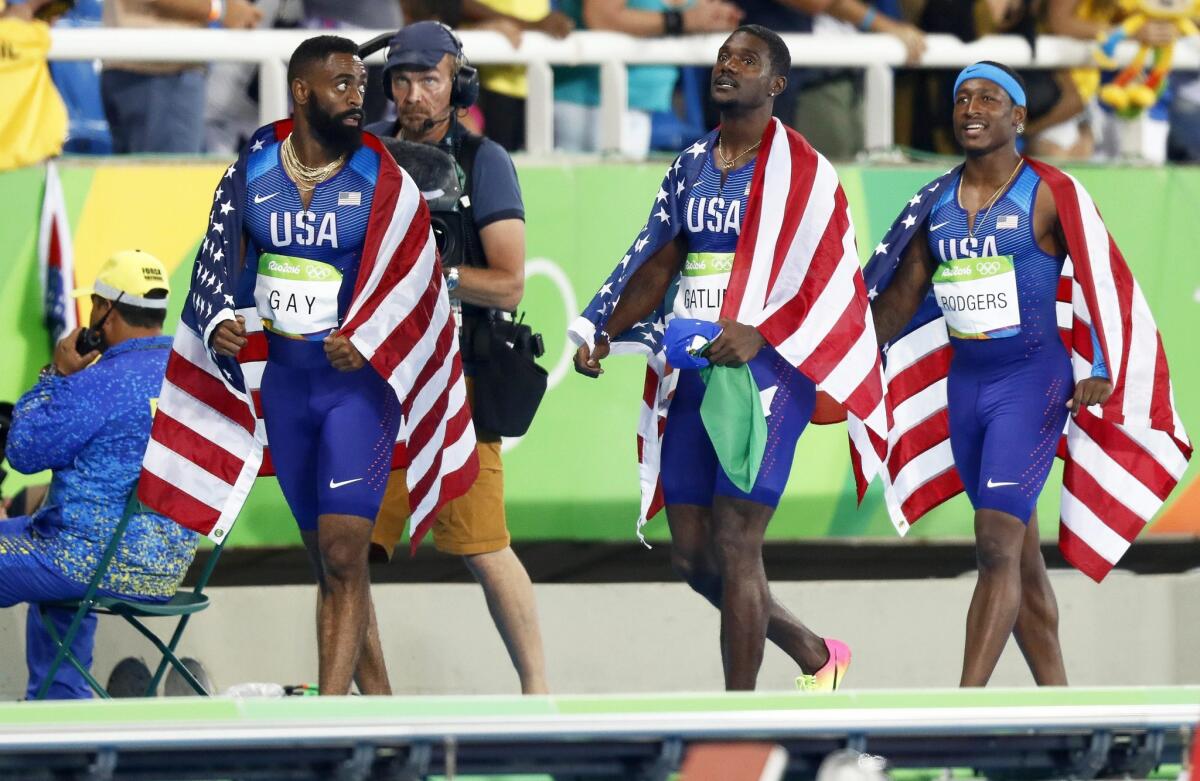
USA Track and Field’s appeal of the disqualification of the men’s 400-meter relay team has been denied, according to several reports.
The U.S. quartet finished third in the final on Friday but soon afterward was disqualified because of a faulty baton exchange between leadoff runner Mike Rodgers and Justin Gatlin in which Rodgers passed it too early. Jamaica won, followed by Japan. Canada, which had finished fourth, was elevated to third following the U.S. disqualification.
U.S. officials filed a protest with the Jury of Appeals of the International Assn. of Athletics Federations. The rejection of the appeal was first reported by Tim Layden of Sports Illustrated, who cited an official of the IAAF as saying all protests and appeals were rejected, leaving all results to stand. Associated Press also reported the protest had been rejected.
- Share via
Gwen Jorgensen wins gold for U.S. in women’s triathlon
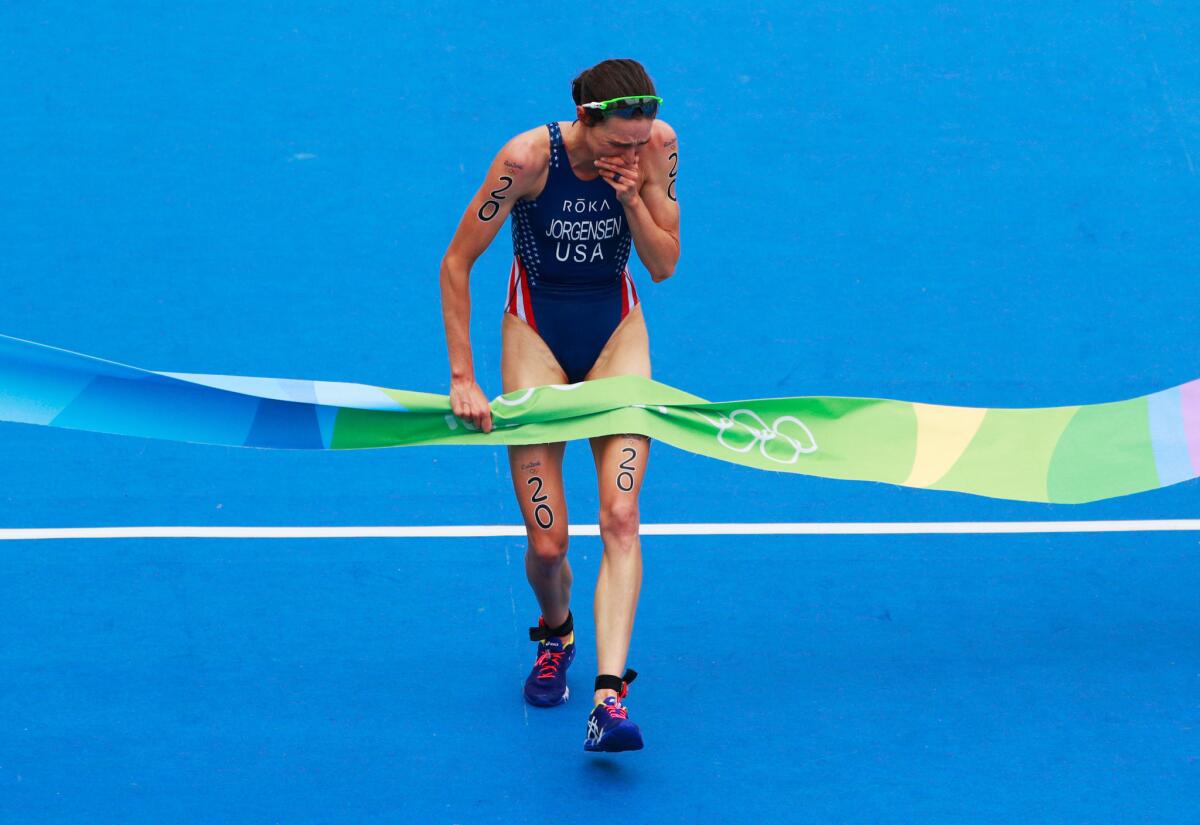
Four seconds is virtually nothing for a gifted runner like Gwen Jorgensen.
Jorgensen was a mere four seconds behind the leader, Mari Rabie of South Africa, in the bike-to-run transition of the women’s Olympic triathlon on Saturday morning.
Just like that Jorgensen erased the lead and surged into first in a matter of seconds. The only runner to stay right with Jorgensen during the 10-kilometer run along the scenic Copacabana course was veteran Nicola Spirig Hug of Switzerland.
The battle between Jorgensen and Spirig Hug came down to Jorgensen pulling away on the final lap. Jorgensen, of St. Paul, Minn., won the first triathlon gold for the United States, beating Spirig Hug by 40 seconds. Overcome by emotion, her smile quickly turned to tears after she crossed the finish line.
The only other medal the U.S. women have won in this event was a bronze by Susan Williams in 2004 in Greece.
For Jorgensen, it was a wildly different experience from London. In 2012, she suffered a flat tire and finished 38th.
This time, misfortune hit another U.S. athlete, Sarah True, who withdrew during the bike section. It appeared she injured her right knee, attempted to resume riding but was forced to quit.
- Share via
Simone Biles picked as U.S. flag-bearer for closing ceremony
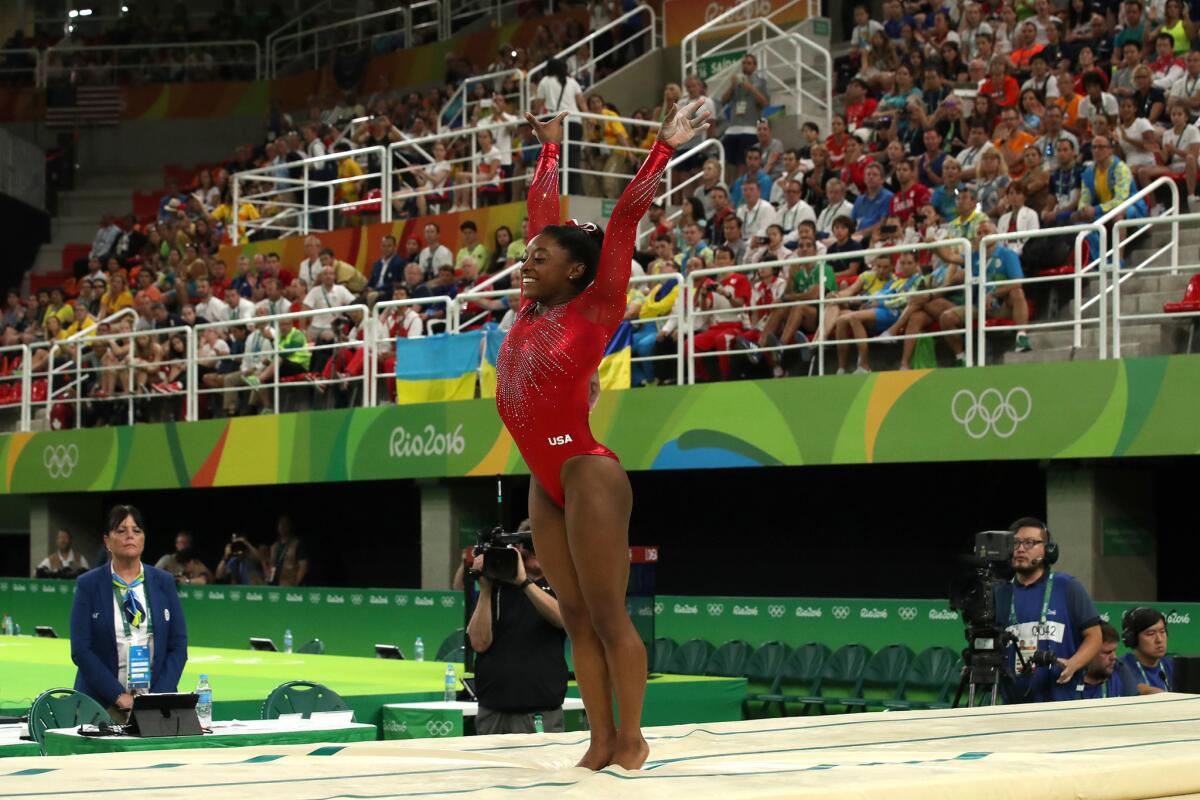
Simone Biles will carry the American flag during the closing ceremony for the Summer Olympics on Sunday, the U.S. Olympic Committee announced.
Biles won four gold medals during the gymnastics competition, including the all-around title.
“It’s an incredible honor to be selected as the flag-bearer by my Team USA teammates,” Biles said in a statement. “This experience has been the dream of a lifetime.”
She is the first female gymnast from the U.S. to be selected as a flag-bearer for the opening or closing ceremony.
- Share via
Two U.S. swimmers apologize for gas station incident, paint poor picture of Ryan Lochte’s actions

Two of the U.S. swimmers involved in the incident with Ryan Lochte at a gas station in Rio early Sunday morning have apologized in separate statements that both assert that Lochte initiated a confrontation with two security guards at the business when he ripped a poster off a wall.
Gunnar Bentz said that the four swimmers -- including Lochte, Jack Conger and Jimmy Feigen -- stopped at the gas station near Olympic Park and urinated on the side of the building. At that point, Bentz said, Lochte pulled a “framed metal advertisement” off a wall.
Bentz disputed accounts by local police that the swimmers also damaged a restroom.
Two security guards told the swimmers to exit their taxi, Bentz said, and one of the men held up a badge and pulled his gun when Feigen and Conger walked away from the vehicle. The second guard drew his weapon and instructed the swimmers to sit on a sidewalk.
“Again, I cannot speak to his actions, but Ryan stood up and began to yell at the guards,” Bentz said. “After Jack and I both tugged at him in an attempt to get him to sit back down, Ryan and the security guards had a heated verbal exchange, but no physical contact was made.”
Conger recounted a similar scene in his statement.
“Although I cooperated with their requests while there was a heated exchange among others, at one point a weapon was pointed at me,” he said. “Eventually, a man appeared who was able to translate for us, helping to defuse the situation. We paid some money to compensate them for the torn poster and returned to the Village in a different taxi.”
Bentz confirmed the account by local authorities that the swimmers paid the equivalent of about $50 U.S. to resolve the matter before leaving.
Though the gunplay isn’t visible in security footage of the incident made public so far, Bentz said he is “confident video angles have not been shown that would further substantiate my account.”
Bentz and Conger were pulled off their U.S.-bound flight by local authorities earlier this week, then allowed to leave the country 24 hours later after being interviewed by police.
Their statements offered a markedly different tone -- both conciliatory and detailed -- than a three-paragraph apology Lochte issued Friday. He returned to the U.S. on Monday.
“First and foremost, I deeply regret the trouble and embarrassment this event has brought to the people of Brazil and Rio de Janeiro, and the distraction it has caused from the achievements of my fellow Olympians,” Conger said. “This has been an unsettling, humbling and frightening experience. It’s a reminder that all of us, when we travel and especially when we represent the U.S. in the Olympics, are ambassadors for our country and should be on our best behavior.”
Bentz added, “Without question, I am taking away a valuable life lesson from this situation. In everything I do, I am representing my family, my country and my school. I will not take that responsibility lightly.”
Feigen, who remains in Brazil, hasn’t issued a statement. A Rio de Janeiro court said he apologized Friday for his role in the incident.
- Share via
Finding solace in a time of sorrow: U.S. women’s water polo team gives grieving coach a reason to smile
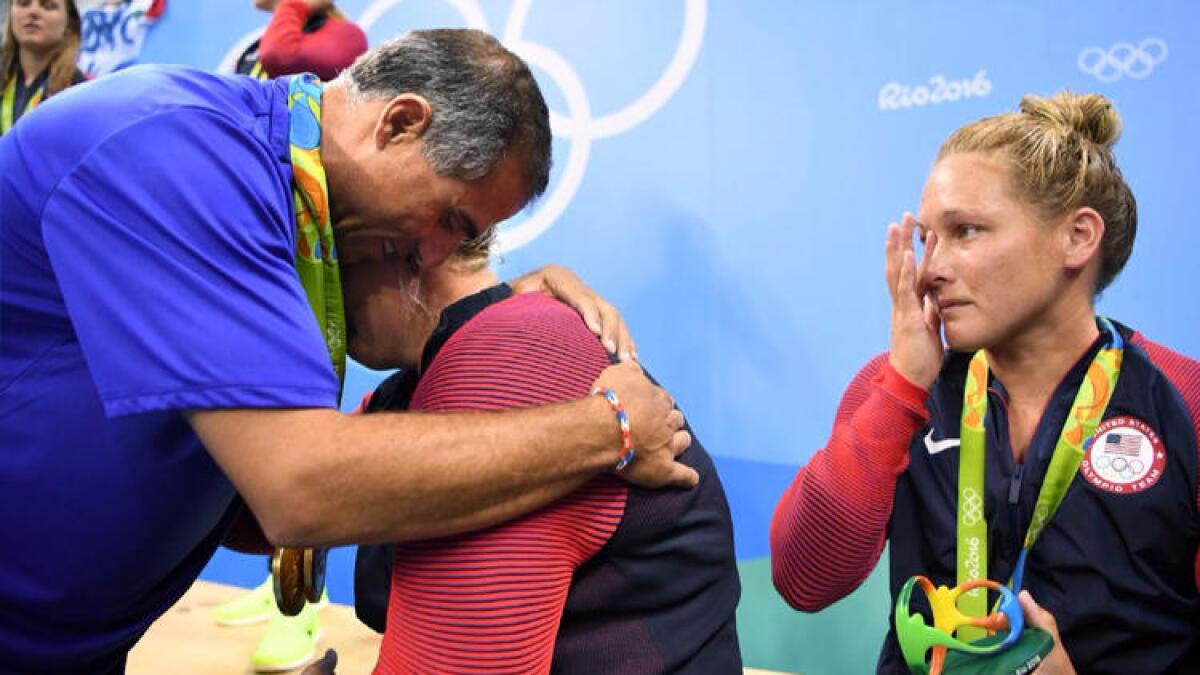
The thing I kept coming back to was it would be very selfish to let what happened to me personally affect this group and what we have set out to do.
— Adam Krikorian, U.S. water polo coach
It was less than three minutes to play in Friday’s women’s Olympic water polo final when the emotions started to kick in for Adam Krikorian.
No women’s team had ever won consecutive gold medals in the sport, something Krikorian’s team was about to do. No team had ever scored more goals, given up fewer or won by a larger margin than Krikorian’s U.S. team did in its 12-5 rout of Italy.
Yet Krikorian’s emotions had nothing to do with joy or accomplishment. Two days before the opening ceremony of the Rio Games, Krikorian’s brother Blake was found dead in his car at a Northern California beach. The coroner said he had gone paddle boarding and died of a heart attack. He was 48.
“It was hitting me pretty hard at the end of the game. Just thinking about my brother,” the coach said, taking a long pause to compose himself, “thinking about how hard this journey’s been.”
- Share via
Column: Clipper’s D.J. is as good as gold
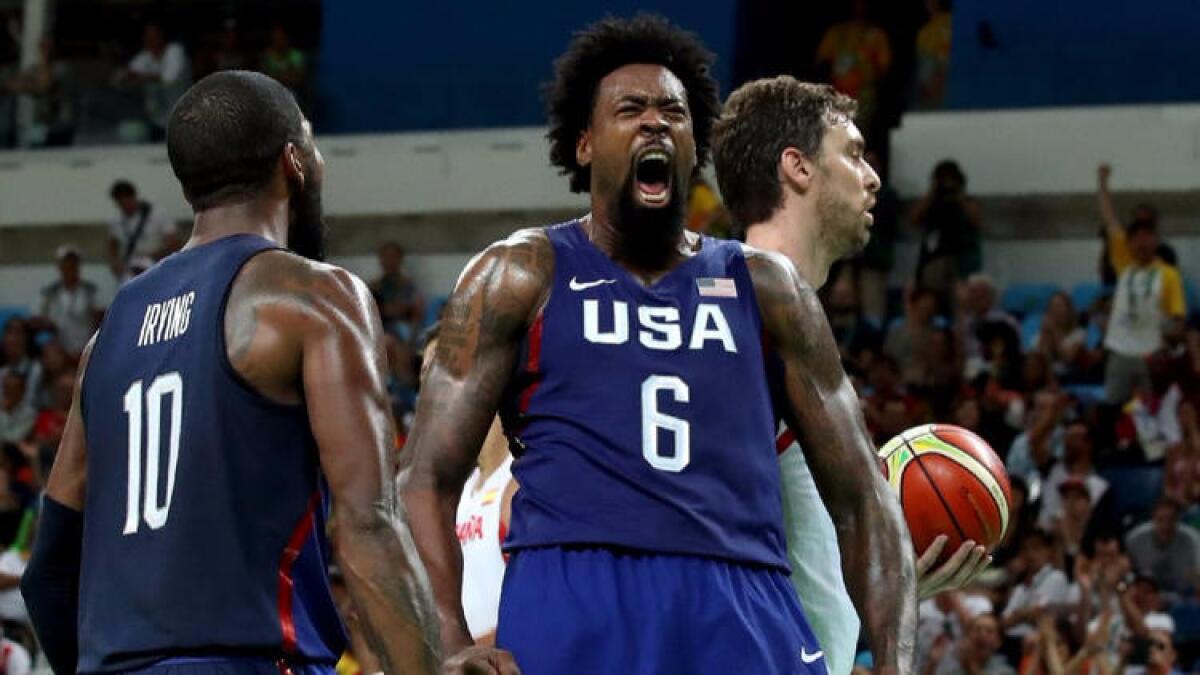
We wouldn’t be playing for a gold medal if DeAndre didn’t play that well.
— Mike Krzyzewski, U.S. men’s basketball coach
He’s always been third.
As much lovable cartoon character as feared NBA star, his missed free throws as celebrated as his highlight dunks, DeAndre Jordan has spent his career as a giant in a shadow.
Meet D.J., the flying, blocking, board-rattling Olympian.
- Share via
Payback or not, this game is special for the Brazilians
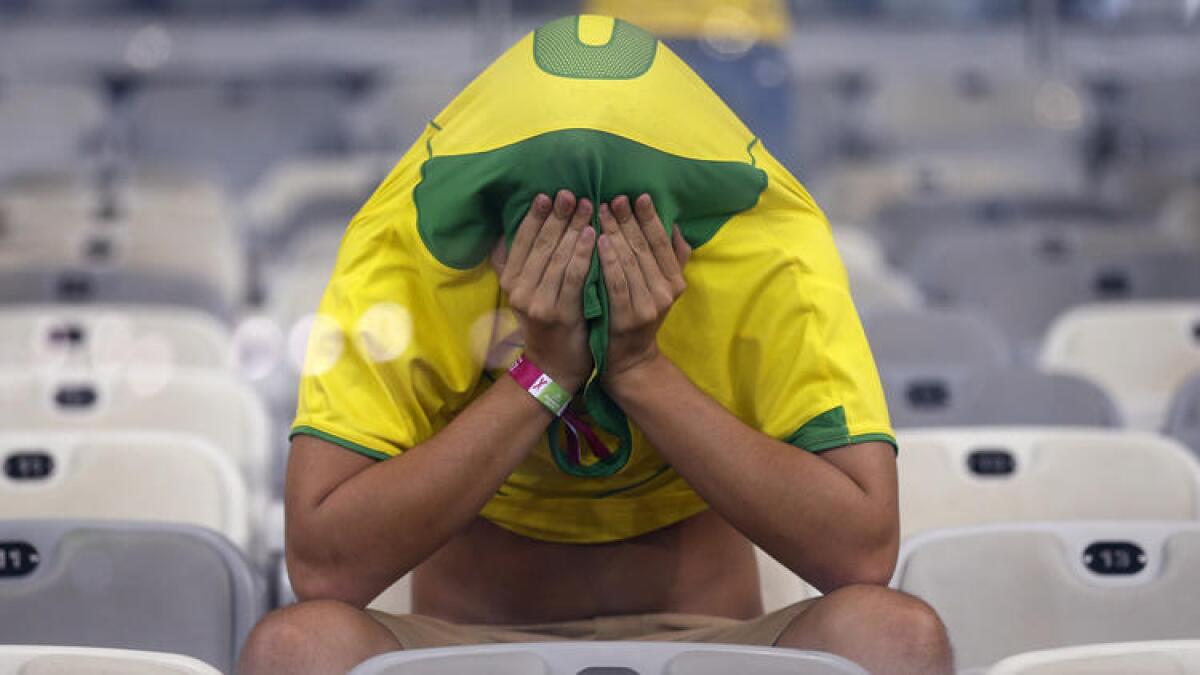
This is what we wanted. We are fighting to conquer this.
— Gabriel Jesus, Brazil forward on defeating Germany
In the climactic scene of the iconic boxing moving “Rocky,” a bloodied and battered Apollo Creed pulls Rocky Balboa close and says, “There ain’t gonna be no rematch.”
But they do meet again.
It’s tough to pass up a rematch. Win once? Maybe you got lucky. Do it again, and no one can question who’s better. That’s why Muhammad Ali fought Joe Frazier three times. It’s why the Yankees play the Red Sox 19 times each season.
It’s also why Saturday’s Olympic soccer final between host Brazil and World Cup champion Germany has become, for Brazilians, the biggest event of the Rio Games.
- Share via
The Clippers’ DeAndre Jordan is having the time of his life chasing gold at the Olympics
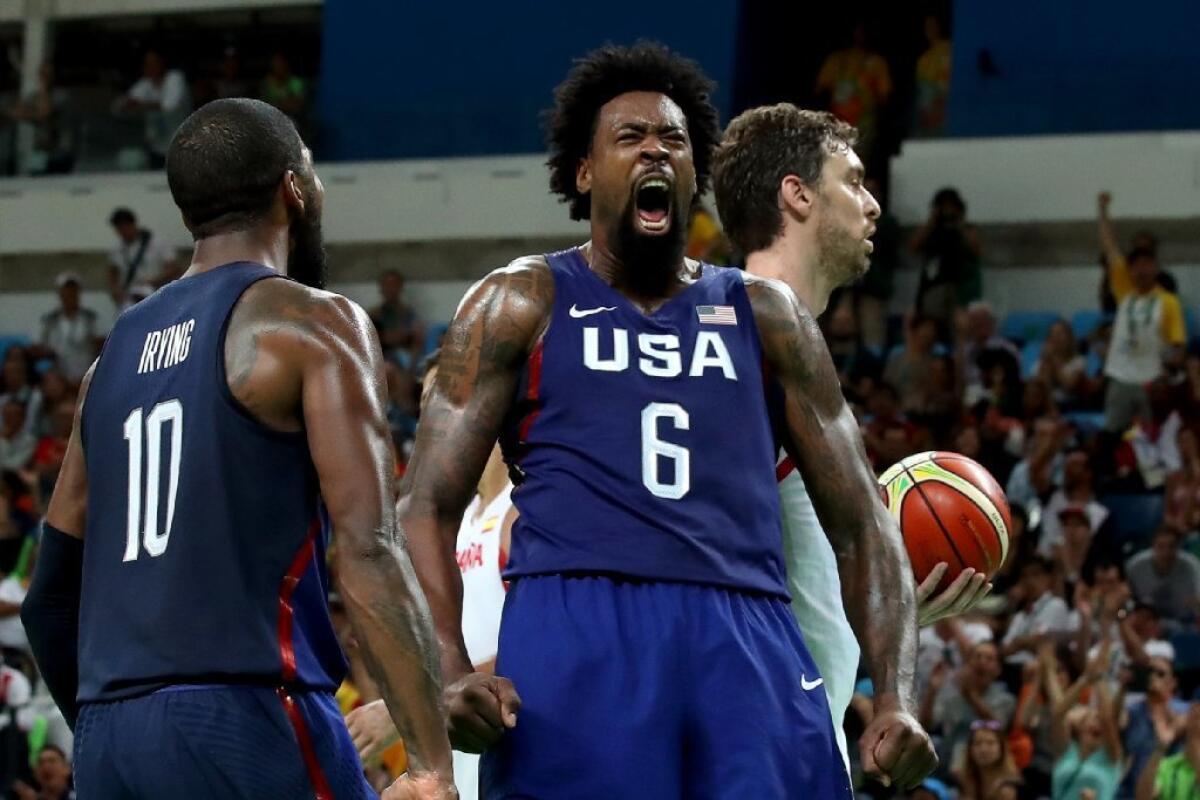
For eight seasons with the Clippers, DeAndre Jordan has never even been the most important player on his team.
Which made it fairly breathtaking Friday when he was the most important player in his country ...
- Share via
Brazil-Germany a World Cup rematch? Not to the players or coaches
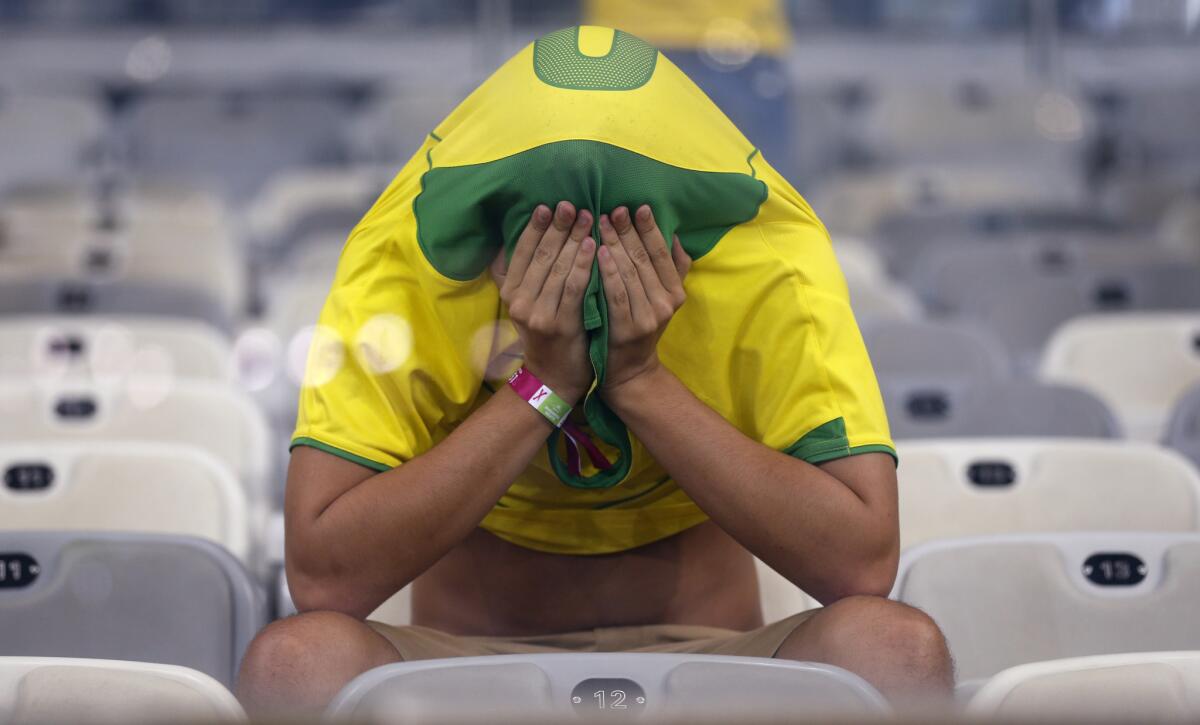
The soccer final between host Brazil and World Cup champion Germany has become, for Brazilians, the biggest event of the Rio Games.
Two years ago, Germany humiliated Brazil, 7-1, on its home soil in the most lopsided World Cup semifinal in history. It was a national embarrassment that will not soon be forgotten.
Saturday’s rematch offers a chance at both revenge and redemption, though it can’t completely atone for the World Cup debacle because it won’t be a true international match.
Here’s why ...
- Share via
In 3 Olympics finals, Usain Bolt has run for less than 2 minutes
- Share via
U.S. men celebrate a bronze in the 400-meter relay -- then get the bad news
Led by Usain Bolt, Jamaica won the men’s 400-meter relay at the Rio Olympics, with Japan taking silver.
The U.S. initially was declared third but was disqualified because of an illegal exchange outside the zone between leadoff runner Mike Rodgers and Justin Gatlin. Canada was elevated to third, with former USC star Andre De Grasse becoming a three-time Rio medalist as the anchor.
It was the ninth time since 1995 that a U.S. men’s relay team was disqualified or couldn’t get the baton around at an Olympics or world championship.
- Share via
Usain Bolt completes golden triple-triple on the track
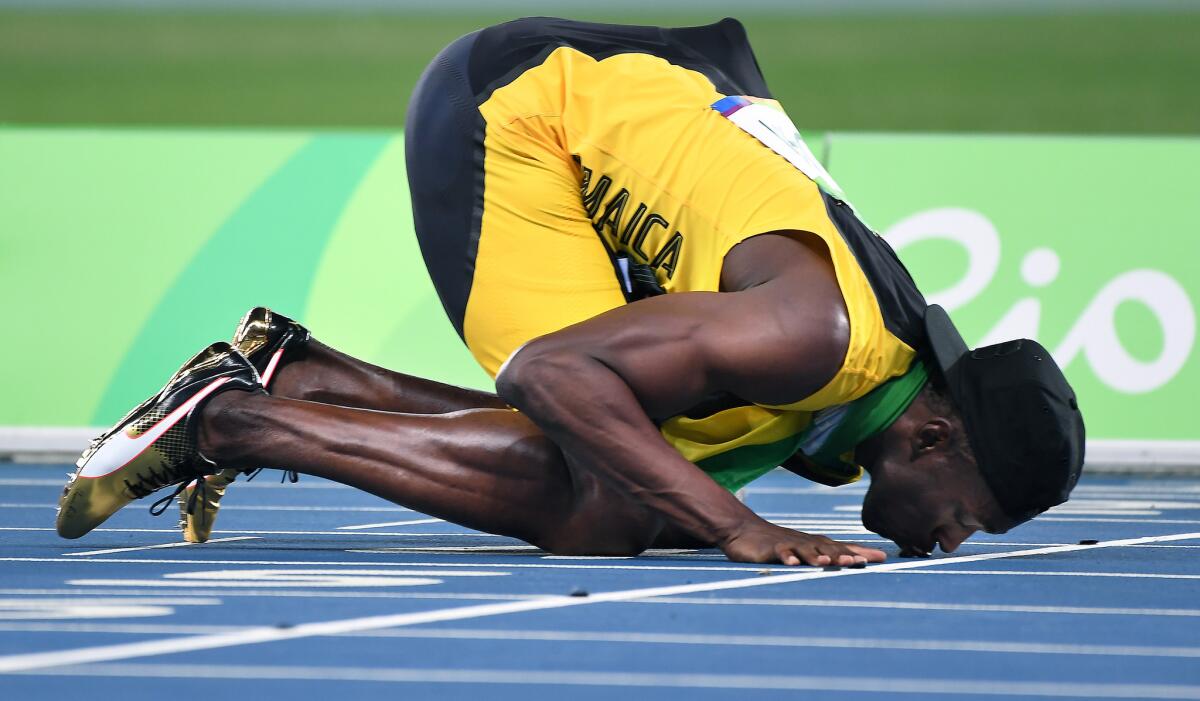
In perhaps the final Olympic race of his remarkable career, Jamaican sprinter Usain Bolt went a perfect three for three in his third consecutive Summer Games, an unprecedented feat and one that might stand untouched for years to come.
Bolt, who added the Rio 100- and 200-meter dash titles to the crowns he won in Beijing and London, anchored Jamaica’s 400-meter relay team to victory Friday at Olympic Stadium in 37.27 seconds.
Japan was a surprising second in 37.60 seconds. The U.S. team of Mike Rodgers, Justin Gatlin, Tyson Gay and Trayvon Bromell that took third in 37.62 seconds was later disqualified for what’s believed to be a lane violation on their first baton exchange. Fourth-place Canada (37.64 seconds) was elevated to the bronze.
Bolt ran away from the field in the last 30 meters or so, then promptly ran to the crowd to greet his adoring fans before rejoining his teammates for celebrations that included dancing, wrapping themselves in flags and generally savoring a historic moment.
Bolt, who will be 30 on Sunday, has said he will retire after these Rio Games, which would be a great loss to a sport that urgently needs not only his excellence but his genial, fan-friendly personality. He didn’t set any world records in Rio, but he created great excitement and brought thousands of spectators to a stadium that was largely empty throughout the competition.
Just before the men’s race, the U.S. women’s 400-meter relay team of Tianna Bartoletta, Allyson Felix, English Gardner and Tori Bowie won gold with a time of 41.01 seconds. That was the eighth medal of Felix’s stellar career, a total comprising five gold-- the most for any female track athlete -- and three silver.
The Jamaican team of Christiana Williams, sprint-double champion Elaine Thompson, Veronica Campbell-Brown and Shelly-Ann Fraser-Pryce was second in 41.36 seconds. Britain was third in 41.77 seconds.
The U.S. women had to run out of Lane 1 on Friday, making their task difficult. They were placed there because of their first-round mishap on Thursday, when Felix was elbowed by a Jamaican runner and couldn’t hand the baton cleanly to Gardner. That put them out of an automatic qualification, but the result was successfully appealed, and the relay -- with Morolake Akinosun as the anchor -- was allowed to run alone to try to get a top-8 time. They recorded the fastest time but were considered to have qualified on time and were relegated to the inside instead of a prime middle lane.
Earlier Friday, the U.S. women’s 1,600-meter relay team ran the fastest first-round time- -- 3:21.42 -- and moved on to Saturday’s final. The lineup of Courtney Okolo, Taylor Ellis-Watson, Francena McCorory and Phyllis Francis got the baton around cleanly, avoiding any mishaps of the variety that the 400-meter relay team experienced in its first-round heat on Thursday. The 1,600-meter lineup will change for the final, though the exact lineup won’t be announced until Saturday afternoon.
Jamaica (3:22.38) had the second-best time, followed by Ukraine, Britain, Canada, Italy, Poland and Australia.
The U.S. men’s 1,600-meter relay team finished second in its heat to Jamaica, which got a scorching anchor leg from Javon Francis. Arman Hall, Tony McQuay, Kyle Clemons and David Verburg of the U.S. were timed in 2:58.38, just behind Jamaica’s 2:58.29. Trinidad and Tobago was disqualified from that heat. Britain won the second heat but was disqualified, allowing Brazil to make Saturday’s final.
In the women’s 5,000, Vivian Jepkemoi Cheruiyot of Kenya set an Olympic record with a time of 14:27.17 to win gold, ahead of Hellen Obiri of Kenya (14:29.77) and 10,000-meter champion Almaz Ayana of Ethiopia (14:33.59). Shelby Houlihan, who became the lone American entrant when Abbey D’Agostino had to withdraw because of a serious knee injury she suffered during a fall in the previous round, finished 11th in 15:08.89.
- Share via
Allyson Felix gets record fifth gold medal when U.S. women win 400 relay
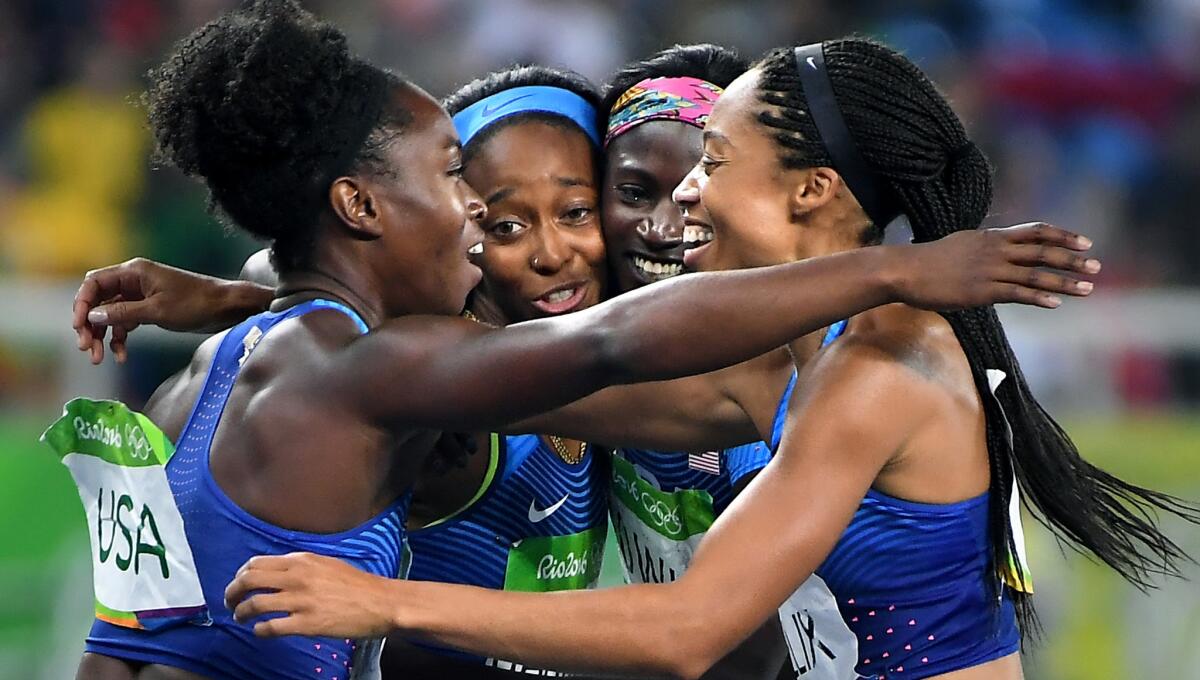
The U.S. women have retained the 400-meter relay title and helped Allyson Felix win her record fifth Olympic gold medal.
The Americans, who needed to set a qualifying time in a solo rerun hours after dropping the baton in the preliminaries and getting a second chance on protest, won Friday’s final in 41.01 seconds.
A Jamaican team including Elaine Thompson and Shelly-Ann Fraser-Pryce was second in 41.36. Britain won bronze in a national record 41.77.
The 30-year-old Felix entered the Rio Games as one of six women with four Olympic gold medals in track and field.
- Share via
Germany wins its first women’s soccer gold medal with 2-1 victory over Sweden
Germany defeated Sweden, 2-1, to win the women’s soccer gold medal for the first time in the Olympics.
Germany opened the scoring with a goal by Dzsenifer Marozsan in the 48th minute and added to the lead with an own goal by Swedish defender Linda Sembrant in the 62nd.
Sweden pulled one closer with Stina Blackstenius in the 67th but was not able to get the equalizer despite some good late chances at the Maracana Stadium.
A two-time World Cup champion, Germany had previously won three bronze medals. It was playing in the Olympic final for the first time.
Sweden has won its first silver in women’s soccer. It had never been on the podium.
- Share via
American Connor Fields finally brings home gold in men’s BMX racing
The United States ended its gold medal drought in BMX racing after Connor Fields won the men’s Olympic final in the American-born sport on Friday, and Mariana Pajon of Colombia successfully defended her title in the women’s final.
U.S. cyclist Alise Post took silver behind Pajon, while Stefany Hernandez of Venezuela won bronze.
A fan favorite, Pajon raised her bike in the air after pedaling to a stop across the finish line, acknowledging the adoring fans in the stands waving the yellow, blue and red flag of her home country.
Fields was just as jubilant after racing to the front and holding off Dutch rider Jelle van Gorkom at the finish line to take the gold.
There was a photo finish for third, with Carlos Ramirez Yepes of Colombia just edging out the United States’ Nic Long for the bronze. Officials went to a video replay to determine that medal.
Still, it was a banner day for the United States. The medals for Fields and Post snapped a podium drought in London in 2012.
It had been a trying few months for Fields, who broke a bone in his left hand in the spring. He only returned to the bike in June and needed a special brace to compete in Rio de Janeiro.
“There was kind of a point where I exited the last corner and realized I was winning,” said a smiling Fields, his new medal draped around his neck. “I was like, ‘Get to the line! Get to the line!’ I crossed that finish line and dropped to my knees. I couldn’t believe it.”
The reigning world champion, Pajon enjoyed home-continent advantage and acknowledged loud fans who wore Team Colombia shirts. Pajon rode to the front early in each of her three semifinal heats, and never looked back, either after the first turn in the final.
“My first gold was huge. But two is amazing,” said Pajon, struggling to find words after the race.
She’s a star in Colombia, so much so that a BMX track has been named in her honor. She won a world title on that course in May.
Pajon will take home a bigger prize when she returns to Medellin.
- Share via
U.S. tops Spain to advance to gold-medal game in men’s basketball
It wasn’t pretty, but Team USA has advanced to Sunday’s gold-medal men’s basketball game.
The U.S. defeated Spain with a grinding 82-76 victory on Friday and now awaits the winner of the second semifinal between Australia and Serbia, two teams that the Americans defeated by 10 and three points, respectively, in group play.
In the first half, the U.S. grabbed 13 offensive rebounds that helped pace it to a 45-39 halftime edge. Klay Thompson, who finished with 22 points, had 17 by halftime.
Kevin Durant added 14 points and Kyrie Irving had 13 for the Americans.
But the U.S. could never quite put Spain away. In particular, the U.S. had trouble containing Pau Gasol, who scored 23 points.
The referees tried to wrestle control of the game early and doled out five technical fouls, giving the game a choppy pace. It didn’t help that both teams struggled to find their stride offensively.
Serbia gave the U.S. its closest game in preliminary play. The Americans pulled out a 94-91 victory in a game that went down to the final seconds, when the Serbs had a chance to tie the score.
Despite defeating Australia, 98-88, the Americans trailed by two points, 72-70, early in the fourth quarter. That’s when Carmelo Anthony got hot and scored 14 of Team USA’s next 18 points to help open an 88-80 lead.
- Share via
U.S. women win second straight water polo title
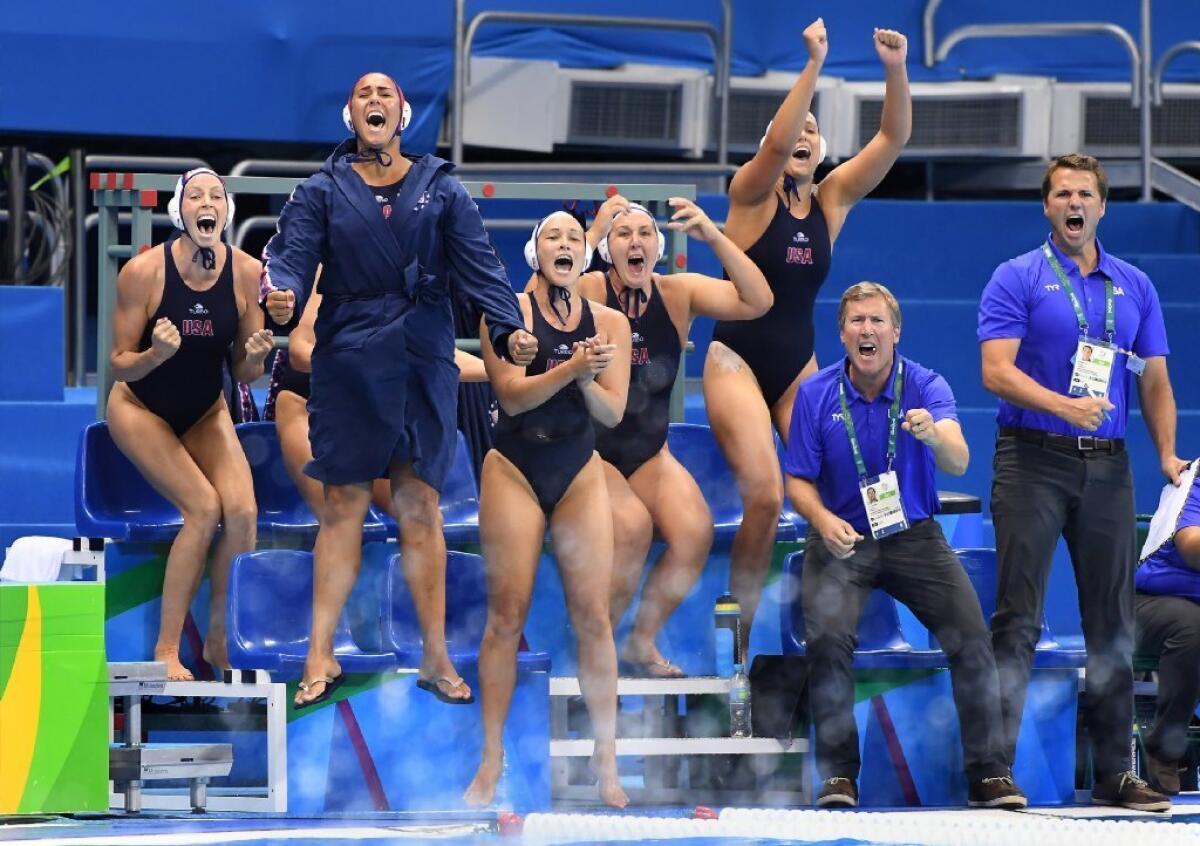
The U.S. became the first two-time Olympic champion in women’s water polo history Friday, blitzing Italy, 12-5, at Rio’s Olympic Aquatics Stadium.
The U.S. won its first gold in London four years ago but just four women -- Maggie Steffens, Kami Craig, Melissa Seidemann and Courtney Mathewson -- from that team played in Rio. All four scored in Friday’s final, though, with Steffens’ third-period goal giving her a tournament-high 17.
The U.S., which trailed just once for less than a minute in six games in Rio, took the lead for good on Kiley Neushul’s goal less than four minutes into the first period.
By the end of the opening eight minutes, the Americans led 4-1 and were never seriously challenged after that. Neushul finished with three goals -- on four shots -- while Rachel Fatal and Mackenize Fischer scored two each. Goalkeeper Ashleigh Johnson also came up big, making nine saves and stopping a penalty shot early in the second half before coming out of the game for Sami Hill with 2 1/2 minutes to play.
Hill made two saves in her brief appearance.
Friday’s final was the first matchup of former champions in five women’s water polo tournaments and both teams came into the gold-medal game unbeaten.
Italy won its gold in 2004.
- Share via
U.S. men’s volleyball team loses to Italy in semifinals
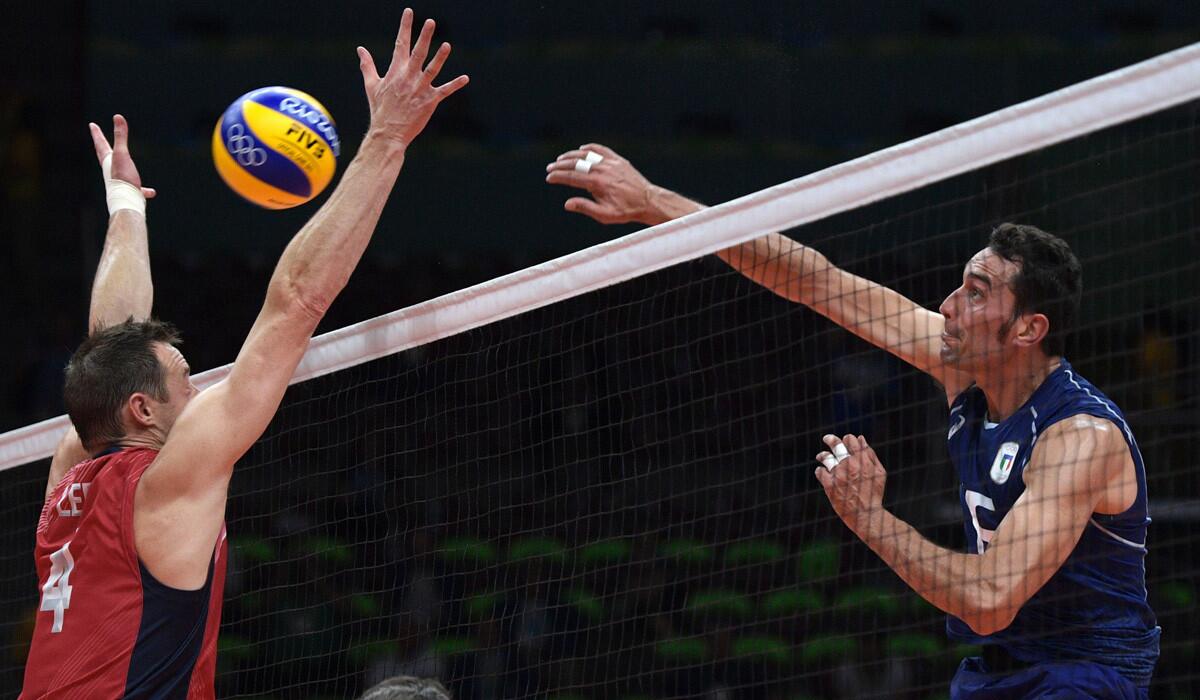
They called a timeout to try to stop Italy’s momentum.
It didn’t work.
They tried it again.
Nothing, it seemed, was going to work late in the fifth set against a suddenly surging Italy.
The well-developed survival skills exhibited by the U.S. men’s volleyball team here vanished late in its semifinal against Italy on Friday at the Olympics. Italy won a thriller, 30-28, 26-28, 9-25, 25-22, 15-9. The U.S. had been trying to avenge an earlier loss to Italy in pool play as well as a devastating defeat four years ago at the London Olympics.
Italy saved five set points in the opening set and had one in the second set but missed the chance to take a two-set lead. It recovered its poise after a one-sided third set and won the fourth, finishing it off with a 6-0 run.
“At the end of the day, we just weren’t skilled enough,” said U.S. Coach John Speraw. “We just didn’t execute on some opportunities and Italy did.”
On trying to get up for the bronze-medal match after such a tough loss:
“It’s really really hard. I almost feel like today we need to mourn and just get it out of our system,” he said. “I know we will. Tomorrow we’re going to have to regroup to prepare ourselves for the next step.”
In Sunday’s bronze-medal match, the U.S. will play Brazil or Russia. Brazil and Russia were to play in a semifinal later on Friday.
The journey has been anything but easy for the U.S. in Rio. The team lost their first two games in pool play – to Canada and Italy – before finding the right touch and aggressive approach after a team meeting.
- Share via
Friday’s Rio Olympics schedule and results
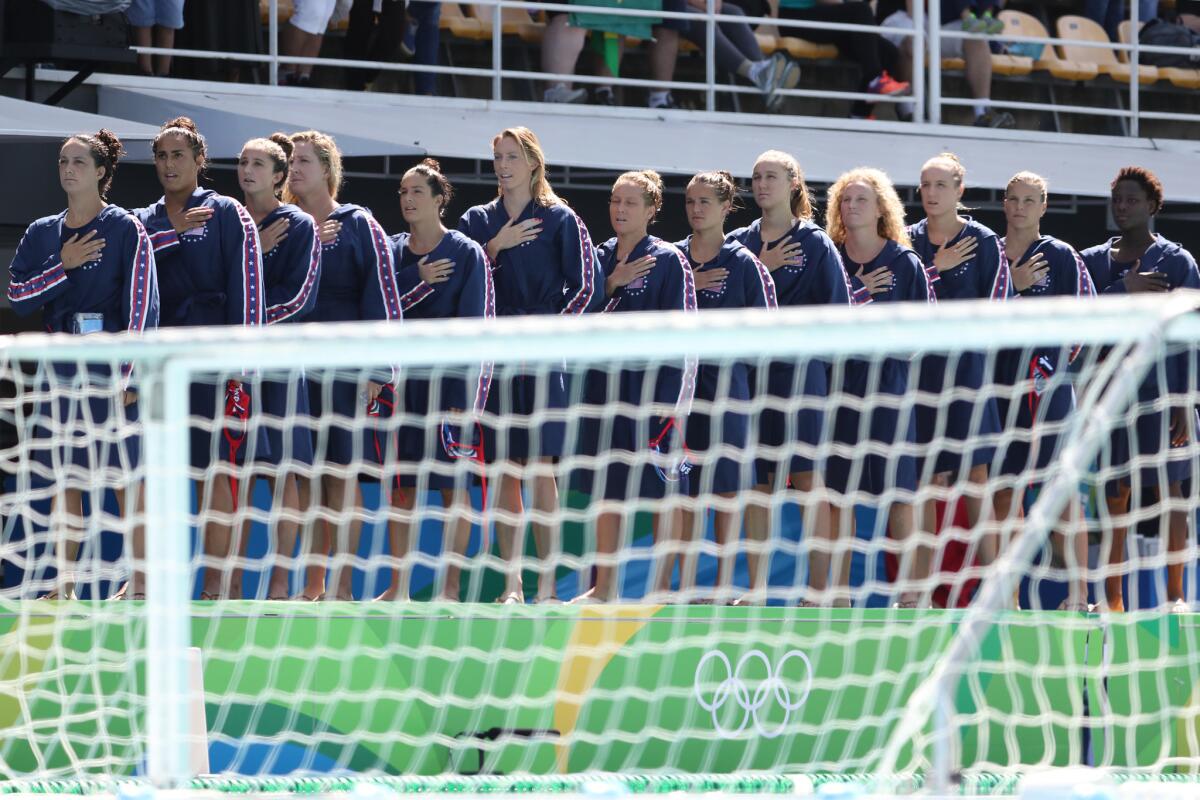
Schedule and results from Friday’s Rio Olympics competition. All times Pacific.
Badminton
Women’s singles gold medal match
Carolina Marin, Spain, d. P. V. Sindhu, India, 2-1
Women’s singles bronze medal match
Nozomi Okuhara, Japan, d. Li Xuerui, China, walkover
Men’s doubles gold medal match
China (H.F. Fu and N. Zhang) d. Malaysia (W.K. Tan and V. S. Goh), 2-1
Basketball (men’s semifinals)
United States 82, Spain 76
Serbia 87, Australia 61
Boxing
Women’s lightweight (60kg)
Gold--Estelle Mossely, France
Silver--Junhua Yin, China
Bronze--Anastasiia Beliakova, Russia
Bronze--Mira Potkonen, Finland
Cycling
Women’s BMX final
Gold--Mariana Pajón, Colombia, 34.09 seconds
Silver--Alise Post, United States, 34.43
Bronze--Stefany Hernandez, Venezuela, 34.75
Men’s BMX finals
Gold--Connor Fields, United States, 34.64
Silver--Jelle van Gorkom, Netherlands, 35.31
Bronze--Carlos Ramirez, Colombia, 35.51
Diving
Men’s 10-Meter platform qualifiers
1. Thomas Daley, Britain, 571.85; 2. Bo Qiu, China, 564.75; 3. Aisen Chen, China, 545.35; 4. David Boudia, United States, 496.55; 5. Benjamin Auffret, France, 470.45; 6. Martin Wolfram, Germany, 468.80; 7. Sascha Klein, Germany, 463.40; 8. Viktor Minibaev, Russia, 462.25; 9. James Connor, Australia, 457.05; 10. Rafael Quintero, Puerto Rico, 456.55; 11. Haram Woo, South Korea, 438.45; 12. German Sanchez, Mexico, 430.05; 13. Hugo Parisi, Brazil, 422.45;
14. Vincent Riendeau, Canada, 419.50; 15. Ivan Garcia, Mexico, 418.90; 16. Nikita Shleikher, Russia, 418.15; 17. Domonic Bedggood, Australia, 413.85;
18. Steele Johnson, United States, 403.75
Equestrian
Individual jumping finals
Gold--Nick Skelton, Great Britain
Silver--Peder Fredricson, Sweden
Bronze--Eric Lamaze, Canada
Field Hockey (women)
Gold medal match
Britain 3, Netherlands 3, (Britain wins 2-0 in shootout)
Bronze medal match
Germany 2, New Zealand 1
Handball (men’s semifinals)
France 29, Germany 28
Denmark 29, Poland 28 (OT)
Modern pentathlon
Women’s combined (running and shooting)
Gold--Chrloe Esposito, Australia, 1,392 points (Olympic record)
Silver--Elodie Clouvel, France, 1,356
Bronze--Oktawia Nowacka, Poland, 1,349
Soccer (women)
Gold medal match
Germany 2, Sweden 1
Bronze medal match
Canada 2, Brazil 1
Synchronized swimming
Teams final
Gold--Russia, 196.1439
Silver--China, 192.9841
Bronze--Japan, 189.2056
Taekwondo
Men’s 80 kilogram
Gold--Cheick Sallah Junior Cisse, Ivory Coast
Silver--Lutalo Muhammad, Britain
Bronze--Oussama Oueslati, Tunisia
Bronze--Milad Beigi Harchegani, Azerbaijan
Women’s 67 kilogram
Gold--Hyeri Oh, South Korea
Silver--Haby Niare, France
Bronze--Ruth Marie Christelle Gbagbi, Ivory Coast
Bronze--Nur Tatar, Turkey
Track and field
Men
400-meter relay
Gold--Jamaica (Asafa Powell, Yohan Blake, Nickel Ashmeade, Usain Bolt, p-Kemar Bailey-Cole, p-Jevaughn Minzie), 37.27
Silver--Japan (Ryota Yamagata, Shota Iizuka, Yoshihide Kiryu, Aska Cambridge), 37.60
Bronze--Canada (Akeem Haynes, Aaron Brown, Brendon Rodney, Andre de Grasse, p-Mobolade Ajomale), 37.64
50-kilometer race walking final
Gold--Matej Tóth, Slovakia, 3:40:58
Silver--Jared Tallent, Australia, 3:41:16
Bronze--Evan Dunfee, Canada, 3:41:38
Women
5,000 meters
Gold--Vivian Jepkemoi Cheruiyot, Kenya, 14:26:17 (Olympic record)
Silver--Hellen Onsando Obiri, Kenya, 14:29:77
Bronze--Almaz Ayana, Ethiopia, 14:33:59
400-meter relay
Gold--United States (Tianna Bartoletta, Allyson Felix, English Gardner, Tori Bowie, Morolake Akinosun), 41.01
Silver--Jamaica (Christania Williams, Elaine Thompson, Veronica Campbell-Brown, Shelly-Ann Fraser-Pryce, Simone Facey, Sashalee Forbes), 41.36
Bronze--Britain (Asha Philip, Desiree Henry, Dina Asher-Smith, Daryll Neita), 41.77
20-kilometer race walking
Gold--Hong Liu, China, 1:28:35
Silver--Maria Guadalupe Gonzalez, Mexico, 1:28:37
Bronze--Xiuzhi Lu, China, 1:28:42
Volleyball (men’s semifinals)
Italy 3, United States 2 (30-28, 26-28, 9-25, 25-22, 15-9)
Brazil 3, Russia 0 (25-21, 25-20, 25-17)
Water polo (women)
Gold medal match
United States 12, Italy 5
Bronze medal match
Russia 19, Hungary 18
China 10, Brazil 5 (seventh place)
Spain 12, Australia 10 (fifth place)
Wrestling
Men’s freestyle 57 kg
Gold--Vladimer Khinchegashvili, Georgia
Silver--Rei Higuchi, Japan
Bronze--Haji Aliyev, Azerbaijan
Bronze--Hassan Sabzali Rahimi, Iran
Men’s freestyle 74 kg
Gold--Hassan Aliazam Yazdanicharati, Iran
Silver--Aniuar Geduev, Russia
Bronze--Soner Demirtas, Turkey
Bronze--Jabrayil Hasanov, Azerbaijan
- Share via
As his story unravels, Ryan Lochte apologizes for ‘not being more careful and candid’

Ryan Lochte apologized Friday for his role in an altercation at a gas station near Olympic Park and for “not being more careful and candid” in how he described the incident.
Lochte, the 12-time Olympic medalist, initially gave a dramatic account of being robbed at gunpoint along early Sunday morning along with three other U.S. swimmers.
The story unraveled Thursday when Brazilian authorities said it was fabricated and the four swimmers instead damaged a bathroom at a gas station. They were detained by security guards, one of whom pulled a gun to prevent them from leaving, until the athletes paid about $50 in dollars and reals to resolve the matter.
“It’s traumatic to be out late with your friends in a foreign country -- with a language barrier -- and have a stranger point a gun at you and demand money to let you leave,” Lochte’s three-paragraph statement posted on his Twitter account said, “but regardless of the behavior of anyone else that night, I should have been much more responsible in how I handled myself and for that I am sorry to my teammates, my fans, my fellow competitors, my sponsors and the hosts of this great event.
“I am very proud to represent my country in Olympic competition and this was a situation that could and should have been avoided. I accept responsibility for my role in this happening and have learned some valuable lessons.”
Lochte’s statement followed the U.S. Olympic Committee’s apology to Brazil late Thursday for the behavior of the swimmers and USA Swimming promising a “thorough” review of the incident.
Rio 2016 spokesman Maria Andrada accepted Lochte’s apology, but said Brazilians felt humiliated by the situation.
“Understand that the Brazilian population was quite disappointed in the actions and the facts,” Andrada said during his daily news conference. “I think that the Brazilian population will accept his apologies and we want to put this matter to an end and I don’t see this as a fact that will mark these Games.”
Mark Adams, spokesman for the International Olympic Committee, called the apology “entirely appropriate.”
Earlier Friday, two of Lochte’s teammates, Gunnar Bentz and Jack Conger, returned to the U.S. after being prevented from leaving Brazil 24 hours earlier.
Fernando Veloso, head of Rio de Janeiro’s civil police, said Bentz and Conger gave statements to police Thursday that contradicted Lochte’s account.
The fourth swimmer involved, Jimmy Feigen, remains in Brazil. He reached agreement to pay a fine of 35,000 reals, about $10,800, for falsely reporting a crime, according to a statement from Judge Tula Correa de Mello. The money will go to a local charity. A judge previously barred Feigen from leaving the country; his passport will be returned and he’ll be free to depart when the money is received.
Veloso has left open the possibility that Lochte, who returned to the U.S. on Monday, could face charges, saying “there’s very strong evidence that at least one of the swimmers, Ryan Lochte, made a false police report.”
The swimmers previously claimed in a statement issued by the USOC that they were robbed by armed men posing as police officers while traveling by taxi from France’s hospitality venue to the Olympic Village early Sunday morning. Lochte told NBC News earlier this week that one of the robbers put a gun to his head and cocked it.
Police said it wasn’t true.
USOC Chief Executive Scott Blackmun called the behavior of the four athletes “not acceptable” in a statement.
“We apologize to our hosts in Rio and the people of Brazil for this distracting ordeal in the midst of what should rightly be a celebration of excellence,” Blackmun said.
In a separate statement, USA Swimming Chief Executive Chuck Wielgus said, “That this is drawing attention away from Team USA’s incredible accomplishments in the water and by other athletes across the Olympic Games is upsetting. The athletes and their remarkable stories should be the focus.”
Eduardo Paes, Rio de Janeiro’s mayor, told reporters Friday that he pitied the four swimmers because of their “character flaws.” The mayor added that he didn’t believe the swimmers were representative of the more than 550 U.S. athletes competing in the Games.
- Share via
Read Ryan Lochte’s apology for his actions in Rio
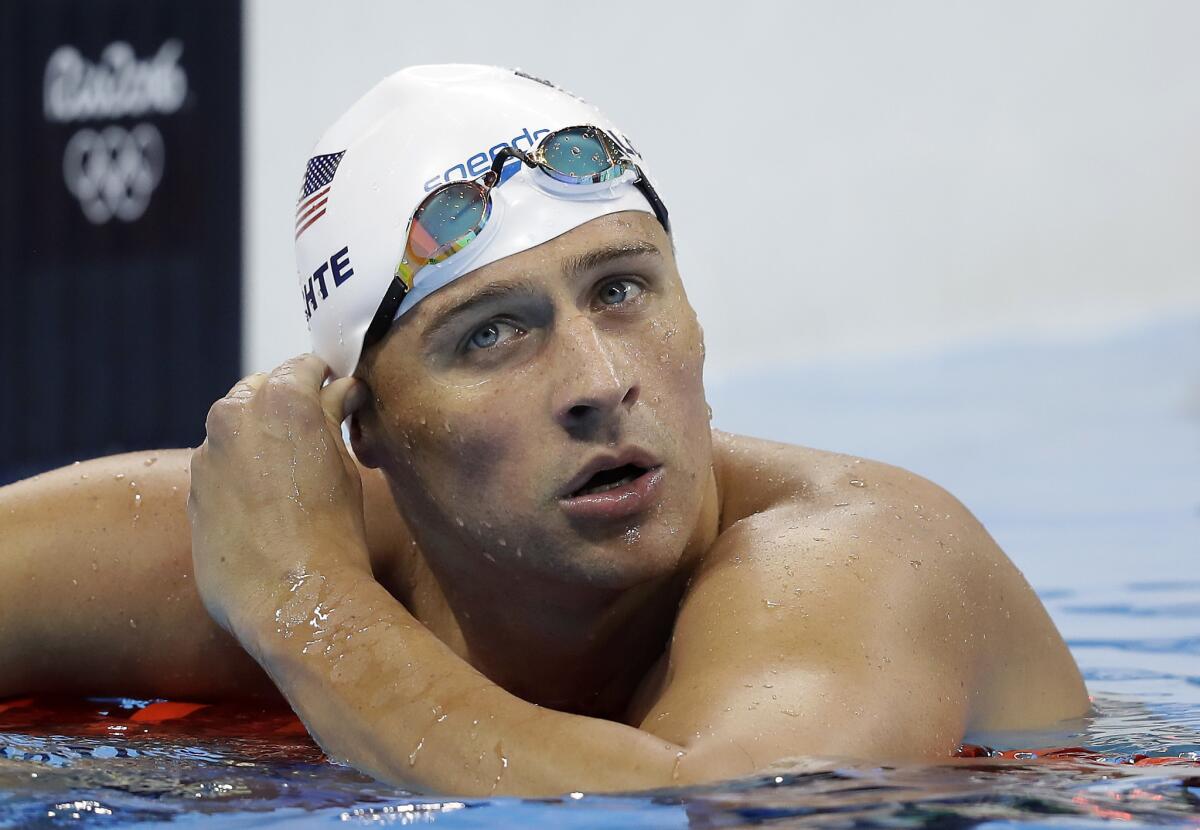
Ryan Lochte, at the center of controversy for making up a story about being robbed at gunpoint in Rio de Janeiro, tweeted an apology on Friday morning for “not being more careful and candid in how I described the events”.
You can read his full apology below and keep up with continuing developments on Lochte, his teammates and the actions in Rio here.
- Share via
For some athletes, it’s a tough decision to stay when they’re eliminated from competition

I know some athletes in other sports are already back in the States. In London, a lot of the boxers left early after they lost. But all of our athletes are staying for the duration this time around, which is nice.
— Julie Goldsticker, press officer for USA Boxing
It was moving day at the Olympic village Thursday, and Michelle Carter had more than just a gold medal to pack.
“I was going to take this to the post office,” she said, clutching at the blue-and-green bedsheet she had tried to mail home. “But they don’t have a box big enough.”
Carter, the women’s shot put champion, was leaving Rio de Janeiro four days before Sunday’s closing ceremony. And she isn’t the only U.S. athlete who has decided to exit early.
The Americans came into these Olympics with more than 550 athletes, the largest delegation in the Rio Games. But nearly half of them have already left.
- Share via
Column: There are many ways this story could have gone, and wrong was the one
You’re a media hound who suddenly has a story to tell, not the true but cowardly story of entitled American athletes breaking stuff, but a story that would make you seem tough and hip.
— Bill Plaschke
So you’re Ryan Lochte (heaven forbid), you’re an Olympic star with a dozen medals, you’re a cool cat with bluish hair and a wry smile, and you’re returning from a night in Rio with three Olympic teammates.
Someone orders the cab driver to pull into a Shell gas station so someone can use the bathroom, but then everyone allegedly destroys the bathroom, breaking a door, busting a soap dispenser and tearing down a poster.
Your band of idiots returns to the cab without apology or explanation, and is prepared to drive to the Olympic Village when a security guard intervenes. The guy wants everyone to pay for the damages, a couple of your fools try to run, a gun is pulled and your boorish bunch finally shells out the equivalent of $50 and drives away unharmed.
So you’re Ryan Lochte and you’re embarrassed, but by the time you return to the Olympic village, you’re also inspired.
You blame it on Rio. You say you were yet another victim of the lawless Brazilian streets. You claim you were robbed at gunpoint by men posing as Rio policemen. You even mention somebody putting a gun to your head, because what’s more gangster than that?
- Share via
Usain Bolt wins 200, completes third straight Olympic sprint double
Although rivals are nipping at Usain Bolt’s golden heels and he grumbled last week that his schedule at the Rio Olympics was too hectic for him to run world-record times, the lanky Jamaican sprinter remains unequaled at producing stunning performances on the most momentous of occasions.
Bolt reaffirmed his place in sports history Thursday at Olympic Stadium by winning the men’s 200-meter dash and becoming the only man to win the 100- and 200-meter races in three straight Olympics. His time of 19.78 seconds wasn’t the sub-19 time he had been hoping for, but it was enough for him to defeat Andre De Grasse of Canada (20.02 seconds) and Christophe Lemaitre of France (20.12). LaShawn Merritt of the U.S., the bronze medalist in the 400, finished sixth in 20.19 seconds.
It was the second medal in these Games for De Grasse, who competed for USC and was an NCAA champion. He won bronze in the 100, and in the 200 semifinals cheekily pushed Bolt into running a faster time than Bolt had planned. But Bolt had plenty of energy left Thursday and turned the evening into a historic occasion.
Loose enough before the race to do a little samba while waiting to be introduced, Bolt ran confidently on the damp track as a light rain fell and never seemed threatened. He’s still pursuing a triple-triple of wins in the 100, 200 and 400-meter relay in three straight Games. The relay final will take place Friday.
- Share via
Ashton Eaton wins second consecutive gold medal in decathlon
Ashton Eaton has defended his Olympic decathlon title, equaling the Games record with a surge on the last lap of the 1,500 meters — the last event in the two-day competition.
The 28-year-old American finished with 8,893 points to match the Olympic mark set by Roman Sebrle of the Czech Republic in 2004.
Kevin Mayer of France was 59 points behind to take silver and Damian Warner of Canada took bronze with 8,666 points.
- Share via
U.S. men win gold and silver in shot put
Ryan Crouser won the shot put gold medal with an Olympic record 22.52 meters, leading world champion Joe Kovacs in a 1-2 finish for the United States.
The 23-year-old Crouser recorded the three best throws of his career, starting with 22.22 on his second attempt to take an early lead and improving it to 22.26 before his biggest attempt of the night on his fifth put.
Kovacs, who had the season-leading mark heading into the final, took silver at 21.78 and world indoor champion Tom Walsh of New Zealand won bronze at 21.36.
Tomasz Majewski, who won the Olympic gold for Poland in 2008 and 2012, was a distant sixth with a mark of 20.72 after opening with two fouls.
- Share via
So far, Ryan Lochte still seems to be golden to his sponsors
Ryan Lochte may have hightailed it out of Rio de Janeiro in the wake of his much-disputed tale of being a victim of an armed robbery, but his sponsors haven’t abandoned the 12-time Olympic medalist.
A Speedo spokesman confirmed Thursday that the now-notorious swimmer continues to be sponsored by the swimwear brand. As for whether they will stand by him, the spokesman said: “Speedo is following the situation, and has a policy not to comment on ongoing legal investigations.”
A Ralph Lauren spokesman said Thursday: “We are working closely with the [U.S. Olympic Committee] on the developments in Rio and are reviewing the situation.”
The four-time Olympian sparked an international firestorm Sunday, after claiming that he and teammates Gunnar Bentz, Jack Conger and Jimmy Feigen were pulled over and robbed by gun-toting men posing as police officers while on their way back to the Olympic Village after a night of drinking. Lochte has since retracted some of that storyline and Rio de Janeiro police claim he and his three fellow swimmers lied about the incident and vandalized a restroom in a gas station.
- Share via
U.S. women defeat France, 86-67, to reach the gold-medal game
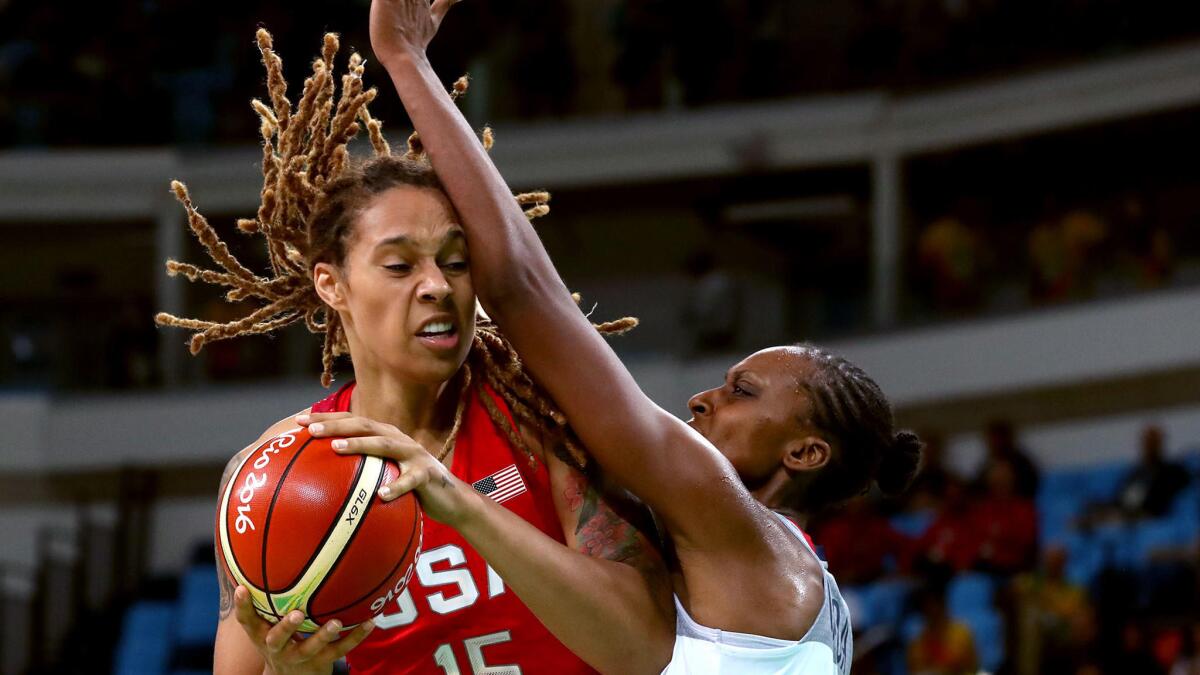
Team USA captain Sue Bird missed Thursday’s semifinal because of a right knee injury, but that did not much matter for the United States, which advanced to Saturday’s gold-medal game with a 86-67 victory over France on Thursday.
The United States led by just four at halftime but turned up the defensive intensity out of the locker room and outscored France 25-8 in the third quarter.
Diana Taurasi had 18 points for the United States while Maya Moore added 15.
- Share via
Rio police say American swimmers’ story of robbery is a fabrication
The story that Ryan Lochte told four days ago was frightening and detailed, the Olympic gold medalist recalling a late-night robbery and a pistol pressed against his head.
On Thursday, Brazilian authorities presented evidence they say contradicts that account and could turn what at first had been a deeply embarrassing incident for the Summer Games’ host country into a different kind of international incident.
The head of Rio de Janeiro’s civil police, Fernando Veloso, said the version of the events told by Lochte and three U.S. swimming teammates was fabricated. The athletes, he said, damaged a gas station bathroom early Sunday morning and were involved in a confrontation with armed security before paying about $50 to resolve the matter.
“We can confirm that there was no robbery as they described, and they were not victims as they presented themselves,” Veloso told a packed news conference, alleging the athletes had given “a fantastical version of events.”
Contrary to reports, Veloso said none of the swimmers have been indicted.
- Share via
U.S. women’s relay team makes most of second chance, advances to final
The U.S. women’s 400-meter relay team, given a second chance to reach the Rio Olympic final after successfully appealing its disqualification from its first-round heat, got the baton around the track safely in a rerun Thursday night and earned a chance to compete for a gold medal in Friday’s final.
The team of Tianna Bartoletta, Allyson Felix, English Gardner and Morolake Akinosun had been disqualified from its heat Thursday morning after Felix was bumped by Brazil’s Kauiza Venancio and was thrown off stride, causing her to make a faulty exchange to Gardner. The baton fell and Gardner picked it up, on Felix’s urging, and they finished the race. However, they and the Brazilian teams were disqualified. USA Track and Field officials sought relief from a Jury of Appeals on the basis that Felix had been impeded; the jury agreed and granted the rerun.
The same four athletes ran in the same order, but they were the only runners on the track. Their handoffs were fine and they were timed in 41.77 seconds, the top qualifying time. However, because they earned the spot in a rerun they are considered to have qualified for the final on time and will run in Lane 1 or Lane 8 instead of a prime middle lane. China timed at 42.70 seconds — a few hundredths behind Canada — and was dropped out of the field for the final.
Gardner said it felt odd to be on the track, in Lane 2, with no other runners out there.
“Honestly I feel like it was a glorified practice. We just had fun out there,” Gardner said. “We were laughing and joking going in, staying light, and that was the whole point. We already knew we were going to execute the first time — it was just that we had an unforeseen circumstance. Now, all we had to do is the same thing and the same plan that we had the first time — just get out there and absolutely execute it.”
Felix said the experience was “different. It was really weird. But I think when we walked out and people were cheering for us, I think it uplifted us a little bit, encouraged us. We’re just grateful.”
Felix, a seven-time Olympic medalist, also said she had never been in a situation like that. “I think that anyone who’s impeded, I think the process was fair,” Felix said.
Gardner said she wished the best of luck to the Chinese sprinters, who are now out of the final. “It’s unfortunate, what happened,” she said. “I wish that it didn’t happen this way and that we were able to basically all compete because we all worked so hard to get here and those girls worked so hard to run the relay and they missed out on the opportunity. My heart is heavy for them but the protest ruled that we were able to run off and we got the opportunity and we seized it.”
- Share via
A day of upsets and suspensions continues in Rio, from BMX to combat sports
The U.S. women’s volleyball team losing a semifinal and American wrestler Helen Maroulis defeating three-time gold medalist Saori Yoshida of Japan aren’t the only big upsets Thursday in Rio.
Two top BMX racers and two top-seeded taekwondo competitors also were eliminated from the Summer Games.
Two-time gold medalist Maris Strombergs of Latvia and reigning world champion Joris Daudet of France failed to advance out of their BMX quarterfinals.
Strombergs’ coach, Ivo Lakucs, says Strombergs had decided before the Olympics that this would be it. Lakucs says the disappointing result Thursday wouldn’t change Strombergs’ mind.
In taekwondo, Turkey’s defending Olympic champion Servet Tazegul was beaten, 19-6, by Russia’s Alexey Denisenko in their quarterfinal in the men’s 68-kilogram division. Second-seeded Dae-Hoon Lee of South Korea went out shortly afterward in a closely fought battle with Jordan’s Ahmad Abughaush.
Both Tazegul and Lee might have the chance to fight in the repechage competition for a bronze medal Thursday evening.
And then there was news that the International Canoe Federation suspended canoe sprint bronze medalist Serghei Tarnovschi of Moldova after he failed a pre-competition doping test while a Chinese swimmer and Brazilian road cyclist have been disqualified from the Olympics after failing doping tests.
The 19-year-old Tarnovschi was due to compete in the 1,000-meters double on Friday with his older brother Oleg. The ICF said he would “now no longer be eligible and will face provisional suspension” under anti-doping rules.
The Court of Arbitration for Sport issued final verdicts Thursday in the cases of swimmer Chen Xinyi and cyclist Kleber Ramos.
- Share via
Helen Maroulis wins first gold ever for a U.S. women’s wrestler
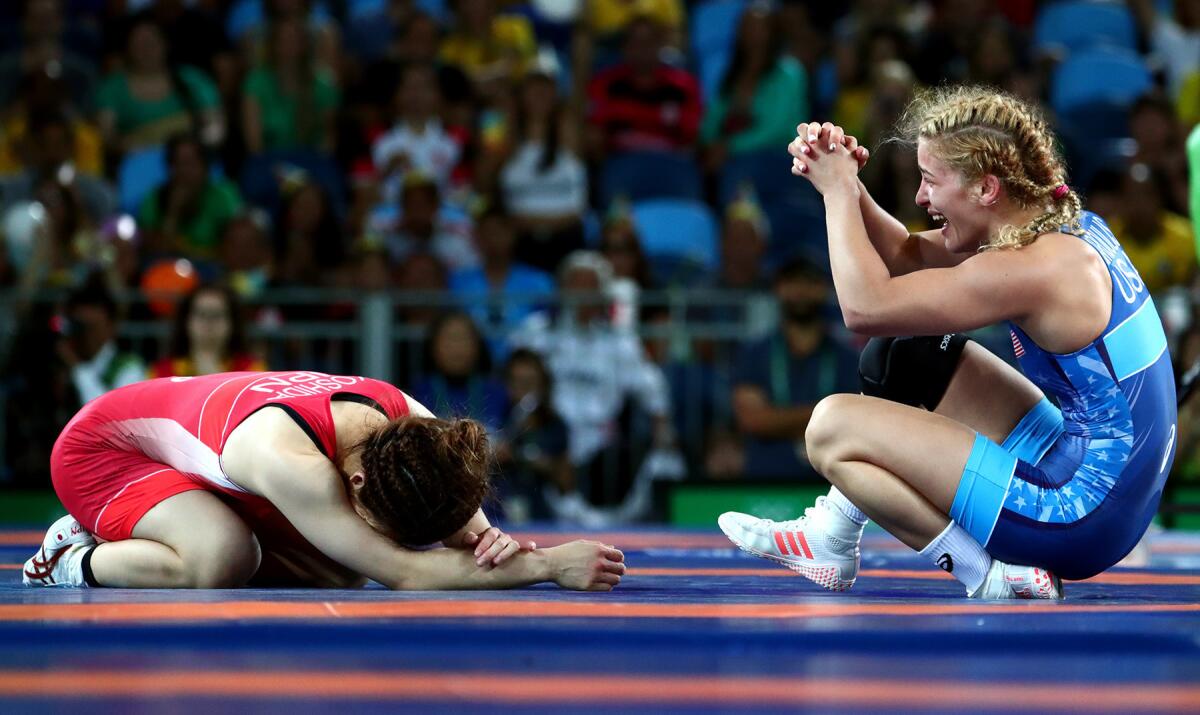
Helen Maroulis of the United States defeated Japan’s Saori Yoshida 4-1 in the 53-kilogram freestyle final to win the first-ever gold medal for an American women’s wrestler.
Maroulis celebrated Thursday’s win by running around the mat in a circle and holding the United States flag with both hands while it was draped over her back.
Yoshida was a 16-time world champion who was going for her fourth gold. She hadn’t lost in a major tournament in years, but she had been less dominant in recent tournaments. Maroulis was on a two-year win streak of her own.
Yoshida was trying to become the second woman to ever win four Olympic gold medals in a single event across four Summer Games, and the second wrestler to win four Olympic golds. Yoshida’s teammate, Kaori Icho, accomplished the feats Wednesday by winning the 58-kilogram gold.
- Share via
Top-ranked U.S. women upset in volleyball semifinal by Serbia
Serbia has stunned the top-ranked U.S. women’s volleyball team that was chasing its first-ever Olympic gold.
With star player Foluke Akinradewo injured early, the Americans came back from a 2-1 deficit to force a fifth set before falling 15-13.
Serbia won the five-set match, 20-25, 25-17, 25-21, 16-25, 15-13, on Thursday — handing the U.S. its first defeat in Rio.
Akinradewo’s teammates took over after she hurt her left knee late in the opening set.
With two-time defending Olympic champion Brazil also ousted in a five-setter by China in the quarterfinals, Serbia will now face either the young Chinese squad led by former U.S. coach Jenny Lang Ping or the surprising Netherlands team, which is back in the Olympic volleyball competition for the first time in 20 years.
- Share via
Thursday’s Rio Olympics schedule and results
Schedule and results from Thursday’s Rio Olympics competition. All times Pacific.
Badminton
Women’s doubles
Gold medal match
Japan (A. Takahashi and M. Matsutomo) d. Denmark (K.R. Juhl and C. Pedersen), 2-1
Bronze medal match
South Korea (S.C. Shin and K.E. Jung) d. China (Y.N. Tang and Y. Yu), 2-0
Men’s doubles
Bronze medal match
Great Britain (M. Ellis and C. Langridge) d. China (B. Chai and W. Hong), 2-1
Basketball (women’s semifinals)
Spain 68, Serbia 54
United States 86, France 67
Beach volleyball
Men’s gold medal match
Cerutti Alison and Oscar Schmidt Bruno, Brasil def. Nicolai Paolo and Lupo Daniele, Italy, 21-19, 21-17
Men’s bronze medal match
Alexander Brouwer and Robert Meeuwsen, Netherlands, def. Konstantin Semenov and Viacheslav Krasilnikov, Russia, 23-21, 22-20
Boxing
Men’s light-heavyweight gold medal match
Julio César La Cruz, Cuba, d. Adilbek Niyazymbetov, Kazakhstan, 3-0
Canoe/Kayak
Men’s canoe 1,000-meter sprint
Gold--Germany (M. Rendschmidt and M. Gross), 3:10.78
Silver--Serbia (M. Tomićević and M. Zorić), 3:10.96
Bronze--Australia (L. Tame and K. Wallace), 3:12.59
Men’s canoe single 200-meter sprint
Gold--Yuriy Cheban, Ukraine, 39.27 seconds
Silver--Valentin Demyanenko, Azerbaijan, 39.49
Bronze--Isaquias Queiroz dos Santos, Brazil, 39.62
Men’s kayak double 200-meter sprint
Gold--Spain (S. Craviotto Rivero and C. Toro Carballo), 32.07 secondsfield
Silver--Great Britain (L. Heath and J. Schofield), 32.36
Bronze--Lithuania (E. Ramanauskas and A. Lankas), 32.38
Women’s kayak single 500-meter sprint
Gold--Danuta Kozák, Hungary, 1:52.49
Silver--Emma Jørgensen, Denmark, 1:54.32
Bronze--Lisa Carrington, New Zealand, 1:54.37
Diving
Women’s 10-meter platform final
Gold--Qian Ren, China
Silver--Yajie Si, China
Bronze--Meaghan Benfeito, Canada
Field hockey (men)
Gold medal match
Argentina 4, Belgium 2
Bronze medal match
Germany 1, Netherlands 1 (Germany wins in shootout)
Handball (women’s semifinals)
France 24, Netherlands 23
Russia 38, Norway 37
Sailing
Women’s 470 dinghy
Gold--Great Britain (H. Mills and S. Clark), 44 points
Silver--New Zealand (J. Aleh and O. Powrie), 54
Bronze--France (H. Defrance and C. Lecointre), 62
Men’s 470 dinghy
Gold--Croatia (Š. Fantela and I. Marenić), 43 points
Silver--Australia (W. Ryan and M. Belcher), 58
Bronze--Greece (P. Mantis and P. Kagialis), 58
Men’s 49er skiff
Gold--New Zealand (P. Burling and B. Tuke), 35 points
Silver--Australia (N. Outteridge and I. Jensen), 78
Bronze--Germany (E. Heil and T. Plössel), 83
Women’s 49er skiff
Gold--Brazil (M. Grael and K. Kunze), 48 points
Silver--New Zealand (M. Meech and A. Maloney), 51
Bronze--Denmark (K. Salskov-Iversen and J. Hansen), 54
Taekwondo
Men’s 68 kilogram
Gold--Ahmad Abughaush, Jordan, def. Alexey Denisenko, Russia, 10-6
Bronze--Joel Gonzalez Bonilla, Spain, def. Edgar Contreras, Venezuela, 4-3
Bronze--Lee Daehoon, South Korea, def. Jaouad Achab, Belgium, 11-7
Women’s 57 kilogram
Gold--Jade Jones, Britain, def. Eva Calvo Gomez, Spain, 16-7.
Bronze--Hedaya Wahba, Egypt, def. Raheleh Asemani, Belgium, 1-0
Bronze-- Kimia Alizadeh Zenoorin, Iran, def. Nikita Glasnovic, Sweden, 5-1
Track and Field
Men
200 meters
Gold--Usain Bolt, Jamaica, 19.78.
Silver--Andre de Grasse, Canada, 20.02.
Bronze--Christophe Lemaitre, France, 20.12.
400-meter hurdles
Gold--Kerron Clement, United States, 47.73 seconds
Silver--Boniface Mucheru, Kenya, 47.78
Bronze--Yasmani Copello, Turkey, 47.92
Shotput
Gold--Ryan Crouser, United States, (22.52), 73-10 1-2.
Silver--Joe Kovacs, United States, (21.78), 71-5 1-2.
Bronze--Tomas Walsh, New Zealand, (21.36), 70-1.
Decathlon
Gold--Ashton Eaton, United States, 8893 points
Silver--Kevin Mayer, France, 8834
Bronze--Damian Warner, Canada, 8666
Women
Javelin Throw
Gold--Sara Kolak, Croatia, (66.18), 217-1 1-2.
Silver--Sunette Viljoen, South Africa, (64.92), 212-12.
Bronze--Barbora Spotakova, Czech Republic, (64.80), 212-7 1-4.
Triathlon
Men’s final
Gold--Alistair Brownlee, Great Britain, 1:45:01
Silver--Jonny Brownlee, Great Britain, 1:45:07
Bronze--Henri Schoeman, South Africa, 1:45:43
Volleyball (women’s semifinals)
Serbia 3, United States 2 (20-25, 25-17, 25-21, 16-25, 15-13)
China 3, Netherlands 1, (27-25, 23-25, 29-27, 25-23)
Water polo (men)
Classification round
Hungary 13, Brazil 4
Greece 9, Spain 7
Semifinals
Croatia 12, Montenegro 8
Serbia 10, Italy 8
Wrestling
Women’s freestyle 53 kilogram
Gold--Helen Louise Maroulis, United States
Silver--Saori Yoshida, Japan
Bronze--Natalya Sinishin, Azerbaijan
Bronze--Sofia Magdalena Mattsson, Sweden
Women’s freestyle 63 kilogram
Gold--Risako Kawai, Japan
Silver--Maryia Mamashuk, Belarus
Bronze--Yekaterina Larionova, Kazakhstan
Bronze--Monika Ewa Michalik, Poland
Women’s freestyle 75 kilogram
Gold--Erica Elizabeth Wiebe, Canada
Silver--Guzel Manyurova, Kazakhstan
Bronze--Fengliu Zhang, China
Bronze--Ekaterina Bukina, Russia
- Share via
India finally wins a medal at Rio Olympics
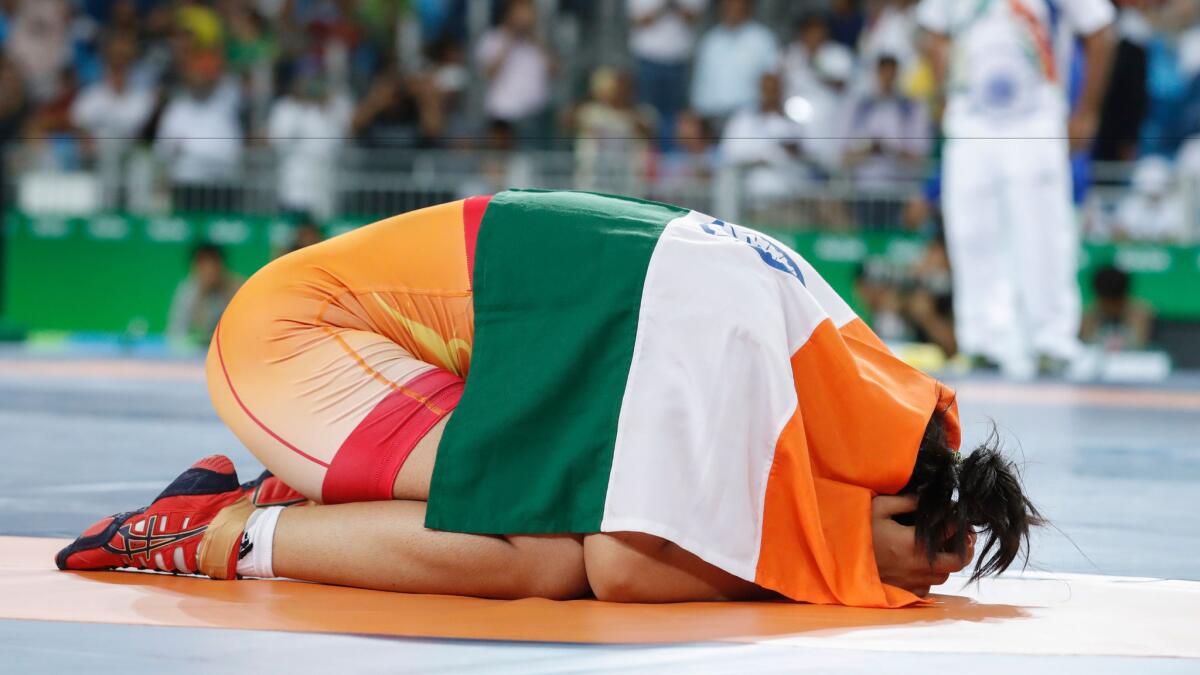
By winning a bronze medal in wrestling, 23-year-old Sakshi Malik helped India avoid a potentially embarrassing Olympic blackout.
The nation of 1.25 billion people awoke Thursday to the news that Malik had earned a place on the podium in the 58-kilogram category, the first medal for India at the Games in Rio de Janeiro.
“The entire nation is rejoicing,” Prime Minister Narendra Modi tweeted.
- Share via
AIBA fights to quell boxing controversy as Stevenson advances to semifinals for U.S.
In its latest effort to quiet a controversy over disputed judging decisions in the Rio Olympic boxing competition, the International Boxing Assn. on Thursday removed the executive director in charge of the tournament.
Francco Falcinelli, vice president of the AIBA executive board and the chief of the European Boxing Confederation, will oversee the final four days of bouts.
On Wednesday, the AIBA said it had reviewed the decisions in the first 239 Rio bouts and found reason to send an undetermined number of judges home. The BBC and the Guardian reported six judges had been expelled.
Boxers and national team coaches have complained about a number of decisions in the Rio tournament, the most prominent among them Russian Vladimir Nikitin’s unanimous decision over Michael John Conlan of Ireland in a bantamweight quarterfinal Tuesday and Monday’s heavyweight final, in which Russian Evgeny Tischenko won a unanimous decision over Kazakhstan’s Vasiliy Levit.
Nikitin was so beat up in his win he will not be able to answer the bell in Thursday’s semifinal with American Shakur Stevenson, sending Stevenson on to Saturday’s final against Cuba’s Robeisy Ramirez. Stevenson is the first U.S. male to reach a final in Olympic boxing since light-heavyweight Andre Ward in 2004.
Boxing officials were reportedly concerned about the possibility of fixed bouts even before the Rio Games even opened. Some AIBA authorities were so worried, according to the Guardian, they asked the International Olympic Committee to intervene and called for Wu Ching-kuo, the reform-minded president of the AIBA, to resign.
Since the London Games, the AIBA has changed its scoring system, adopting the 10-point must system used by professional boxing with judges awarding a fighter 10 points for each round he wins.
- Share via
Women’s wrestling: Maroulis, Pirozhkova in medal hunt; Gray loses in quarterfinals
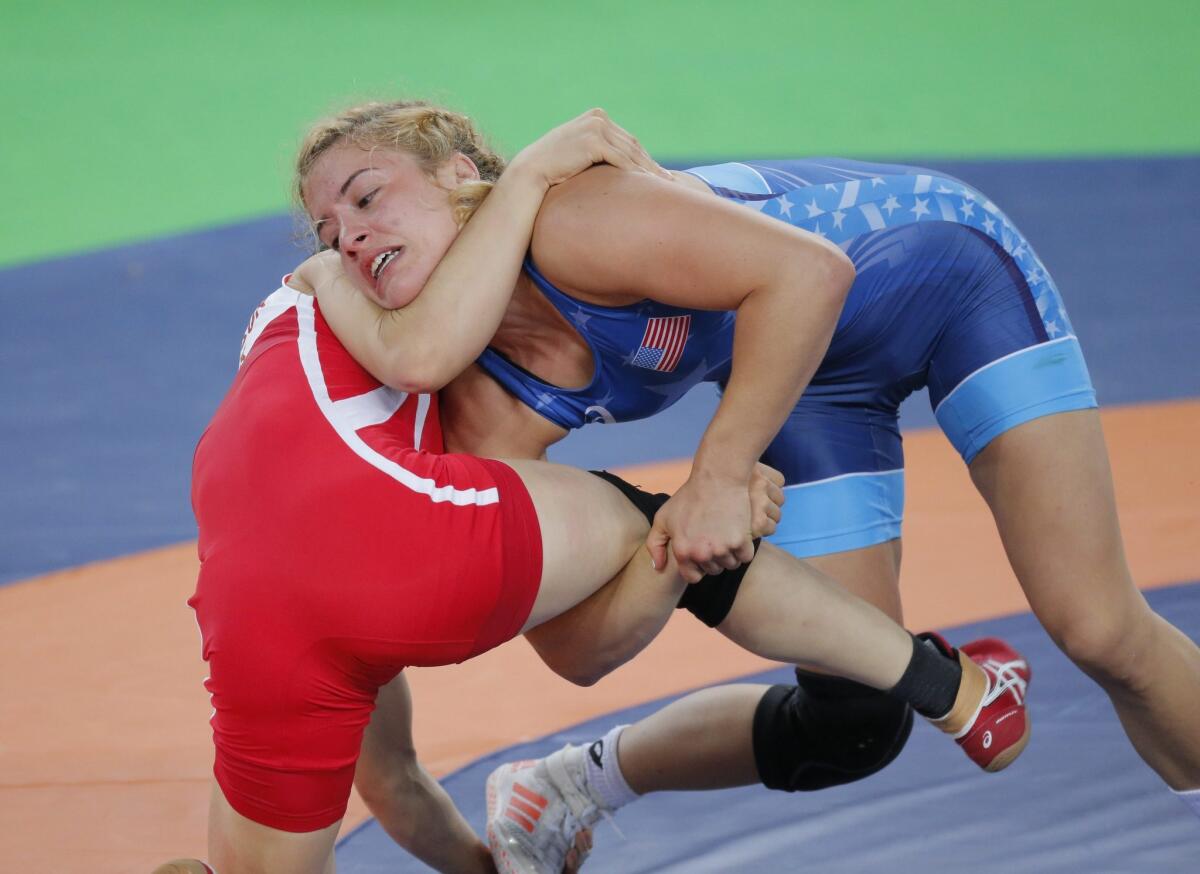
Adeline Gray’s footwear pretty much said it all on Thursday.
Gray, the face of women’s wrestling in the United States, was done much earlier than almost everyone expected at the Olympics, having lost, 4-1, in the quarterfinals of the 165-pound weight class (75 kg) to Vasilisa Marzaliuk of Belarus. It was Gray’s first defeat in more than two years.
“This is going to be something that takes a while to sink in,” Gray said. “I mean, I thought I wasn’t going to be taking my shoes off and now I’m in sandals. It’s definitely a different feeling. I haven’t had a loss in a long time, so I don’t know what it’s supposed to feel like.”
The U.S. team had approached Thursday as a legitimate opportunity to win three medals.
Now it’s down to two: Helen Maroulis will go for gold against Saori Yoshida of Japan in the 117-pound weight class (53 kg) and Elena Pirozhkova has a shot at a bronze medal in the 139-pound weight class (63 kg).
Maroulis and Pirozhkova are roommates in Huntington Beach, training in Orange County under the guidance of Valentin Kalika.
“We came to win gold. Helen has been practicing last few years like never before,” said Kalika. “Every day, at the beach, [working out] in the sand. She is ready for any battle.”
Even against the formidable Yoshida.
“We’ve been talking about beating Yoshida for last few years,” he said. “Again, all of our training was to beat Yoshida….We’ll see what happens tonight. She [Yoshida] is a great wrestler of course. We just got to make sure we’re not giving her [too much] respect.
“I believe mentally she’s ready to beat Yoshida.”
Gray, meanwhile, admitted to making a costly mistake in her match.
“I overlooked that girl,” she said. “You can’t overlook somebody who is a multi-medalist. She’s an Olympic medalist. She has world medals. I beat her nine out of 10 times and today she got the better of me. I got defensive....my passivity game is not great.”
Her future in the sport is unclear.
“No, I totally am not set on another cycle,” said Gray, who was trying to contain her emotions. “I’ve spent three years away from my boyfriend who I would love to spend more time with. This takes so much sacrifice. In these moments, it doesn’t feel like it was worth it. It’s going to take some soul-searching before this kind of sinks in and becomes something I can handle.”
A few months? Longer?
“I might move to New York and figure out my life,” she said.
- Share via
Rio Olympics: U.S women win protest after dropping baton in 400-meter relay and will race again
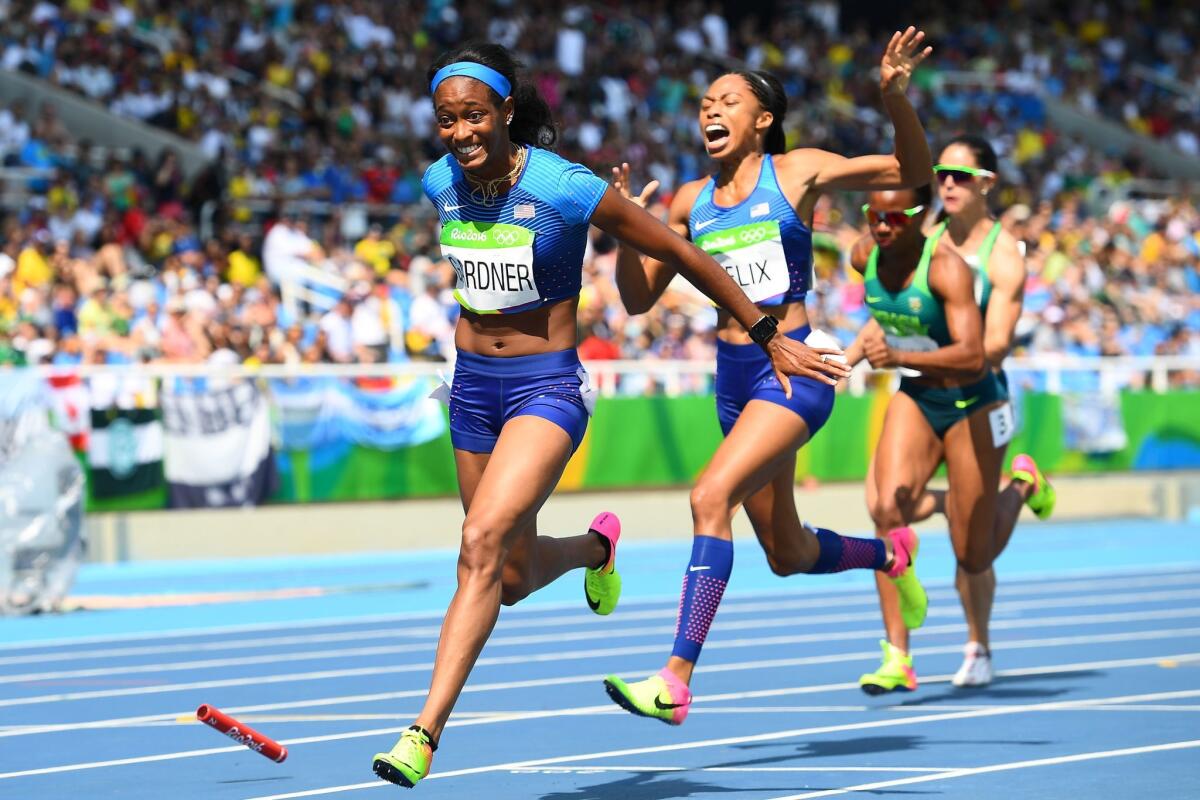
A Jury of Appeals granted a protest by the United States on the outcome of second heat of the women’s 400-meter relay, in which the U.S. relay was disqualified after dropping the baton.
Ruling that the runner had been obstructed by a Brazilian runner at the second exchange (from Allyson Felix to English Gardner) the jury ruled that the U.S. women will rerun the race alone Thursday night. After Thursday’s first heats, China was in eighth place with a time of 42.70 seconds. If the U.S. beats that time, they will advance to Friday’s final.
Brazil was disqualified for obstructing the U.S.
After the race, Felix contended she felt contact from a runner on her right, where Brazil’s relay team was running, as she attempted to pass the baton to Gardner, who was running the third leg of the relay.
“I got bumped coming into the exchange zone, and it just completely threw me off balance,” Felix said. “I tried to hold it together to get it to English.”
Felix said she wasn’t injured, “just very upset.”
The other members of the relay team were Tianna Bartoletta and Morolake Akinosun.
The U.S. men’s 400-meter relay team successfully got the baton around and won its heat in 37.65 seconds to advance to Friday’s final. The relay was comprised of Mike Rodgers, Christian Coleman, Tyson Gay, and Jarrion Lawson.
Soon after the women’s relay incident, Kerron Clement of the U.S. won the men’s 400-meter hurdles in a season-best time of 47.73 seconds. Boniface Mucheru Tumuti of Kenya was second in 47.78 seconds, with Yasmani Copello of Turkey third in 47.92.
Clement, 30, was the silver medalist in the event in the 2008 Beijing Olympics and a two-time world champion.
- Share via
Winning in the ring has helped her out of it
I definitely feel like I’m the best fighter in the world here.
— Claressa Shields
In the ring, Claressa Shields is as direct and imposing as a punch to the jaw, something she wielded with uncommon regularity Wednesday in a unanimous-decision victory over Russian Iaroslava Iakushina in a Rio Olympics middleweight quarterfinal.
The win guarantees her at least a bronze medal, to go with the gold she won as a teenager four years ago in London. She hasn’t lost since the 2012 world championships; with the victory over Iakushina her record is 75-1. Her coaches call her the best boxer in the world, male or female.
“Claressa came out of nowhere,” said associate Coach Kay Koroma, “and now the world loves her because of the way she fights.”
Outside the ring, however, Shields can be as complex and hard to figure as trigonometry.
- Share via
She’s the ‘it’ girl for now, but will that transcend the Olympics?
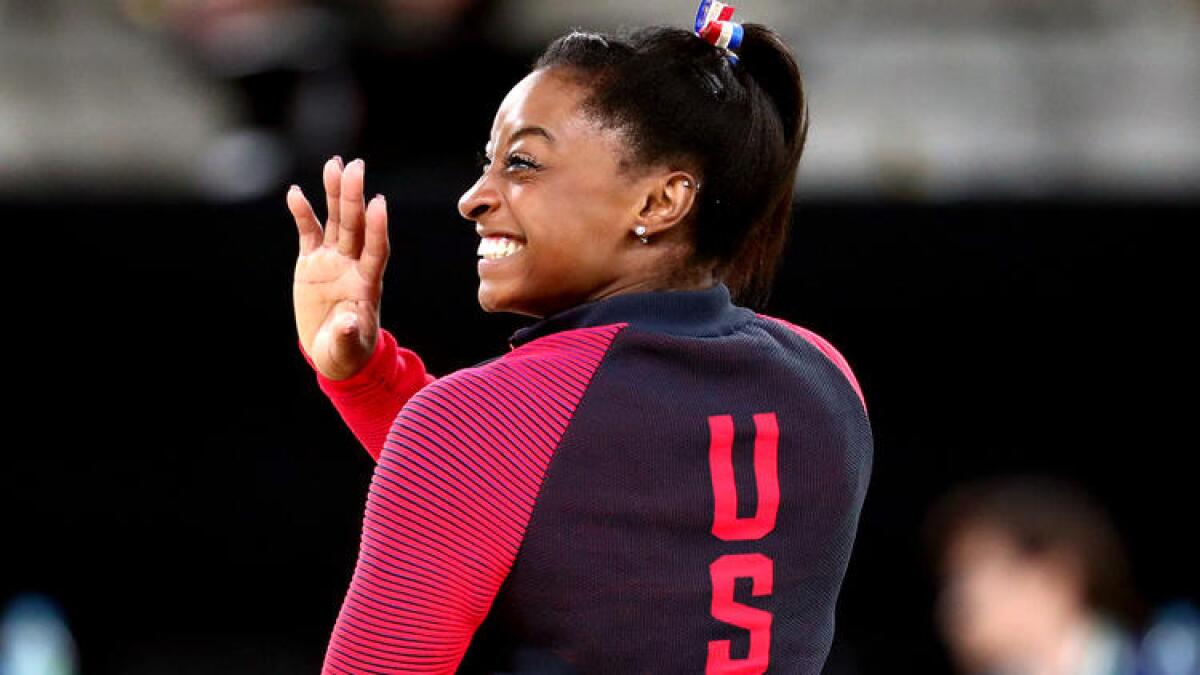
I’m not the next Usain Bolt or Michael Phelps. I’m the first Simone Biles.
— Simone Biles
In a hallway underneath the Rio Olympic Arena, a crush of journalists pushed against the metal fence in front of the world’s best gymnast. Simone Biles, not even 5 feet tall, seemed to be swallowed up by the crowd. She fiddled with the green strap of her credential, but otherwise appeared at ease with another day as one of the most recognizable faces at the Summer Olympics.
“We have an idea of just how big it is back home,” the 19-year-old said.
Biles won four gold medals, including the coveted all-around title, during an adjective-defying week where she made the sport’s most difficult feats look routine. The performance cemented her place as perhaps the most gifted gymnast in history.
She’s so well known that she can’t visit the Christ the Redeemer statue towering over Rio de Janeiro alone. More than a million people have followed her bubbly Instagram account this month. Limited-edition cereal boxes will celebrate her golden achievement.
- Share via
Kerri Walsh Jennings and April Ross win bronze in beach volleyball
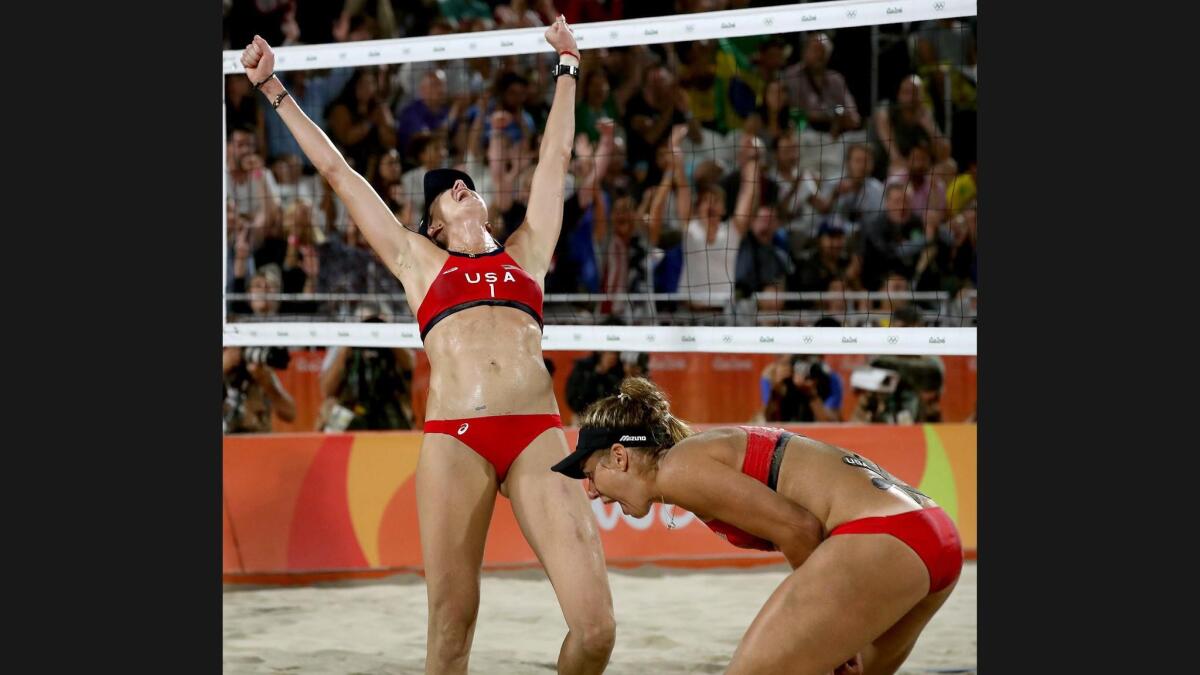
Kerri Walsh Jennings and April Ross have won the beach volleyball bronze medal, coming back after losing the first set to beat the host Brazilians at Copacabana.
The win comes less than 24 hours after Walsh Jennings lost on the Olympic beach for the first time in 27 matches over four Summer Games.
Walsh Jennings, a three-time gold medalist, delivered a pair of blocks for the final two points on Wednesday night to win 17-21, 21-17, 15-9.
Germany’s Laura Ludwig and Kira Walkenhorst won the gold medal, handing the host nation its second straight medal-round setback on the Copacabana sand.
The 21-18, 21-14 victory gave Germany its first medal in women’s beach volleyball, just four years after the German men took the top spot on the Olympic podium in London. Brazil’s Agatha and Barbara, the reigning world champions, took silver.
- Share via
Tianna Bartoletta gets her gold in women’s long jump
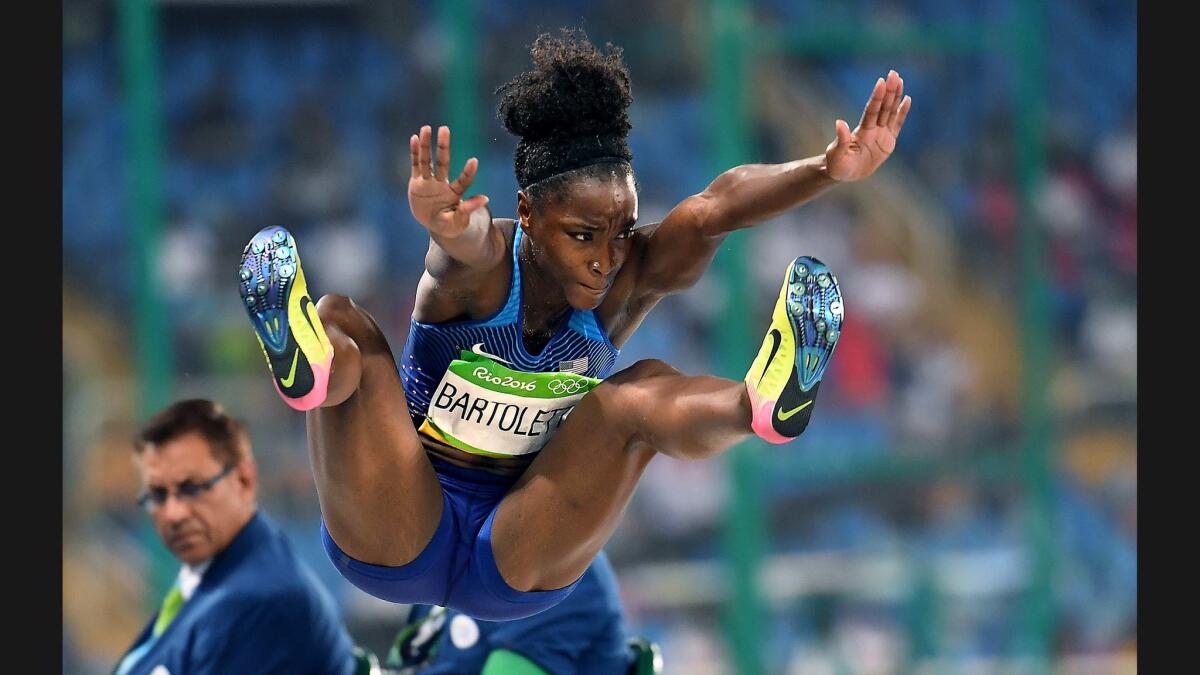
Two-time world champion Tianna Bartoletta finally has an Olympic gold medal, winning the long jump final with a lifetime best 7.17 meters.
The 30-year-old American, who won her world titles a decade apart in 2005 and 2015, responded to two big jumps from Ivana Spanovic and Brittney Reese on the fifth attempt to regain the lead with one round remaining. The lead stood.
Defending Olympic champion Reese of the United States, after three fouls on her first four attempts, took silver Wednesday with a best of 7.15 on her last go.
Spanovic, bronze medalist at the last two world championships, won the Olympic bronze with a Serbian national record of 7.08.
- Share via
More intrigue in Rio as 2 U.S. swimmers pulled off plane
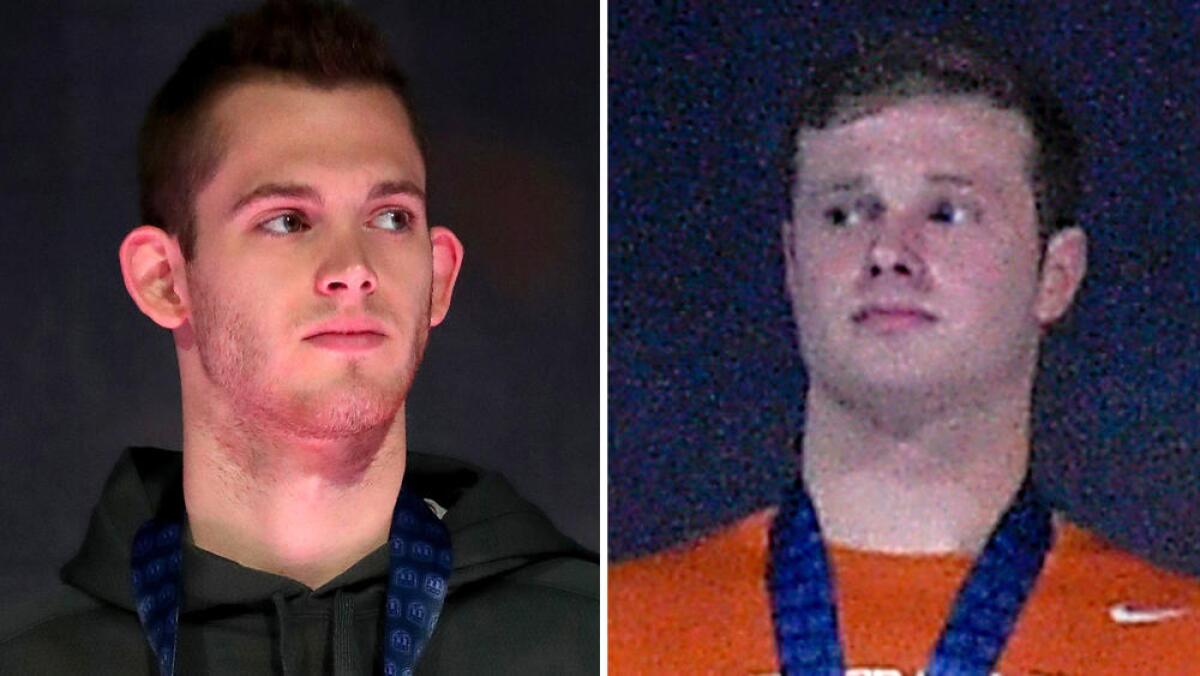
NBC News is reporting that two U.S. swimmers who were in a group with Ryan Lochte that were allegedly mugged in Rio were pulled off a plane at the airport there as they attempted to return to the United States.
According to tweets by NBC national correspondent Peter Alexander, Gunnar Bentz and Jack Conger were on a plane leaving Rio when authorities asked them to deplane and their passports were seized.
- Share via
Brianna Rollins leads U.S. sweep in women’s 100 hurdles; Elaine Thompson completes sprint double
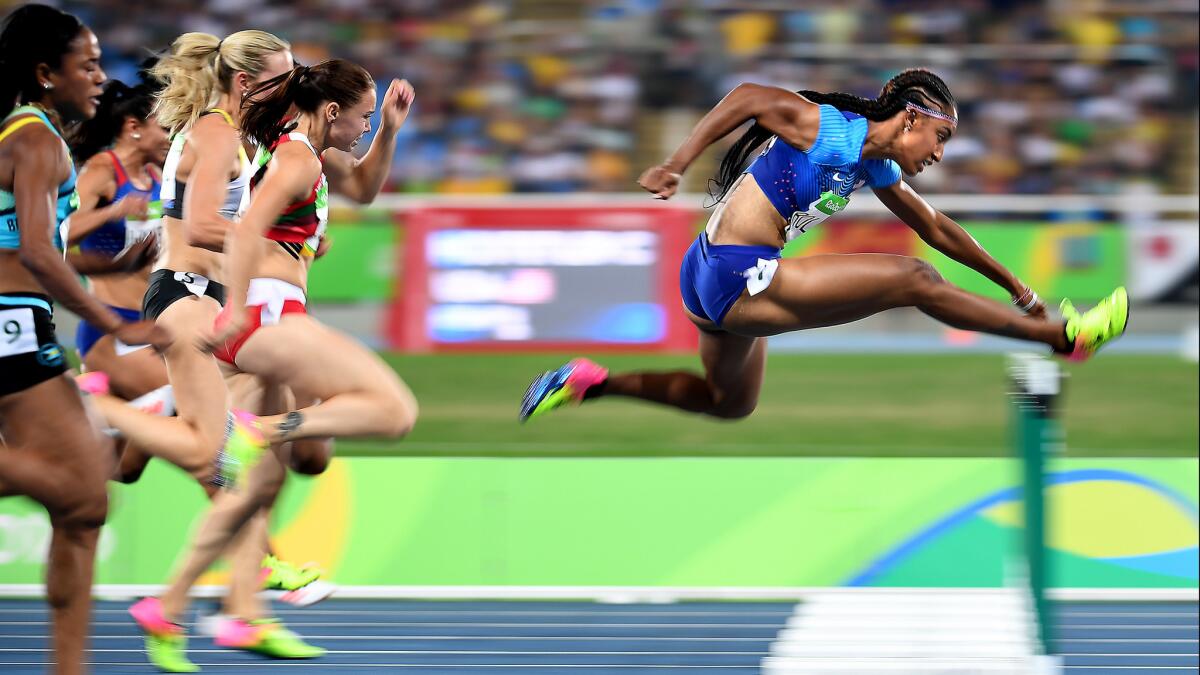
Brianna Rollins, the 2013 world champion, has led an American sweep of the women’s 100-meter hurdles on Wednesday night in Rio.
Rollins clocked 12.48 seconds and was followed by teammates Nia Ali (12.59) and Kristi Castlin (12.61), who edged Britain’s Cindy Ofili (12.63) with a lean at the finish line.
Earlier in the evening, Elaine Thompson got another sprint double for Jamaica. She blasted out of the blocks and never gave Dutch sprinter Dafne Schippers a chance to catch her on the straightaway of the 200 meters.
After winning the 100 on Saturday, Thompson now has a double that compatriot Usain Bolt has specialized in. Thompson can make it triple gold during the relay races Thursday and Friday.
Thompson ended in a season’s best 21.78 seconds, for an edge of .10 over Schippers. Tori Bowie of the United States took bronze with 22.15.
- Share via
Japan’s Kaori Icho becomes first wrestler to win gold medals in four consecutive Olympics
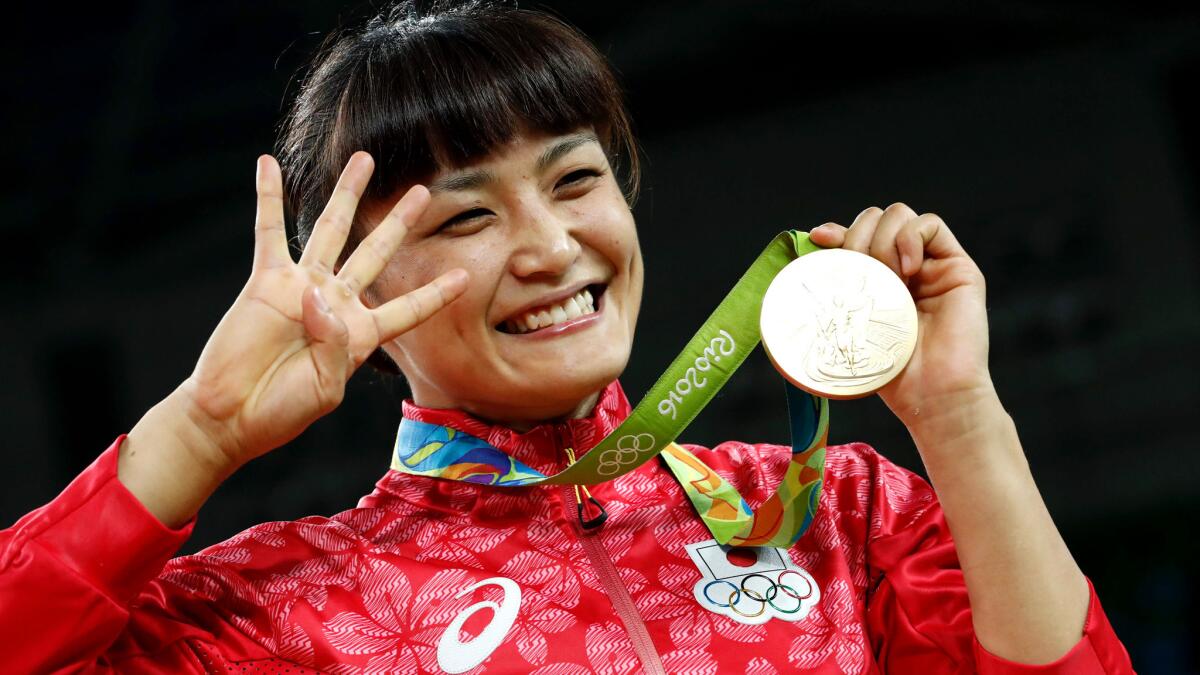
Japan’s Kaori Icho has become the first wrestler in Olympic history to win four gold medals.
Icho scored a takedown with less than five seconds left to beat Russia’s Valeriia Koblova Zholobova, 3-2, in the 58-kilogram women’s freestyle.
Icho also is the first woman to win an individual gold medal in four straight Olympics, having started her historic run at the inaugural women’s tournament at the 2004 Athens Games.
Russia’s Alexander Karelin leads the short list of men with three wrestling golds.
Icho’s teammate, Saori Yoshida, will try to match the four consecutive golds on Thursday.
Sakshi Malik won bronze to give India its first medal of the Rio Games.
- Share via
Michael Phelps says he is ready to become a volunteer assistant coach at Arizona State
Most people don’t believe that Michael Phelps, the most-decorated Olympian in history, is ready to quit competitive swimming, but he’s given clear signals that it is true.
He recently told reporters that he will begin his post-competitive era as a volunteer assistant coach at Arizona State, where his personal coach, Bob Bowman, runs the program.
“He’s a father figure to me,” Phelps said of Bowman, who began coaching the 23-time gold-medal winner at age 11 in Baltimore. “He’s helped me through some of the worst times in my life and he’s been there every step of the way and I’m forever thankful.”
Phelps ended the Rio Games with a record 28 medals in his career. Soon he could be helping train others to follow in his Olympic-sized footsteps.
- Share via
U.S. dispatches Argentina rather easily to advance to men’s basketball semifinals
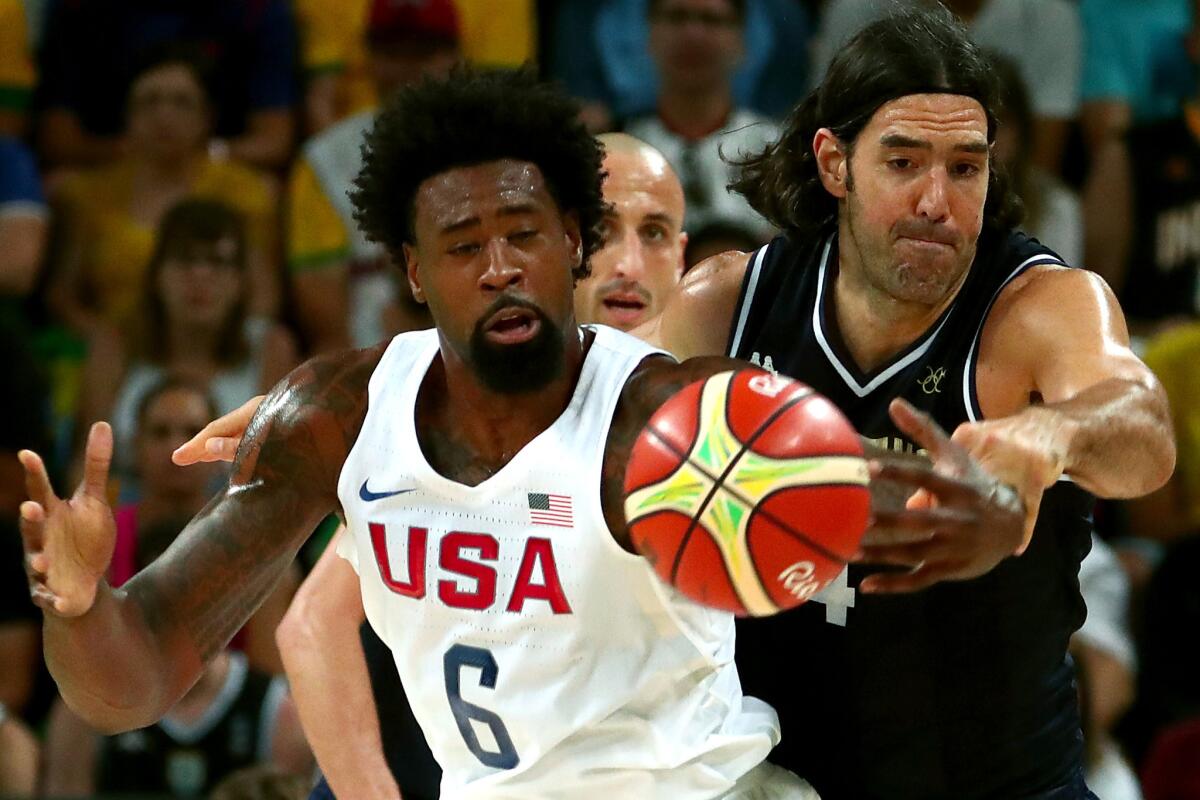
After three consecutive close games that made many doubt whether the United States men’s basketball team was ripe for an upset in the knockout rounds, the Americans played perhaps their best game of the Olympics on Wednesday in a 105-78 victory over Argentina.
The U.S. advances to the semifinals on Friday when it will meet Spain, which defeated France earlier in the day.
Argentina started fast behind a raucous crowd that was singing and dancing through pre-game warmups and into the first quarter.
The U.S. trailed by 10 points, 19-9, but after that, the Americans were jolted awake. They scored 25 of the next 27 points and took a 56-40 lead into halftime.
Kevin Durant had the hot hand for the U.S. and scored 27 points.
- Share via
Maggie Steffens leads U.S. into gold-medal game of women’s water polo
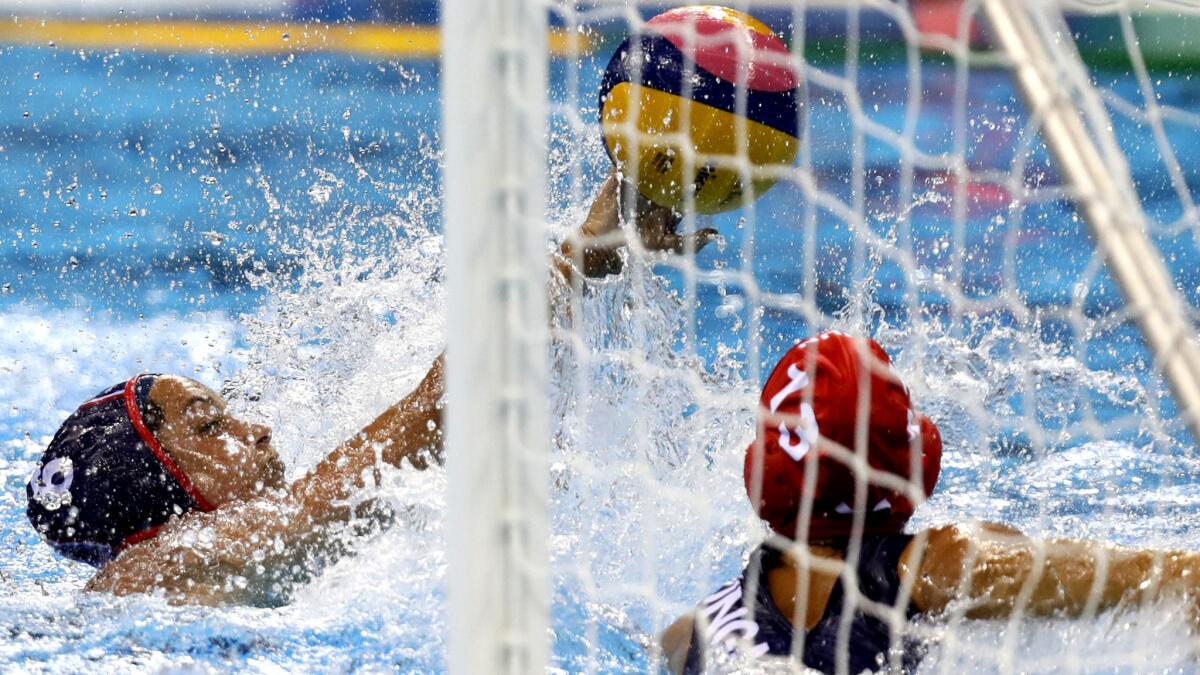
It will be the United States versus Italy for women’s water polo gold.
Maggie Steffens scored four times and the U.S. beat Hungary, 14-10, in the Rio semifinals.
Maddie Musselman and Kiley Neushul had two goals apiece for the U.S., which is trying to become the first country to repeat as Olympic champions.
Italy advanced with a 12-9 victory over Australia in the first semifinal. Arianna Garibotti pumped in five goals and Roberta Bianconi scored twice as Italy improved to a perfect 5-0 in Rio de Janeiro.
Italy won the gold medal in 2004, but slipped to sixth in Beijing and finished seventh in London four years ago.
The United States has won 21 in a row, including its five games in Rio by a combined score of 61-27. It’s the only country to finish on the podium in each of the five Olympics for women’s water polo.
- Share via
Neymar scores early, Brazil scores often to advance to men’s soccer final
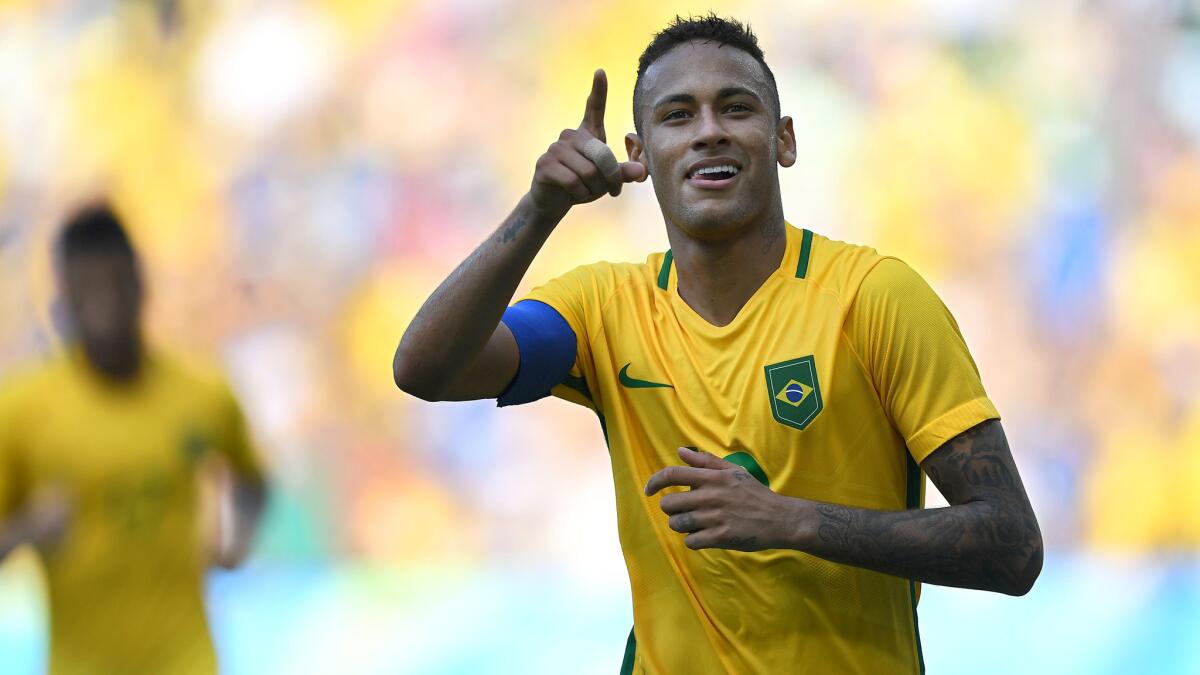
With the fastest goal in Olympic history, Neymar led Brazil back to the gold-medal match.
The striker scored 15 seconds into the game and converted a penalty kick in second-half injury time Wednesday to lead Brazil over Honduras, 6-0, in the semifinals of the men’s tournament.
Gabriel Jesus added two goals in the first half at the packed Maracana Stadium, and Marquinhos and Luan scored a goal each in the second.
Brazil lost in the final at the 2012 London Games. The Olympic gold medal is the only major title the five-time World Cup champions haven’t won in soccer.
“We won and we won well, but if in the final we don’t play well again, all of this will be for nothing,” Brazil midfielder Renato Augusto said. “We don’t want to disappoint the fans. They want us to play well, and they want us to win the gold.”
The host country will play Germany, a 2-0 winner over Nigeria, in Saturday’s final.
Brazilian fans were hoping for a sort of rematch against Germany, whose senior team embarrassed Brazil, 7-1, in the semifinals of the World Cup two years ago.
“Hey Germany, just wait, your turn is coming up,” the fans chanted at Maracana Stadium.
Only the gold will be enough for a talented Brazilian team playing at home and considered the main title favorite in a tournament played mostly with under-23 squads and very few stars.
- Share via
U.S. wins fourth in a row to advance to semifinals in men’s volleyball
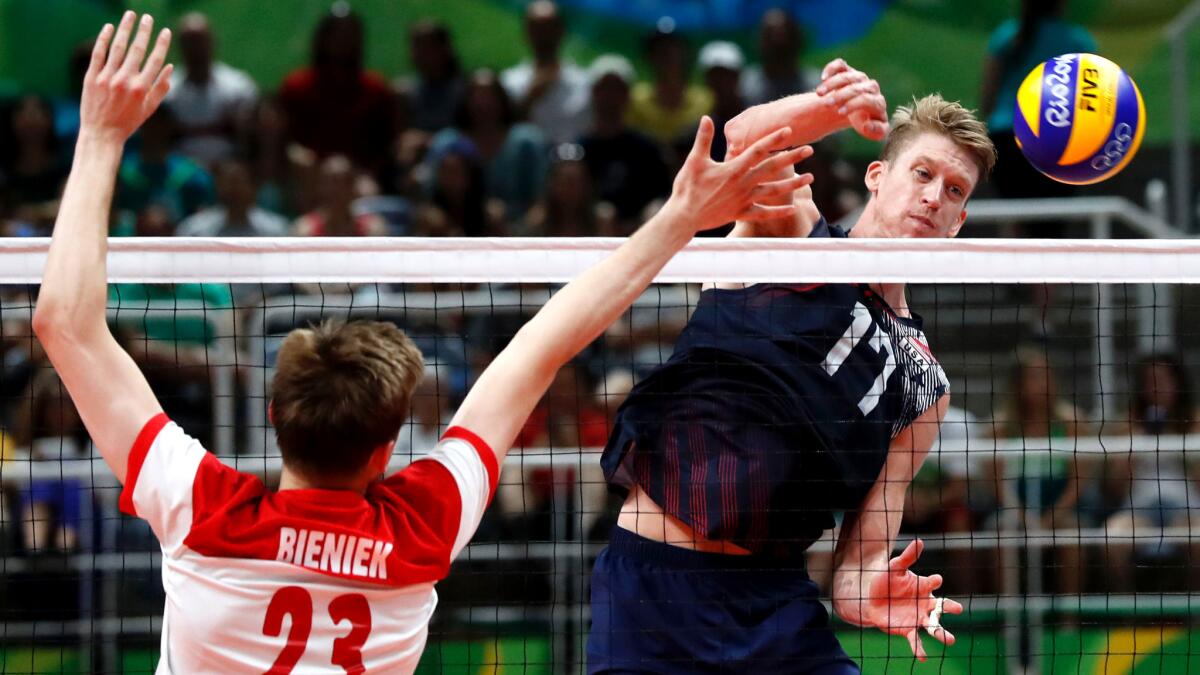
The U.S. men’s volleyball team is in the semifinals after beating Poland in straight sets Wednesday for a fourth straight victory since a surprising 0-2 start in the Rio Olympics.
The fifth-ranked Americans topped second-ranked Poland, 25-23, 25-22, 25-20, building some serious momentum at Maracanazinho arena after dropping their initial two matches to Canada and Italy.
Now, both the U.S. men’s and women’s teams are on to the final four of the Rio de Janeiro Games. The men will take on the winner of Italy-Iran on Friday, while the women face Serbia on Thursday.
- Share via
Rio Olympics: Claressa Shields wins quarterfinal to secure U.S. another boxing medal
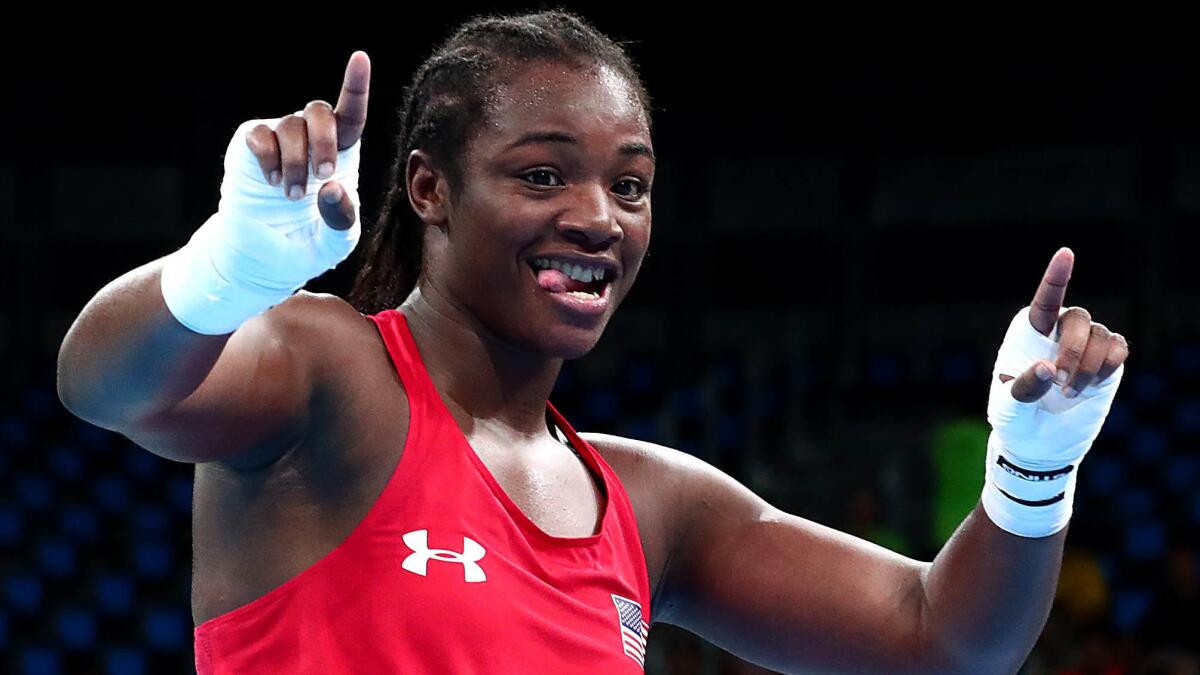
Defending Olympic champion Claressa Shields pounded her way to a unanimous-decision victory over Russian Iaroslava Iakushina in a women’s middleweight boxing quarterfinal Wednesday, guaranteeing her at least a bronze and giving the U.S. its third boxing medal of the Rio Olympics.
Shields, of Flint, Mich., controlled the fight from the opening bell, dancing and peppering the Russian with a strong right and an effective left cross. And she proved too quick for Iakushina to land any damaging blow, even when the game Russian had her pinned in the corner midway through the third round.
In the final seconds of the fourth and final round, Shields raised her hands in celebration.
The bout was the first in Rio for Shields, who was given a bye into the quarterfinals. With the victory Shields, arguably the most dominant fighter in amateur boxing, male or female, raised her career record to 75-1. Her only loss came at the 2012 World Championships, before the London Olympics where she won a gold medal as a teenager.
- Share via
IOC executive Patrick Hickey targeted in police probe into ticket scalping
International Olympic Committee member Patrick Hickey of Ireland, a longtime fixture on the global sporting stage, was arrested early Wednesday morning at his Rio hotel and is facing charges of ticket touting, forming a cartel and illegal marketing as part of a broader police investigation, according to media reports .Hickey has temporarily stepped down from his duties as a result.
An update on Hickey’s status came during the IOC’s daily briefing with spokesman Mark Adams. The Brazilian newspaper Estado also reported that Hickey, 71, went to the hospital “feeling sick.” Adams said Hickey went to the hospital around 7:30.
“Like the rest of you, we’re still trying to establish the facts this morning and find out exactly what happened,” Adams said. “Mr. Hickey was taken to hospital this morning. I believe police have had a press conference this morning and confirmed there was a search warrant and an arrest warrant.
“Needless to say, we’ll be fully cooperating with any police investigation, should there be one…What I can tell you is what I told you the other day, this involves 1,000 tickets … involves the NOC (National Olympic Committee) of Ireland, which has already launched an inquiry.”
The Irish newspaper, the Journal, said that Hickey has been formally charged by the local police but the case will transfer to prosecutors, who make the decision whether to proceed.
The Olympic Council of Ireland later released a statement that read: “In light of this morning’s developments and his ill health, Mr Hickey has taken the decision to step aside temporarily as President of the OCI and all other Olympic functions (IOC member in Ireland, European Olympic Committee President, Association of National Olympic Committees Vice President) until this matter is fully resolved.”
Video and pictures surfaced on line of the police activity at the hotel and of Hickey opening the door of his hotel room. It was high drama, Brazilian police style. Adams dealt with all forms of questions about the incident, including whether the IOC was “embarrassed” by the arrest.
Later, an Australian TV got straight to the point, asking: “Is the IOC concerned that one of the enduring images from the Games may well be one of its senior members opening the door naked to a police raid?”
Adams: “We follow the system of justice here and that’s how things are done in Brazil. We respect the justice system. As I said before, he’s innocent until proven guilty…Let’s wait before we get ahead of ourselves.”
- Share via
Rio Olympics: Kenya’s Conseslus Kipruto wins steeplechase; Evan Jager of the U.S. wins silver
The U.S. apparently has become a steeplechase power in Olympic competition.
Evan Jager of Algonquin, Ill., won a silver medal in the men’s 3,000-meter steeplechase Wednesday, finishing behind the Olympic-record time of 8:03.29 run by Conseslus Kiproto of Kenya. Jager’s time of 8:04.28 was a season-best. Earlier this week, Emma Coburn won a bronze medal in the women’s steeplechase, a first for American women.
Ezekiel Kemboi, the 2004 and 2012 Olympic champion, was third in 8:08.47. That extended the Kenyan men’s gold-medal streak in this event to nine in a row, starting in 1984.
“Beating the Kenyans in championship steeplechases, it’s a very hard achievement and a very hard task,” Jager said. “Since I started steeplechasing, it’s been one of the goals of mine just to be in the mix with the Kenyans and beat some of them on the day at championship races. Beating Kemboi, who has been so dominant over his entire career and I believe is the greatest steeplechaser of all time, it’s a huge accomplishment for me and it makes me very proud.”
He also said the parallel success of compatriot Coburn in the women’s steeplechase is “very cool.” He added, “I feel like our careers have kind of gone hand in hand. We both continue to get better each year. It’s cool that we’ve been able to share the same career at the same time.”
Jager’s medal was the first by an American man since Brian Diemer won bronze in 1984, and it also was faster than the previous Olympic record of 8:05.51 set at the 1988 Seoul Games by Julius Kariuki of Kenya.
- Share via
Controversial decisions lead to suspension of boxing judges
After Russian fighters were awarded victories in a pair of controversial decisions at the Rio Olympics, boxing’s ruling federation has expelled a number of judges and referees it determined were not performing “at the level expected.”
The International Boxing Assn., known as AIBA, did not disclose the number of officials suspended, but the BBC reported six of the 60 judges in Rio will no longer work at the Games.
AIBA spokesman Nicolas Jomard would neither confirm nor deny that number.
Boxers and national team coaches have complained about a number of decisions, prominent among them Russian Vladimir Nikitin’s unanimous decision over Michael John Conlan of Ireland in a bantamweight quarterfinal Tuesday and Monday’s heavyweight final, in which Russian Evgeny Tischenko won a unanimous decision over Kazakhstan’s Vasiliy Levit.
Conlan lost a medal even though he appeared to win all three rounds of his fight. After the decision was announced Nikitin dropped to his knees and covered his face with his hands in obvious relief while Conlan refused to leave the ring, tearing off his top, flipping off the judges and flexing his muscles to the crowd, which cheered him.
In the heavyweight bout, Tishchenki won the decision despite sustaining a serious cut to the head and spending the whole bout backpedaling.
Vietnam’s Vuong Trong Nghia and Brazil’s Jones Kennedy Silva do Rosario judged both bouts. Nghia also worked Claressa Shields’ women’s middleweight bout Wedneday without incident.
AIBA rules do not allow for an appeal of either decision.
After his loss, Conlan accused the judges of being corrupt, noting the two most controversial decisions favored Russian fighters.
Rio is the first Olympics in which scoring is being done on the 10-point must system used in professional boxing. In past Olympic computers, judges used a computer system to count each punch, no matter how damaging the blow, and award the bout to the fighter who was most active.
Under the new system, judges declare a winner after each round based on a criteria including quality of punches landed, aggression and tactics. Five judges score each bout with a computer randomly selecting which scorecards will count.
Some judges complained that they were having trouble transitioning fom the old scoring system to the new one and the AIBA’s executive committee conceded that it was very concerned with the scoring after the Conlan and Levit fights.
The AIBA said it reviewed all 239 bouts conducted before Wednesday and determined that “less than a handful ... were not at the level expected” it said in a statement.
The AIBA also dismissed the corruption allegations saying that “ unless tangible proof is put forward, not rumors, we will continue to use any means, including legal or disciplinary actions to protect our sport.”
- Share via
Brazilian judge bars U.S. swimmers Ryan Lochte, Jimmy Feigen from leaving country after they’ve already left
A Brazilian judge ordered local police to seize the passports of U.S. swimmers Ryan Lochte and Jimmy Feigen on Wednesday to bar them from leaving the country after the athletes said they were part of a group robbed at gunpoint earlier this week.
In a statement, Judge Keyla Blanc de Cnop said Lochte and Feigen gave contradictory accounts of what occurred during the incident early Sunday morning and also issued search warrants in the matter.
Local police attempted to question the swimmers and collect their passports at the Olympic Village on Wednesday.
“The swim team moved out of the village after their competition ended, so we were not able to make the athletes available,” the U.S. Olympic Committee said in a statement.
Lochte, the 12-time Olympic medalist, is reported to have returned to the U.S. Feigen’s whereabouts aren’t known. The USOC wouldn’t confirm the athletes’ location. Lochte’s dad told the Associated Press that his son is in the U.S.
Jeff Ostrow, Lochte’s U.S.-based attorney, didn’t immediately return a request for comment.
Lochte and Feigen, along with teammates Gunnar Bentz and Jack Conger, said they were robbed of cash and personal items by individuals posing as police officers during a taxi ride from France’s hospitality venue to the Olympic Village early Sunday morning. Local police said they haven’t found any evidence of a crime.
The judge’s statement said noted that footage from security cameras at the Olympic Village showed the four swimmers appearing unconcerned as they returned that morning.
- Share via
Food choices aplenty, but healthy options in short supply
I would give them a bronze medal. While they have a few healthy options, there aren’t many.
— Lori Zanini, a dietitian-nutritionist on the food offerings at Olympic Park
In the U.S., the hot dogs always taste better at the ballpark. So by that logic, in Brazil shouldn’t the acai taste better at the Olympics?
That’s a trick question, of course. Acai, a yogurt-like dish of frozen, mashed palm fruit topped by granola that Brazilians are crazy about, tastes great everywhere. But apart from that, a tour of 13 venues in the Olympic Park and the nearby Riocentro cluster of arenas showed the Rio Games to be a veritable gastronomic wasteland.
Make that gastronomic waistland. Because the stuff they’re offering the fans here will make you fat: hot dogs, cheeseburgers, pizza and potato chips are the four food groups of these Olympics.
“It’s not very sports-minded,” Dutch fan Sjoerd Verlaan said.
- Share via
Injuries will keep runner Abbey D’Agostino out of 5,000-meter final
Abbey D’Agostino, who won praise for her sportsmanship in helping rival runner Nikki Hamblin of New Zealand to her feet after they collided during the first round of the women’s 5,000-meter race on Tuesday, suffered a torn ACL and other injuries that will prevent her from competing in Friday’s final.
D’Agostino helped Hamblin get up from the track after the collision, and Hamblin returned the favor when D’Agostino tried to continue the race but was in too much pain to resume a competitive pace. Both finished well behind the pack but were advanced to the final on appeal.
Their selflessness gained worldwide attention and stands as one of the most memorable moments of the Rio Games.
“By far the best part of my experience of the Olympics has been the community it creates, what the Games symbolizes,” D’Agostino said in a statement released Wednesday by USA Track and Field.
“Since the night of the opening ceremonies, I have been so touched by this -- people from all corners of globe, embracing their unique cultures, yet all uniting under one celebration of the human body, mind, and spirit. I just keep thinking about how that spirit of unity and peace is stronger than all the global strife we’re bombarded with and saddened by on a daily basis.”
The rest of the statement is here.
- Share via
Rio Olympics: Watch Martin Short and Harry Shearer’s synchronized swimming sketch
Every four years, synchronized swimming becomes relevant when the Summer Olympics take place. And every four years, thoughts turn to the classic “Saturday Night Live” skit featuring Harry Shearer, Martin Short and Christopher Guest.
First shown in 1984, the skit is just as funny today as it was then. Watch and enjoy.
NBC should do a “Where are they now?” short film on their broadcast, catching up with their characters in their continuing quest for Olympic gold.
- Share via
A long journey ends in a victory for one and all
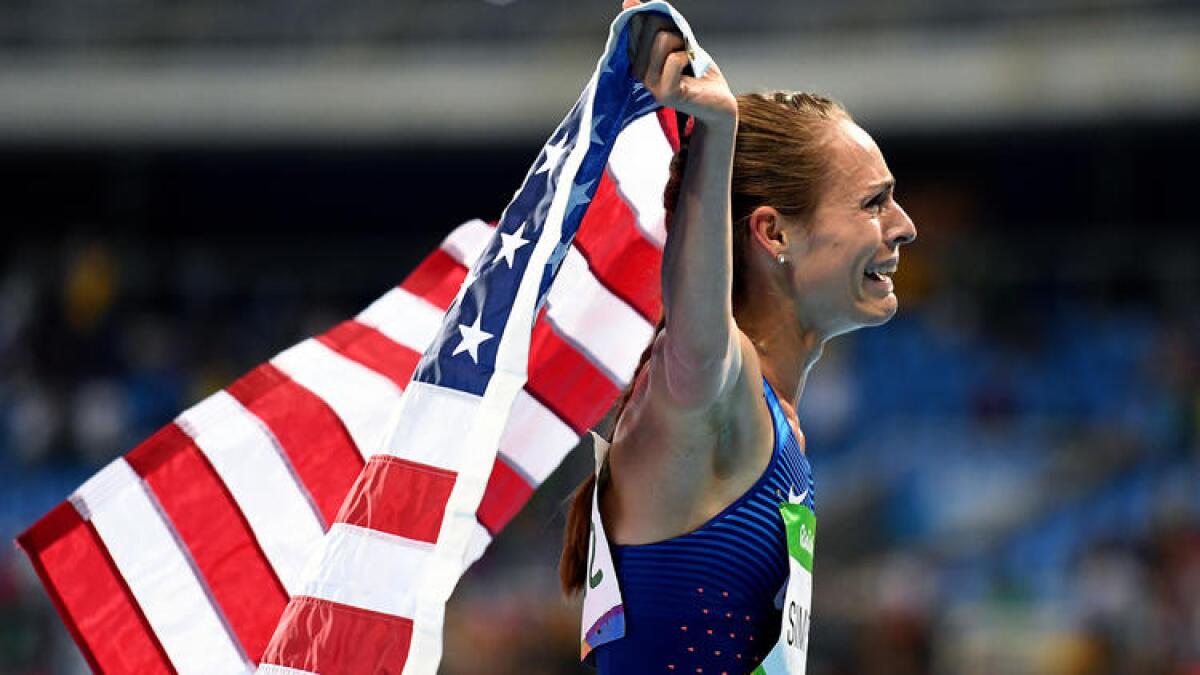
This has been a long ride of highs and lows, and hopefully every American watching my race tonight, I want each of them to feel they can take a small piece of ownership in this medal.
— Jenny Simpson, American bronze medalist
Jenny Simpson was more nervous before the semifinal of the Rio Olympic 1,500-meter race than she was before Tuesday’s final, with the world watching. Her mind clear and her legs strong, she took to heart her coaches’ advice to use the first two laps to establish position and the last two laps “to be a predator.” She was fully prepared for this moment.
“This is what I prayed for. This is what I worked for, just to have a shot,” she said. “Standing on the starting line I feel the only thing ahead of me is opportunity.”
Simpson later didn’t recall much about a slow, tactical race that took a late fast turn. She knew she fell to the ground afterward and “ugly-cried” only because people told her that’s how she reacted following her third-place finish, which secured the first medal for a U.S. woman in the event.
Faith Kipyegon of Kenya overtook world-record holder Genzebe Dibaba of Ethiopia in the final 200 meters to win in 4 minutes, 8.92 seconds, with Diababa in at 4:10.27. Simpson, who won the 2011 world championship, was second in 2013 and unlucky last year when she lost a shoe in mid-race, finished in 4:10.53 to etch her name in history.
- Share via
This young lady is light-years ahead of the competition
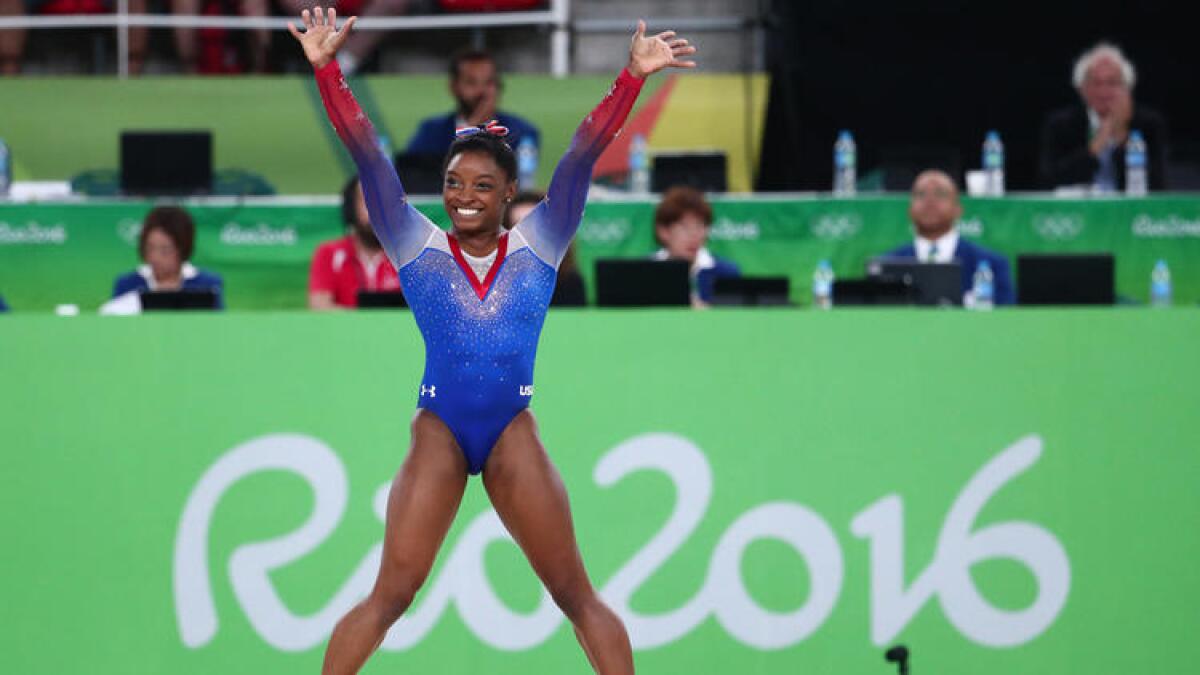
It’s amazing. It’s hard to put into words. I don’t even consider myself competing against her. It’s like she’s on another level.
— Aly Raisman, U.S. teammate regarding Simone Biles’ talent
Simone Biles didn’t quite feel like she truly belonged to the Famous U.S. Olympian Club. She admitted to feeling a “little nervous” around the likes of swimmers Michael Phelps and Katie Ledecky during a recent photo shoot.
She was underestimating herself.
Another gold-medal performance by the transcendent talent suggested the club membership had expanded with proper justification. Biles sparkled and soared in her celebratory floor exercise routine Tuesday and won her fourth gold medal here. U.S. teammate Aly Raisman took the silver and 16-year-old Amy Tinkler of Britain the bronze.
Biles’ takeaways from Rio: five medals, four of them gold and one bronze. The teenager from Spring, Texas, joined three other women in winning four gymnastics golds at an Olympics, last accomplished 32 years ago by Ekaterina Szabo of Romania.
- Share via
Wednesday’s Rio Olympics schedule and results
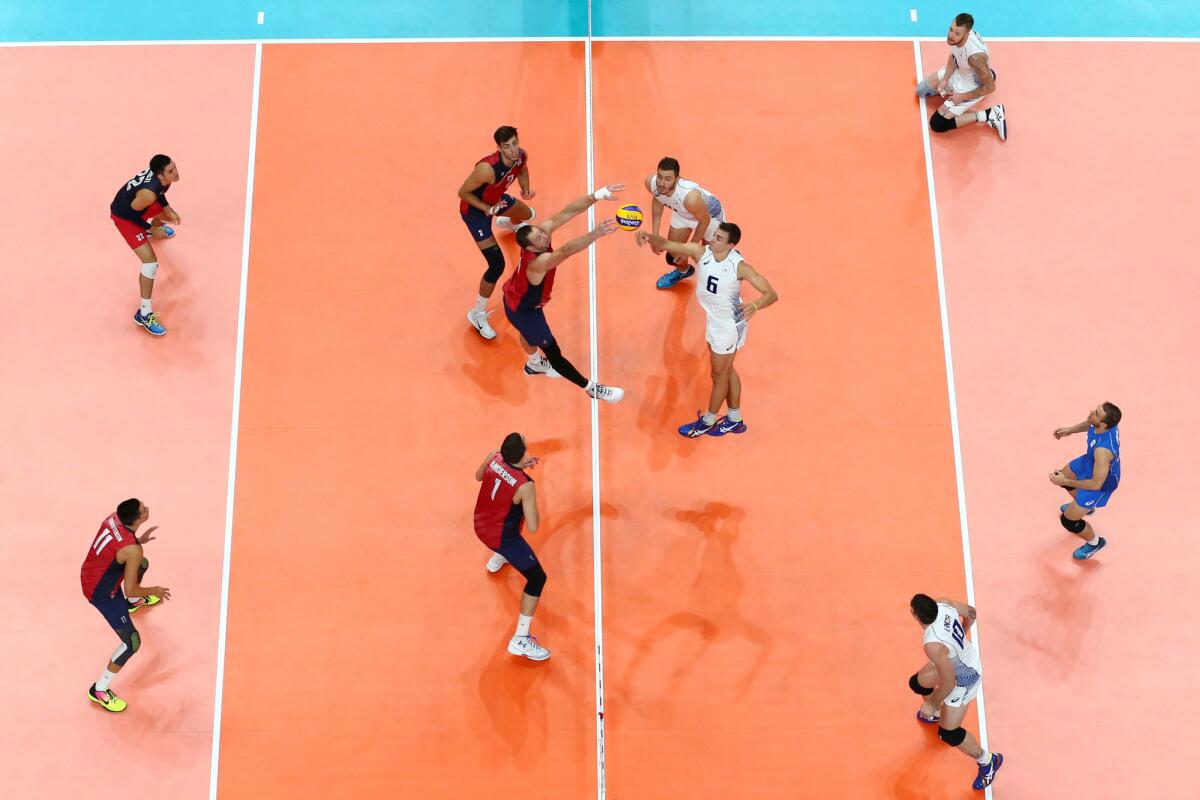
Schedule and results from Wednesday’s Rio Olympics competition. All times Pacific.
Badminton
Mixed Doubles
Gold--Indonesia (Tontowi Ahmad, Liliyana Natsir) d. Malaysia (Peng Soon Chan, Liu Ying Goh), 21-14, 21-12
Bronze--China (Nan Zhang, Yunlei Zhao) d. Chen Xu and Jin Ma (China), 21-7, 21-11
Men’s singles
Quarterfinals
Chong Wei Lee (Malaysia) d. Tien Chen Chou (Taiwan), 21-9, 21-15.
Dan Lin (China) d. Srikanth Kidambi (India), 21-21, 11-11, 21-21.
Viktor Axelsen (Denmark) d. Rajiv Ouseph (Britain), 21-12, 21-16.
Long Chen (China) d. Wan Ho Son (South Korea), 21-11, 18-21, 21-11
Basketball (men’s quarterfinals)
Australia 90, Lithuania 64
Spain 92, France 67
United States 105, Argentina 78
Serbia 86, Croatia 83
Beach Volleyball
Women
Gold--Laura Ludwig and Kira Walkenhorst (Germany) d. Barbara Seixas de Freitas and Agatha Bednarczuk (Brazil), 21-18, 21-14
Bronze--Kerri Walsh Jennings and April Ross (United States), d. Larissa Franca Maestrini and Talita Rocha (Brazil), 17-21, 21-17, 15-9
Boxing
Men’s light-middleweight (69-kilograms)
Gold--Daniyar Yeleussinov, Kazakhstan.
Silver--Shakhram Giyasov, Uzbekistan.
Bronze--Souleymane Diop Cissokho, France.
Bronze--Mohammed Rabii, Morocco
Men’s fllyweight (52-kilograms)
Quarterfinals
Shakhobidin Zoirov (Uzbekistan) d. Elvin Mamishzada (Azerbaijan), 3-0
Yoel Segundo Finol (Venezuela), d. Mohamed Flissi (Algeria), 3-0
Misha Aloian (Russia) d. Ceiber David Avila (Colombia), 3-0
Jianguan Hu (China) d. Yosbany Veitia (Cuba), 2-1
Women’s lightweight (57-60 kilograms)
Semifinals
Junhua Yin (China) d. Mira Potkonen (Finland), 3-0
Anastasiia Beliakova (Russia) d. Estelle Mossely (France), TKO (R1, 2:00)
Middleweight (69-75 kilograms)
Quarterfinals
Claressa Shields (United States) d. Iaroslava Iakushina (Russia), 3-0.
Dariga Shakimova (Kazakhstan) d. Khadija Mardi (Morocco), 3-0.
Qian Li (China) d. Andreia Bandeira (Brazil), 3-0.
Nouchka Fontijn (Netherlands), d. Savannah Marshall (Britain), 2-0
Diving
Women’s 10-meter platform qualifiers
1. Yajie Si, China, 397.45; 2. Qian Ren, China, 385.80; 3. Jessica Parratto, United States, 346.80; 4. Melissa Wu, Australia, 342.80; 5. Tonia Couch, Britain, 332.80; 6. Pandelela Rinong Pamg, Malaysia, 332.45; 7. Meaghan Benfeito, Canada, 329.15; 8. Nur Dhabitah Sabri, Malaysia, 325.85; 9. Roseline Filion, Canada, 323.55; 10. Minami Itahashi, Japan, 320.20; 11. Ekaterina Petukhova, Russia, 317.25; 12. Katrina Young, United States, 313.85; 13. Paola Espinosa, Mexico, 313.70; 14. Ganna Krasnoshlyk, Ukraine, 300.80; 15. Iuliia Prokopchuk, Ukraine, 297.95; 16. Elena Wassen, Germany, 291.90 ; 17. Brittany O’Brien, Australia, 290.30; 18. Un Hyang Kim, North Korea, 289.45.
Equestrian
Jumping team finals
Gold--France
Silver--United States
Bronze--Germany
Field Hockey (women’s semifinals)
Netherlands 1, Germany 1 (Netherlands wins 4-3 in shootout)
Britain 3, New Zealand 0
Handball (men’s quarterfinals)
France 34, Brazil 27
Germany 34, Qatar 22
Denmark 37, Slovenia 30
Poland 30, Croatia 27
Sailing
Medal races in men’s 470 and women’s 470 postponed
Soccer (men’s semifinals)
Brazil 6, Honduras 0
Germany 2, Nigeria 0
Table Tennis
Gold--China (Long Ma, Jike Zhang, Xin Xu) d. Japan (Jun Mizutani, Koki Niwa, Maharu Yoshimura), 3-1
Bronze--Germany (Bastian Steger, Dimitrij Ovtcharov, Timo Boll) def. South Korea (Youngsik Jeoung, Saehyuk Joo, Sangsu Lee), 3-1
Taekwondo
Men’s 58-kilogram
Gold--Shuai Zhao (China) d. Tawin Hanprab (Thailand), 6-4
Bronze--Luisito Pie (Dominican Republic) d. Jesus Tortosa Cabrera (Spain), 6-5
Bronze--Taehun Kim (South Korea) d. Carlos Ruben Navarro Valdez (Mexico), 7-5.
Women’s 49-kilogram
Gold--Sohui Kim (South Korea) d. Tijana Bogdanovic (Serbia), 7-6.
Bronze--Patimat Abakarova (Azerbaijan) d. Yasmina Aziez (France), 7-2
Bronze--Panipak Wongpattanakit (Thailand) d. Itzel Adilene Manjarrez Bastidas (Mexico), 15-3
Track and Field
Men
3,000-meter steeplechase
Gold--Conseslus Kipruto, Kenya, 8:03.28
Silver--Evan Jager, United States, 8:04.28
Bronze--Ezekiel Kemboi, Kenya, 8:08.47
Women
200 meters
Gold--Elaine Thompson, Jamaica, 21.78
Silver--Dafne Schippers, Netherlands, 21.88
Bronze--Tori Bowie, United States, 22.15
100 Hurdles
Gold--Brianna Rollins, United States, 12.48
Silver--Nia Ali, United States, 12.59
Bronze--Kristi Castlin, United States, 12.61
Long jump
Gold--Tianna Bartoletta, United States, (7.17), 23-6 1-4
Silver--Brittney Reese, United States, (7.15), 23-5 1-2
Bronze--Ivana Spanovic, Serbia, (7.08), 23-2 3-4
Volleyball (men’s quarterfinals)
Russia 3, Canada 0 (25-15, 25-20, 25-18)
United States 3, Poland 0 (25-23, 25-22, 25-20)
Italy 3, Iran 0 (31-29, 25-19, 25-17)
Brazil 3, Argentina 1, (25-22, 17-25, 25-19, 25-23)
Water Polo (women)
Semifinals
Italy 12, Russia 9
United States 14, Hungary 10
Classification matches
Australia 11, Brazil 4
Spain 11, China 6
Wrestling
Women
Freestyle
48 kilogram
Gold---Eri Tosaka (Japan) def. Mariya Stadnik (Azerbaijan), 3-2
Bronze--Yanan Sun (China) def. Zhuldyz Eshimova, (Kazakhstan) 10-0
Bronze--Elitsa Atanasova Yankova (Bulgaria) def. Patricia Alejandra Bermudez (Argentina), 7-6
58 kilogram
Gold--Kaori Icho (Japan) def. Valeriia Koblova Zholobova (Russia), 3-2
Bronze--Marwa Amri (Tunisia) def. Yuliya Ratkevich (Azerbaijan), 6-3
Sakshi Malik (India) def. Aisuluu Tynybekova (Kyrgyzstan), 8-5
69 kilogram
Gold--Sara Dosho (Japan) def. Natalia Vorobeva (Russia), 2-2
Bronze--Elmira Syzdykova (Kazakhstan) d. Enas Mostafa Youssef Ahmed (Egypt), 7-4
Bronze--Anna Jenny Fransson (Sweden) d. Dorothy Erzsebet Yeats (Canada) 2-1
- Share via
Column: Here is the reason why American women are dominating at the Olympics
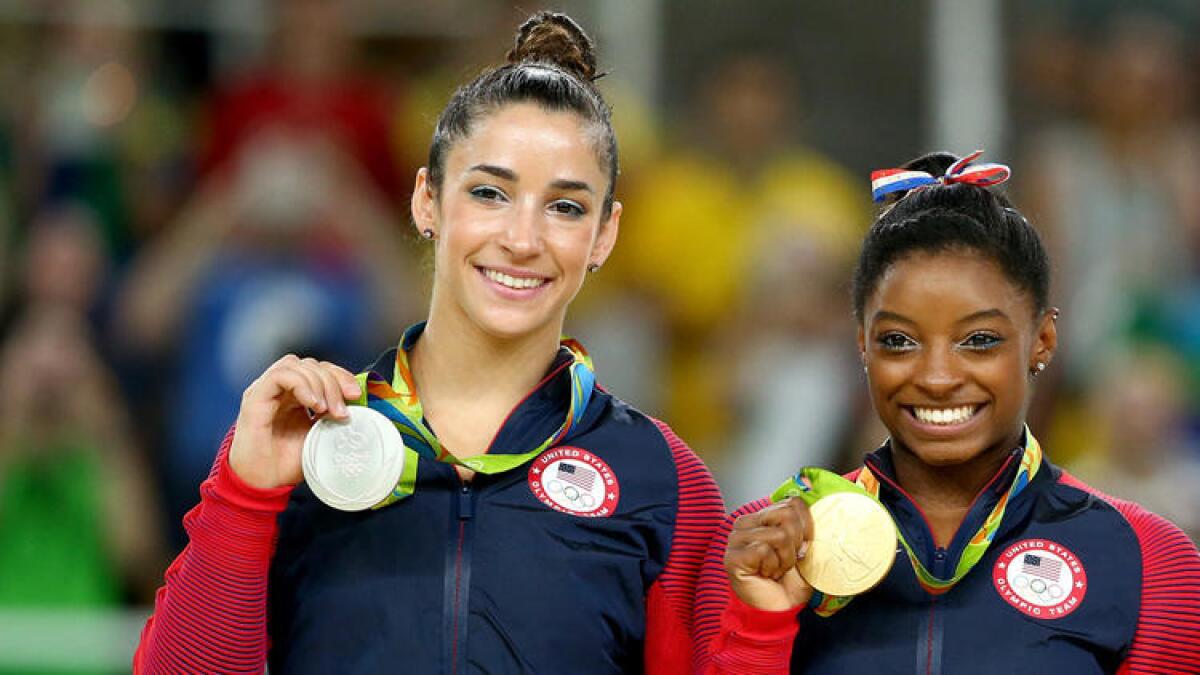
I was always grown up with encouragement, I was never taught I couldn’t compete. This is just an accepted part of our culture.
— Maya DiRado, U.S. gold medalist in swimming
The girl wanders into a Houston gym on a school field trip, a worker loves her spark, and a dozen years later she wins four Olympic gold medals.
A girl jumps into a suburban Washington, D.C., swimming pool to make friends, a coach notices her stroke, and a dozen years later she wins four Olympic gold medals.
With five days remaining in the Rio Olympics, the final verdict is in and the winners are the U.S. women.
After 11 of the Olympics’ 16 days, American women have filled the podium, dominated the broadcasts and opened the curtain on an inclusive sports society absent in many parts of the world.
- Share via
Kerri Walsh Jennings and April Ross lose in semifinals of women’s beach volleyball
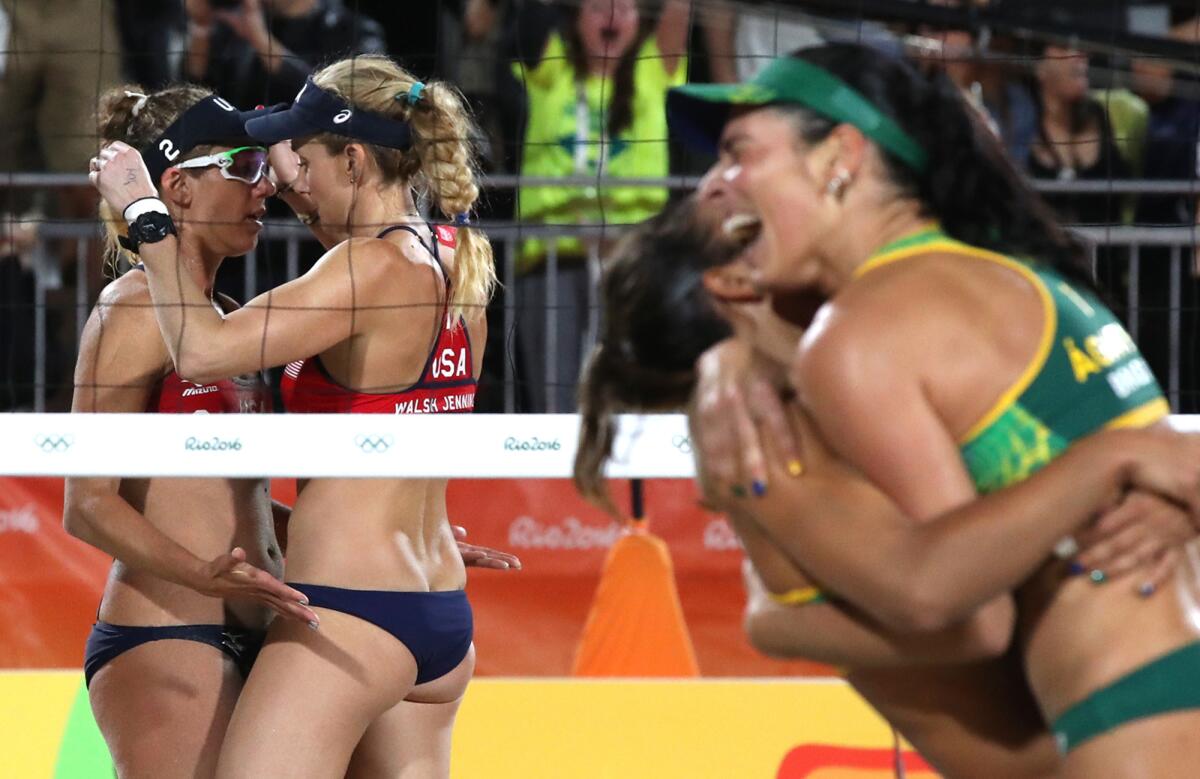
Kerri Walsh Jennings’ gold-medal streak is over after Brazil’s Agatha and Barbara defeated the heralded American and partner April Ross in the semifinals of women’s beach volleyball on Tuesday night.
The Brazilians advanced to play against Germany’s Laura Ludwig and Kira Walkenhorst with the 22-20, 21-18 victory.
Walsh Jennings and Ross will now play for the bronze medal on Wednesday against Brazil’s other duo.
Walsh Jennings, a native of Northern California who has spent her professional career training on the sands of Hermosa Beach and Manhattan Beach near her residence, had won three gold medals with Misty May-Treanor and had never lost an Olympic match. In fact, she had only lost two sets in her Olympic career before falling in straight sets at the Copacabana venue.
“Kerri does so much for us and I didn’t step up today,” Ross said. “I’m very upset with myself.”
Agatha and Barbara are the defending world champions, but they were the second-seeded team in the tournament to fellow Brazilians Talita and Larissa, a pair of three-time Olympians, who lost to the Germans, 21-18, 21-12, earlier Tuesday.
Brazil still has a chance to match its 2004 Olympic haul of three medals. Despite failing to make the final, Talita said she would never forget playing in front of the hometown crowd on the iconic beach.
“I am so proud of my people, the Brazilian people,” Talita said.
- Share via
Lasha Talakhadze sets world record to claim gold in over 105-kilogram weightlifting
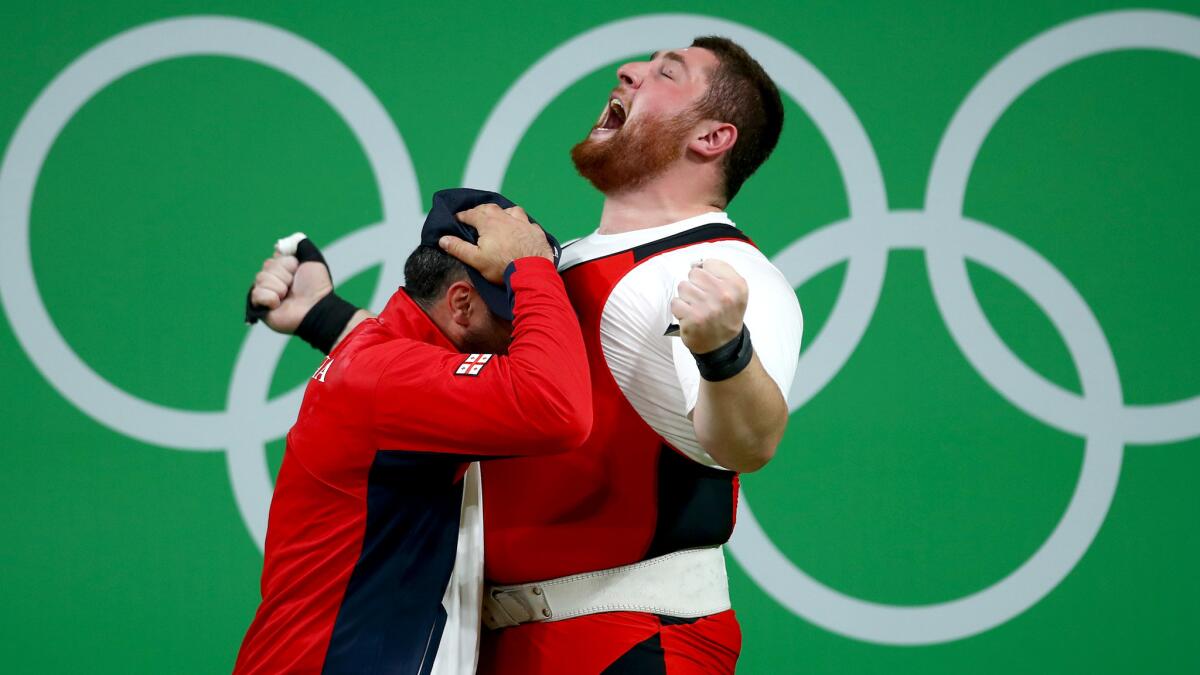
Lasha Talakhadze of Georgia has set a new world record in the over 105-kilogram weightlifting division with 473 total kilos to win the gold medal in a surprising upset over the heavily favored Behdad Salimi of Iran.
The 22-year-old Talakhadze lifted 215 kilos on the snatch and 258 on the clean and jerk to set the new mark.
Salimi set the world record for the snatch with 216 kilos. But he could not complete any of his three attempts on the clean and jerk. Salimi appeared to disagree with the judges’ ruling on his first two tries and didn’t have the energy to complete the third.
Gor Minasyan of Armenia won silver and Georgia’s Irakli Turmanidze took home the bronze.
- Share via
U.S. women defeat Japan, 110-64, to advance in women’s basketball semifinals
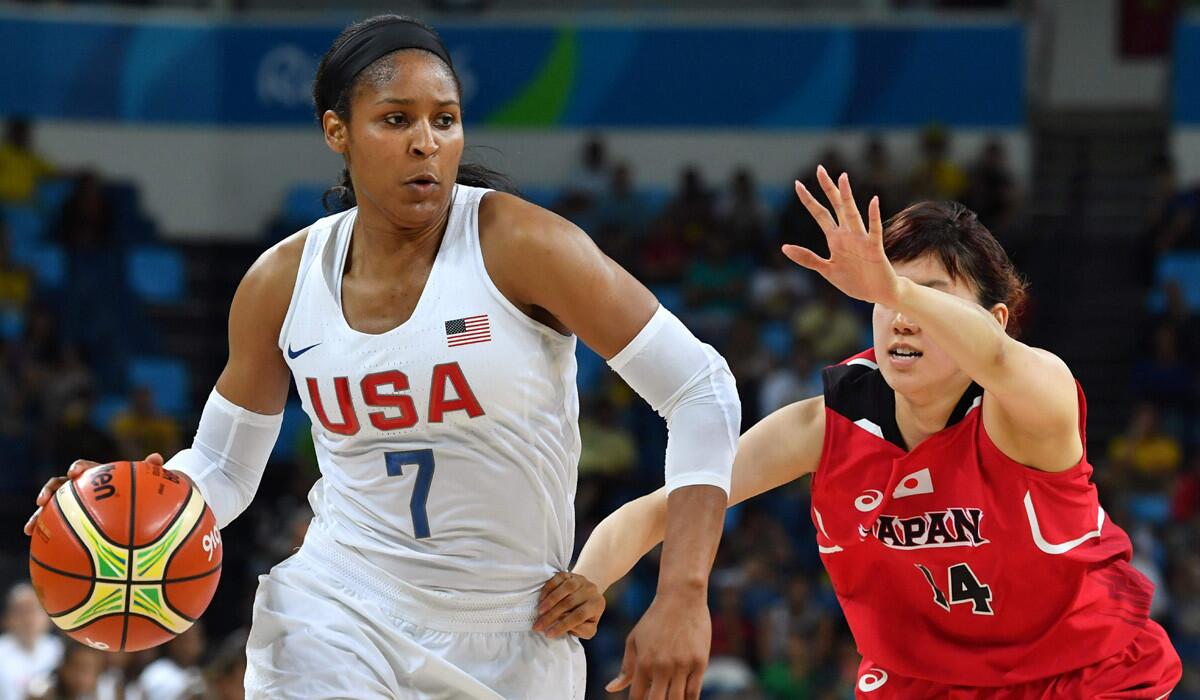
The U.S. women’s team isn’t accustomed to close games.
Early in the third quarter on Tuesday, however, the U.S. couldn’t shake off a smaller but determined Japan.
But beating Team USA requires a near-perfect effort on both ends of the floor – and eventually the U.S. overwhelmed Japan.
Behind a strong defensive effort in the second half, the U.S. coasted to a 110-64 victory after Japan had cut the lead to six early in the third quarter.
The U.S. advances to the semifinals on Thursday when it will face the winner of the quarterfinal matchup between France and Canada.
- Share via
U.S. women grind past Japan and into the women’s volleyball semifinals
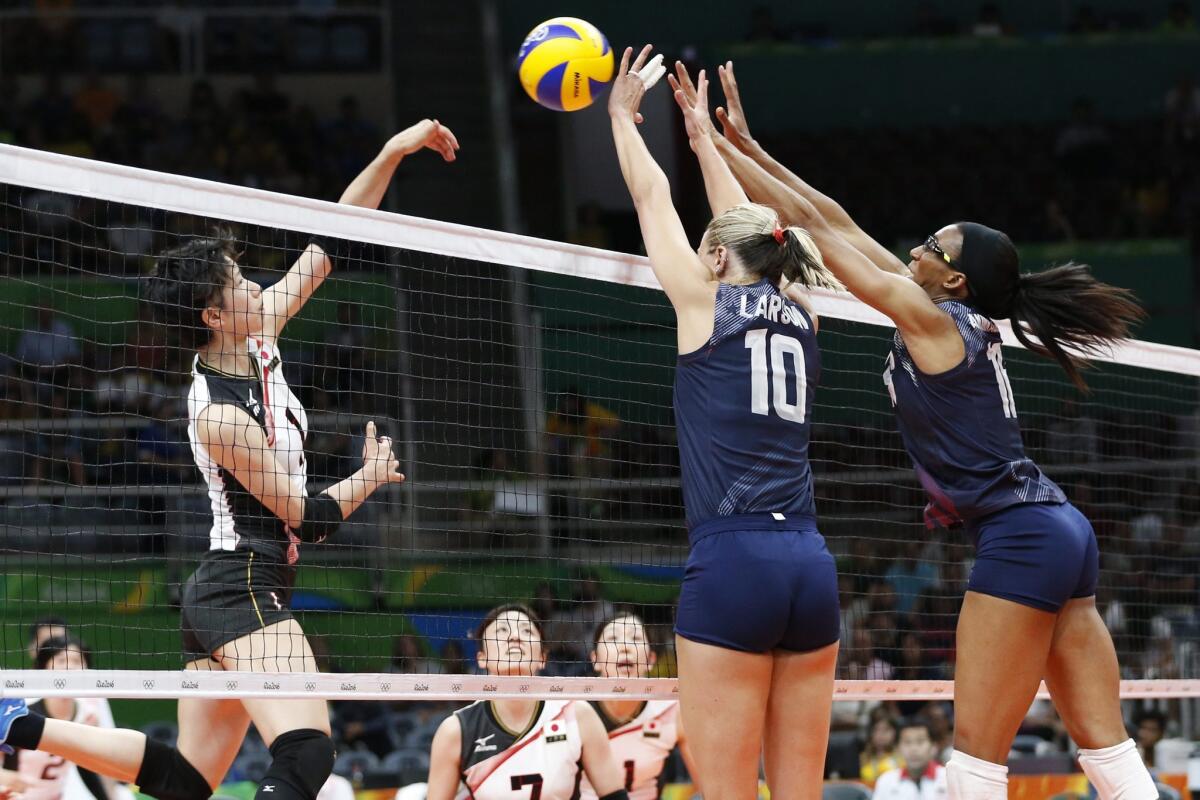
Patience has been a key word for the U.S. women’s volleyball team at these 2016 Summer Games.
The Americans are ranked No. 1 in the world but chasing their first Olympic gold after near misses in the past, and they know it will take a match-by-match approach.
This attitude served them well Tuesday in a quarterfinal victory over Japan at Maracanazinho Arena.
The Japanese are a relatively short team that compensates with quickness and tenacity. The U.S. had to keep hammering away at the net with its size advantage.
“It’s frustrating against a great defensive team like Japan,” captain Christa Harmotto Dietzen said. “It takes four or five swings sometimes for us to put the ball down.”
So their straight-set win -- 25-16, 25-23, 25-22 -- was fueled by spikes and blocks.
“We don’t have many tall players in our team,” Japanese Coach Masayoshi Manabe said.
The U.S. now advances to the semifinals against the winner of the Russia-Serbia match.
- Share via
U.S. triple jumper Christian Taylor repeats as Olympic champion; Will Claye earns silver
In an amazing turnaround with the same golden result, Christian Taylor fundamentally changed his triple jump technique — changing his lead-off foot — and it paid off.
Taylor now starts his triple jump with a right-foot hop in what is a major change to his whole routine since he won gold in London. His pains and aches eased, and the results stayed exemplary.
On Tuesday, he and Will Claye again swept gold and silver for the United States at back-to-back Olympics. Taylor had a world-leading mark of 17.86 meters on his first attempt. He posted the three best jumps of the competition.
“I never thought on my first jump that would be the gold medal jump. I stayed sharp and stayed ready,” he said.
Claye took the silver with a personal record of 17.76 meters and went straight up in the stands to propose to his girlfriend, American sprinter Queen Harrison. She accepted.
- Share via
Tuesday’s Rio Olympics schedule and results
Schedule and results from Tuesday’s Rio Olympics competition. All times Pacific.
Badminton
Mixed Doubles
Bronze--Nan Zhang and Yunlei Zhao, China, def. Chen Xu and Jin Ma, China, 21-7, 21-11
Men’s doubles
Semifinals
V Shem Goh and Wee Kiong Tan, Malaysia, def. Biao Chai and Wei Hong, China, 21-18, 12-21, 21-17
Haifeng Fu and Nan Zhang, China, def. Marcus Ellis and Chris Langridge, Britain, 21-14, 21-18
Women’s doubles
Semifinals
Misaki Matsutomo and Ayaka Takahashi, Japan, def. Kyung Eun Jung and Seung Chan Shin, South Korea, 21-16, 21-15
Christinna Pedersen and Kamilla Rytter Juhl, Denmark, def. Yuanting Tang and Yang Yu, China, 21-16, 14-21, 21-19
Women’s singles
Quarterfinals
Carolina Marin, Spain, def. Ji Hyun Sung, South Korea, 21-12, 21-16
Xuerui Li, China, def. Porntip Buranaprasertsuk, Thailand, 21-12, 21-17
Nozomi Okuhara, Japan, def. Akane Yamaguchi, Japan, 11-11, 21-21, 21-21
V. Sindhu Pusarla, India, def. Yihan Wang, China, 22-20, 21-19
Basketball (Women’s quarterfinals)
Serbia 73, Australia 71
Spain 64, Turkey 62
United States 110, Japan 64
France 68, Canada 63
Beach Volleyball (Men’s semifinals)
Alison/Bruno Schmidt (Brazil) d. Brouwer/Meeuwsen (Netherlands), 21-17, 21-23, 16-14
Nicolai/Lupo (Italy) d. Semenov/Krasilnikov (Russia), 15-21, 21-16, 15-13
Beach Volleyball (Women’s semifinals)
Ludwig/Walkenhorst (Germany) d. Larissa/Talita (Brazil), 21-18, 21-12
Agatha/Barbara (Brazil) d. Walsh-Jennings/Ross (United States), 22-20, 21-18
Boxing (Men)
Lightweight (60 kilograms)
Gold--Robson Conceicao, Brazil, d. Sofiane Oumiha, France, 3-0
Bronze--Otgondalai Dorjnyambuu, Mongolia
Bronze--Lázaro Álvarez, Cuba
Light-heavyweight (81 kilograms)
Semifinals
Julio Cesar la Cruz, Cuba, def. Mathieu Albert Daniel Bauderlique, France, 3-0
Adilbek Niyazymbetov, Kazakhstan, def. Joshua Buatsi, Britain, 3-0
Canoe/Kayak
Men’s canoe single 1,000-meter sprint finals
Gold--Sebastian Brendel, Germany, 3:56.92
Silver--Isaquias Queiroz dos Santos, Brazil, 3:58.52
Bronze--Serghei Tarnovschi, Moldova, 4:00.85
Women’s kayak double 500-meter sprint finals
Gold--Hungary, 1:43.68
Silver--Germany, 1:43.73
Bronze--Poland, 1:45.20
Women’s kayak single 200-meter sprint finals
Gold--Lisa Carrington, New Zealand, 39.86 seconds
Silver--Marta Walczykiewicz, Poland, 40.27
Bronze--Inna Osypenko-Radomska, Azerbaijan, 40.40
Men’s kayak single 1,000-meter sprint finals
Gold--Marcus Walz, Spain, 3:31.44
Silver--Josef Dostál, Czech Republic, 3:32.14
Bronze--Roman Anoshkin, Russia, 3:33.36
Cycling
Men’s keirin
Gold--Jason Kenny, Britain, 10.113
Silver--Matthijs Buchli, Netherlands, +0.040
Bronze--Azizulhasni Awang, Malaysia, +0.085
Women’s sprint
Gold---Kristina Vogel, Germany, d. Rebecca James, Britain, w-11.237, w-11.312.
Bronze--Katy Marchant, Britain, def. Elis Ligtlee, Netherlands, w-11.237, w-11.424.
Women’s omnium
Gold--Laura Trott, Britain, (38, 40, 40, 38, 40), 196
Silver--Jolien D’hoore, Belgium, (36, 36, 38, 34, 28), 172
Bronze--Sarah Hammer, United States, (34, 38, 36, 32, 32), 172
Diving
Men
Gold--Yuan Cao, China, 547.60
Silver--Jack Laugher, Britain, 523.85
Bronze--Patrick Hausding, Germany, 498.90
Field Hockey (Men’s semifinals)
Argentina 5, Germany 2
Belgium 3, Netherlands 1
Gymnastics (Men)
Individual final, parallel bars
Gold--Oleg Verniaiev, Ukraine, 16.041
Silver--Danell Leyva, United States, 15.900
Bronze--David Belyavskiy, Russia, 15.783
Individual final, high bar
Gold--Fabian Hambuechen, Germany, 15.666
Silver--Danell Leyva, United States, 15.500
Bronze--Nile Wilson, Britain, 15.466
Gymnastics (Women)
Individual final, floor exercise
Gold--Simone Biles, United States, 15.966
Silver--Aly Raisman, United States, 15.500
Bronze--Amy Tinkler, Great Britain, 14.933
Handball (Women’s quarterfinals)
Netherlands 32, Brazil 23
France 27, Spain 26
Norway 33, Sweden 20
Russia 31, Angola 27
Sailing
Women’s Laser Radial
Gold--Marit Bouwmeester, Netherlands
Silver--Annalise Murphy, Ireland
Bronze--Anne-Marie Rindom, Denmark
Men’s Laser Dinghy
Gold--Tom Burton, Australia
Silver--Tonči Stipanović, Croatia
Bronze--Sam Meech, New Zealand
Mixed Nacra 17 (multihull)
Gold--New Zealand, G. Jones and J. Saunders
Silver--Australia, J. Waterhouse and L. Darmanin
Bronze--Austria, T. Frank and T. Zajac
Men’s Finn
Gold--Giles Scott, Great Britain
Silver--Vasilij Žbogar, Slovenia
Bronze--Caleb Paine, United States
Soccer (women’s semifinals)
Sweden 0, Brazil 0 (Sweden advances on penalty kicks, 4-3)
Germany 2, Canada 0
Swimming (Men)
Open water marathon 10-kilometer final
Gold--Ferry Weertman, Netherlands, 1:52:59
Silver--Spyridon Gianniotis, Greece, 1:52:59
Bronze--Marc-Antoine Olivier, France, 1:53:02
Synchronized Swimming
Duets
Gold--Russia, N. Ishchenko and S. Romashina, 194.9910
Silver--China, X.C. Huang and W. Sun, 192.3688
Bronze--Japan, R. Mitsui and Y. Inui, 188.0547
Table Tennis
Women’s team
Gold--China (Ning Ding, Shiwen Liu, Xiaoxia Li) def. Germany (Ying Han, Xiaona Shan, Petrissa Solja), 3-0
Bronze--Japan (Ai Fukuhara, Kasumi Ishikawa, Mima Ito) def. Singapore (Mengyu Yu, Tianwei Feng, Yihan Zhou), 3-1
Track and Field (Men)
110-meter high hurdles
Gold--Omar McLeod, Jamaica, 13.05
Silver--Orlando Ortega, 13.17
Bronze--Dimitri Bascou, France, 13.24
High jump
Gold--Derek Drouin, Canada, 2.38 meters
Silver--Mutaz Essa Barshim. Qatar, 2.36
Bronze--Bohdan Bondarenko, Ukraine, 2.33
Triple jump
Gold--Christian Taylor, United States, 17.86 meters
Silver--Will Claye, United States, 17.76
Bronze--Dong Bin, China, 17.58
Track and Field (Women)
1,500 meters
Gold--Faith Chepngetich Kipyegon, Kenya, 4:08.92
Silver--Genzebe Dibaba, Ethiopia, 4:10.27
Bronze--Jennifer Simpson, United States, 4:10.53
Women’s discus final
Gold--Sandra Perković, Croatia, 69.21 meters
Silver--Mélina Robert-Michon, France, 66.73
Bronze--Denia Caballero, Cuba, 65.34
Volleyball (women’s quarterfinals)
Netherlands 3, South Korea 1
United States 3, Japan 0
Serbia 3, Russia 0
China 3, Brazil 2
Water polo (Men’s quarterfinals)
Montenegro 13, Hungary 11
Serbia 10, Spain 7
Croatia 10, Brazil 6
Italy 9, Greece 5
Weightlifting
Men’s 105+-kilogram final
Gold--Lasha Talakhadze, Georgia, 473kg (world record)
Silver--Gor Minasyan, Armenia, 451kg
Bronze--Irakli Turmanidze, Georgia, 448kg
Wrestling
Men’s 66-kilogram
Gold--Davor Stefanek, Serbia
Silver--Migran Arutyunyan, Armenia
Bronze--Shmagi Bolkvadze, Georgia
Bronze--Rasul Chunayev, Azerbaijan
Men’s 98-kilogram
Gold--Artur Aleksanyan, Armenia
Silver--Yasmany Lugo Cabrera, Cuba
Bronze--Celk Ildem, Turkey
Bronze--Ghasem Rezaei, Iran
- Share via
Live gymnastics: Simone Biles wins gold in floor exercise, Aly Raisman silver; Danell Leyva wins silver in parallel bars
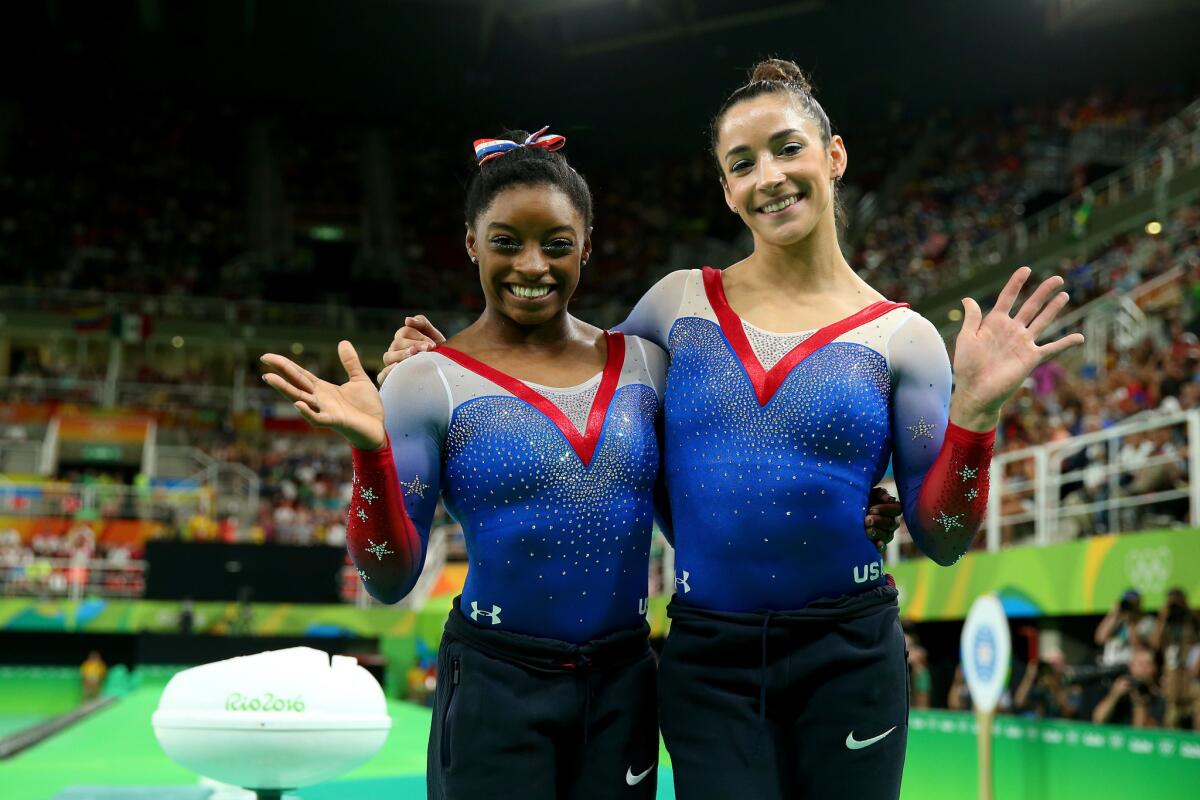
Simone Biles went airborne to secure her fourth gold medal at the Olympics, soaring high on the floor exercise with an untouchable effort on Tuesday.
Her U.S. teammate Aly Raisman, the champion on the floor at the London Olympics, took the silver and 16-year-old Amy Tinkler of Great Britain, in a surprise, the bronze.
The four golds for Biles came in the team event, the all-around final, the vault and the floor exercise. She has five medals, in all, having captured the bronze on the balance beam.
After the balance beam effort on Monday, Biles was asked how much she had left. The answer: More than enough.
She won by 0.466.
Biles scored 15.966 to Raisman’s 15.500. Tinkler earned a score of 14.933.
Four women have won four gymnastic gold medals at a single games: Larisa Latynina in 1956, Vera Caslavska in 1968, Ekaterina Szabo of Romania in 1984 and now Biles.
The gymnast who wasn’t even on the U.S. Olympic team after trials -- Danell Leyva -- produced the best result for the men’s team in Rio, taking silver on the parallel bars on Tuesday.
Oleg Verniaiev of Ukraine (16.041) was the only competitor to record a score over 16.000 in the eight-man field. Leyva was the first competitor of the afternoon at Rio Olympic Arena, getting 15.900, and had to endure the long wait to see if he would make the podium. David Belyavskiy of Russia took the bronze.
At one point, Leyva, as he often does, put a towel over his head on the sideline as he was waiting it out during one of the other competitor’s routines. That caused the often goofy public-address announcer here to over-emote, saying: “Leyva can’t take it.”
His silver has been the highest finish for the U.S. men here. Earlier, Alex Naddour took the bronze on the pommel horse. In 2012, Leyva was third in the all-around event in London, bringing home a bronze medal.
Leyva, who was born in Cuba and raised in Miami, was named an alternate after the Olympic trials in St. Louis and got on the team when John Orozco suffered torn knee ligaments in training.
There was more drama for Leyva here at the Olympics when he fell off the high bar in the team final. He blamed himself for the team failing to make the podium, but that instinct was misplaced because the U.S. was essentially out of it after the first rotation.
- Share via
Runners Abbey D’Agostino, Nikki Hamblin are the real winners in Rio
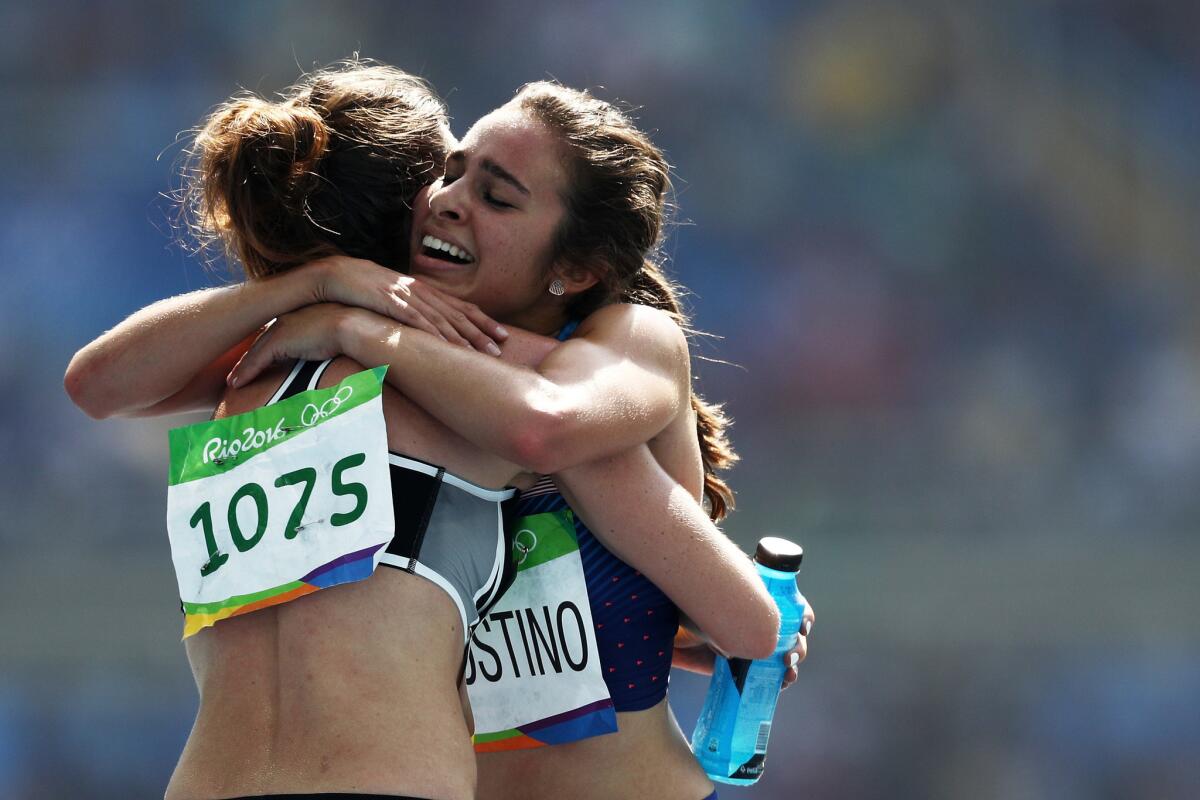
Distance runners Abbey D’Agostino of the U.S. and Nikki Hamblin of New Zealand weren’t favored to win medals in the women’s 5,000-meter event. But they deserve some special and public recognition for the sportsmanship they displayed toward one other after they collided during Tuesday’s first-round race.
D’Agostino, of Topsfield, Mass., collided with Hamblin about 3,200 meters into the race, possibly because Hamblin had slowed her pace to avoid contact with another runner who was being lapped. D’Agostino appeared to hit Hamblin from behind and both fell to the track.
D’Agostino got up but saw Hamblin was in distress and paused to help her up. They tried to continue, but D’Agostino was in pain because of injuries to her leg. “She could hardly stand,” Hamblin said.
Hamblin then helped her up, but D’Agostino couldn’t resume running and told Hamblin to go continue without her. Hamblin finished 16th in 16:43.10, and D’Agostino limped to the line in 17:10.02. Following a protest, both runners were advanced to Friday’s final, as was a third runner who was affected by the collision, Jennifer Wenth of Austria.
D’Agostino was taken off the track for treatment, but Hamblin lingered and spoke to reporters afterward to praise D’Agostino’s kindness.
“I went down, and I was like, ‘What’s happening? Why am I on the ground?’ ” Hamblin said. “Then suddenly, there’s this hand on my shoulder [and D’Agostino saying], ‘Get up, get up, we have to finish this.’ And I’m like, ‘Yup, yup, you’re right. This is the Olympic Games. We have to finish this.’
“I’m so grateful for Abbey for doing that for me. That girl is the Olympic spirit right there. I’ve never met her before. I’ve never met this girl before, and isn’t that just so amazing? Regardless of the race and the result on the board, that’s a moment that you’re never, ever going to forget for the rest of your life, that girl shaking my shoulder like, ‘Come on, get up.’ ”
No matter what happens in the final, they’re big winners here.
- Share via
These gold medalists will challenge your idea of ‘normal’
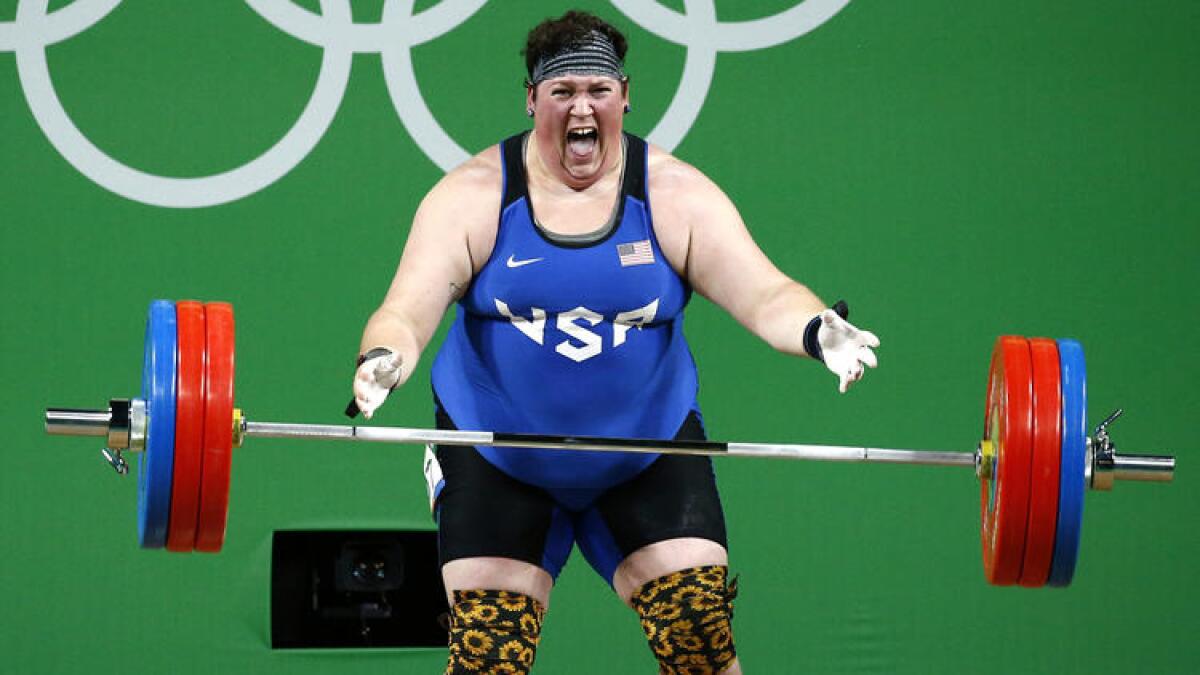
I didn’t have to conform my body or my ideals or my looks to get where I am. I have a bronze medal and I was able to be myself, embrace my body, do the things I’m naturally fitted to do to help make my dreams come true.
— Sarah Robles, U.S. champion weightlifter
The strongest woman in America holds a plastic fork against her forehead.
She wrinkles her brow and the fork folds into a crease. She smiles and holds out her hands — ta-da! — as the fork remains literally stuck inside her head.
“I have a huge forehead wrinkle,” says Sarah Robles with a laugh. “This is real life.”
The strongest woman in America loves her forehead. She loves the female weightlifter tattoo on her right biceps. She loves that she can lift major appliances while wearing a fancy black striped headband, flowery kneepads and shiny earrings.
She’s 5-10, 315 pounds and she loves every inch of herself. She loves the independence that comes from her size, and the power that comes from strength, which earned her an Olympic bronze medal earlier this week in the super-heavyweight division. It was America’s first weightlifting medal of any sort in 16 years.
- Share via
This winning combination is more than gymnast and coach
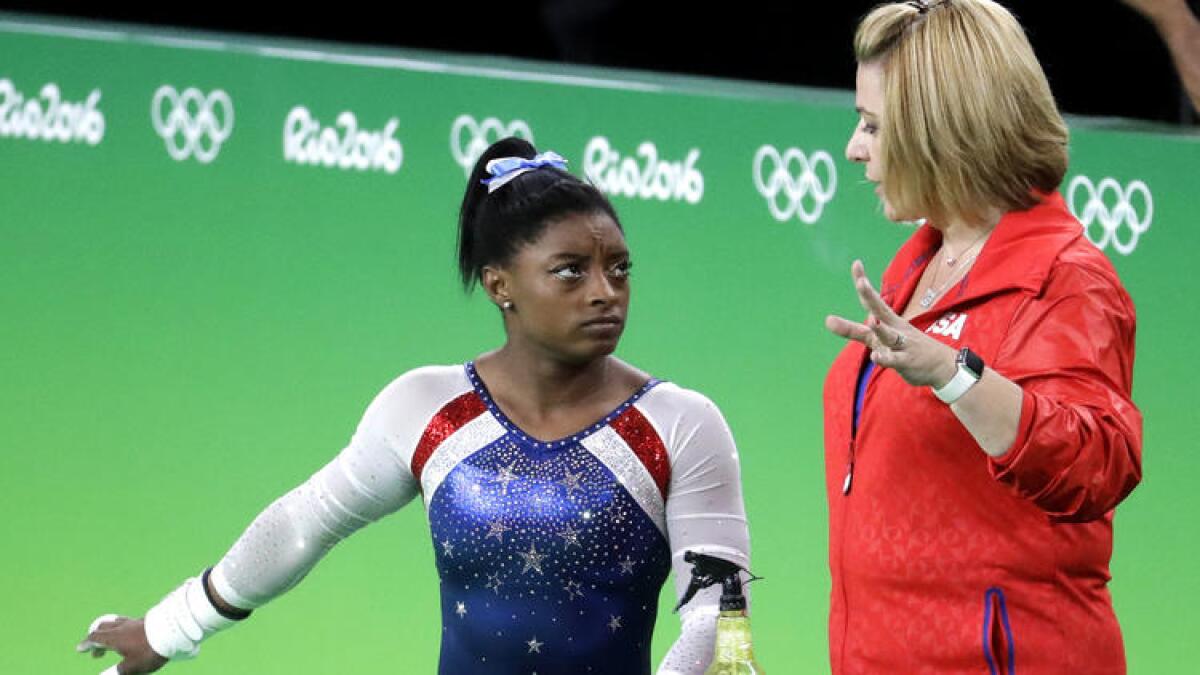
When I first saw her, I was like, ‘Wow, this kid has something.’ But what it was and how far she could go with it, I had no idea.
— Aimee Boorman, Simone Biles’ personal coach
The day before the women’s gymnastics team final, a Twitter user suggested Simone Biles and her coach Aimee Boorman were their sport’s equivalent to Walter Payton and Mike Ditka.
“Sounds about right,” Payton’s son, Jarrett, chimed in on Twitter.
Never mind that the Chicago-born Boorman doesn’t smoke cigars, has never thrown a wad of chewing gun at a spectator and is the antithesis of abrasive. She loved Payton’s affirmation.
She has also grown rather fond of these Olympic Games, where her student has picked up golds in team, all-around and vault. Monday, she took home the bronze in the balance beam.